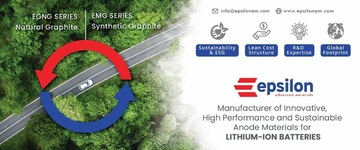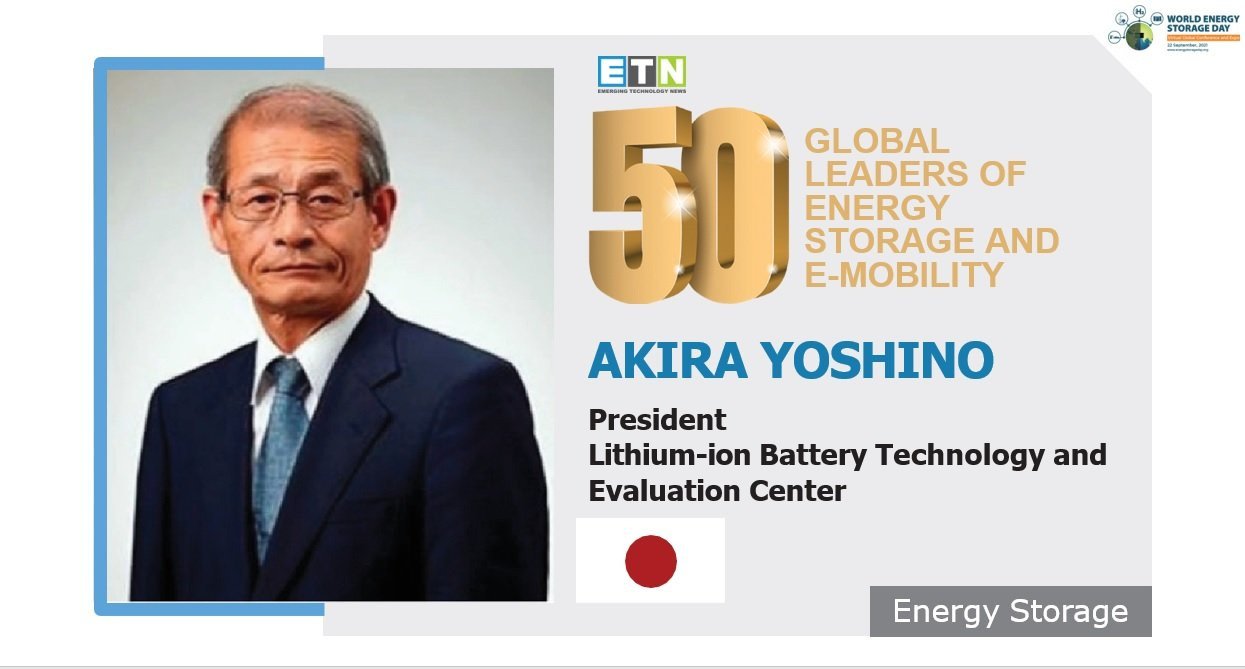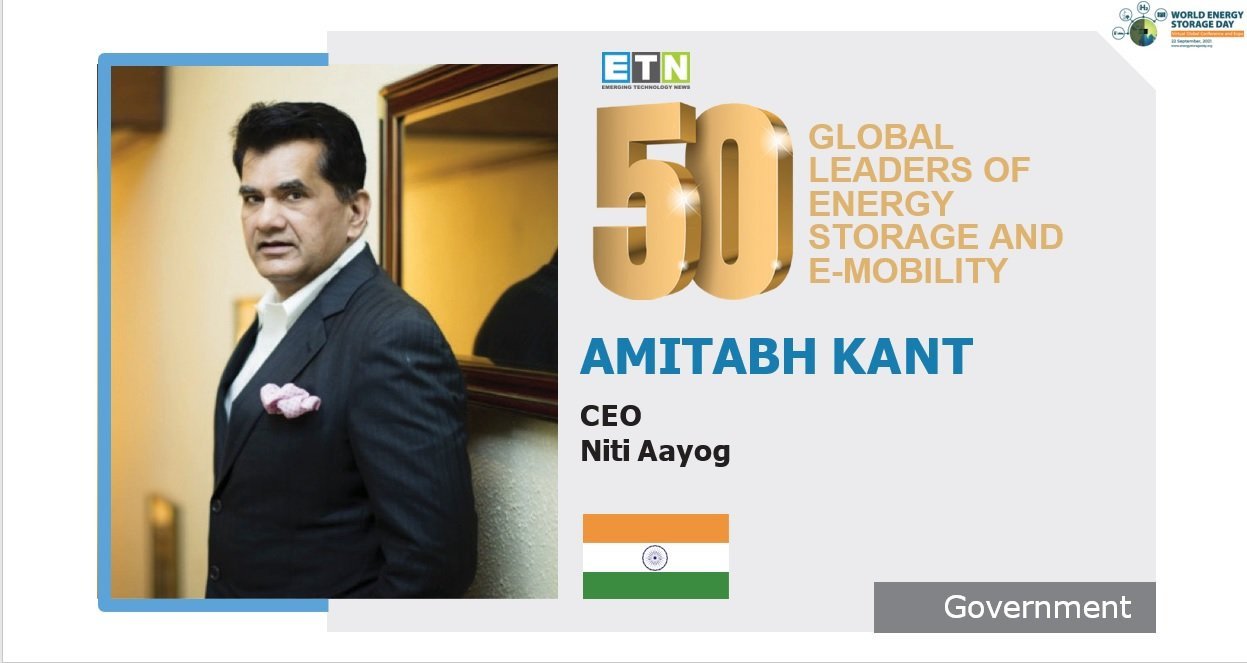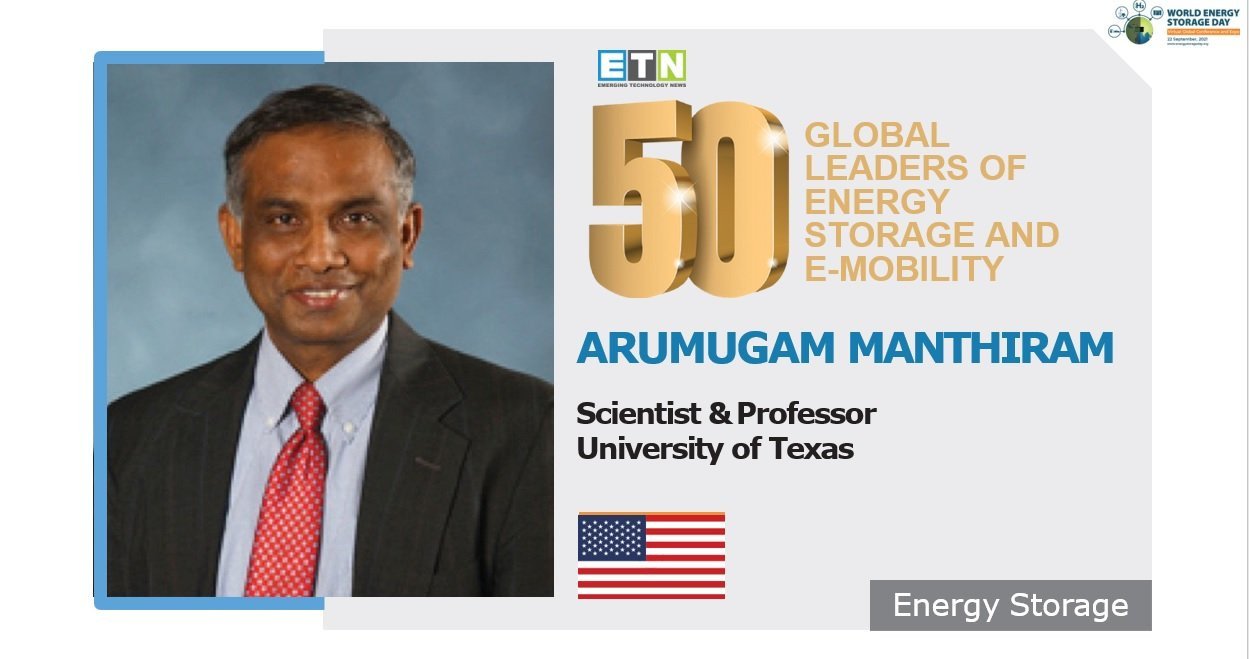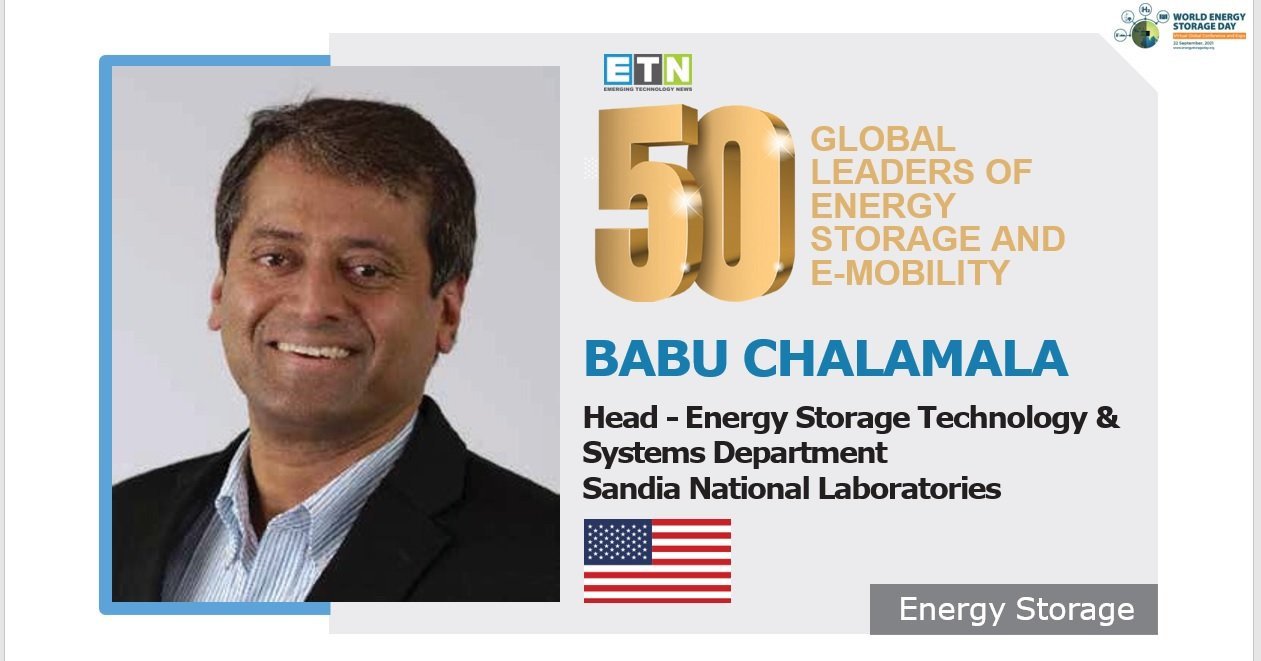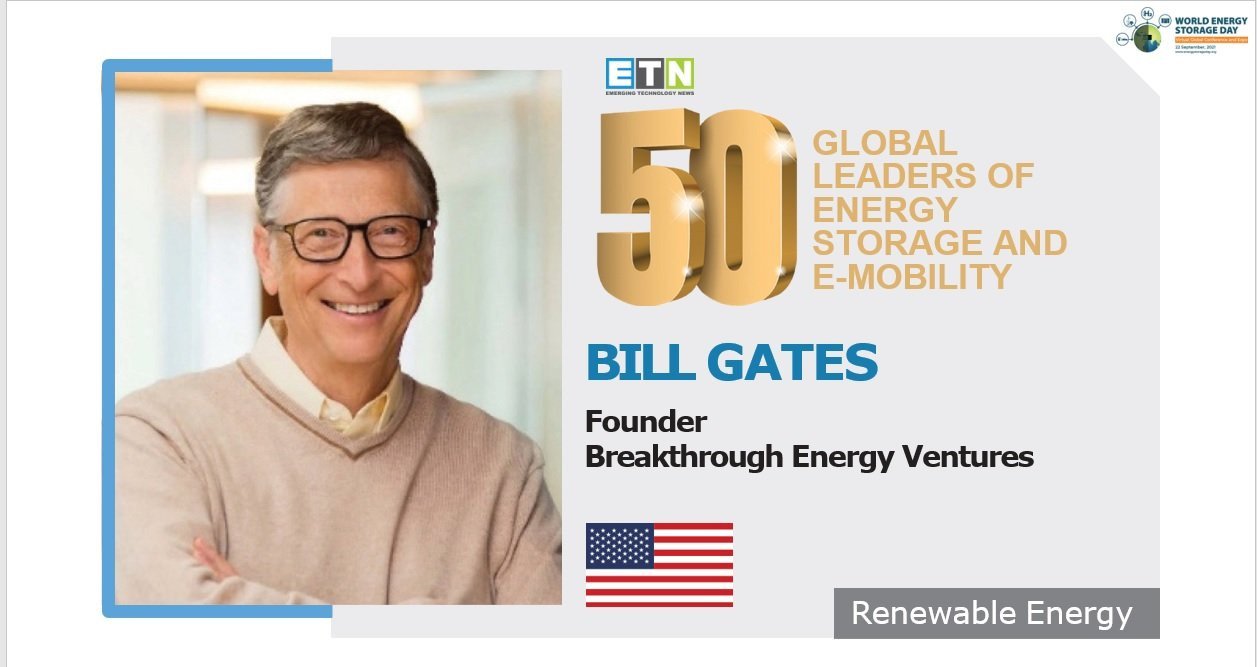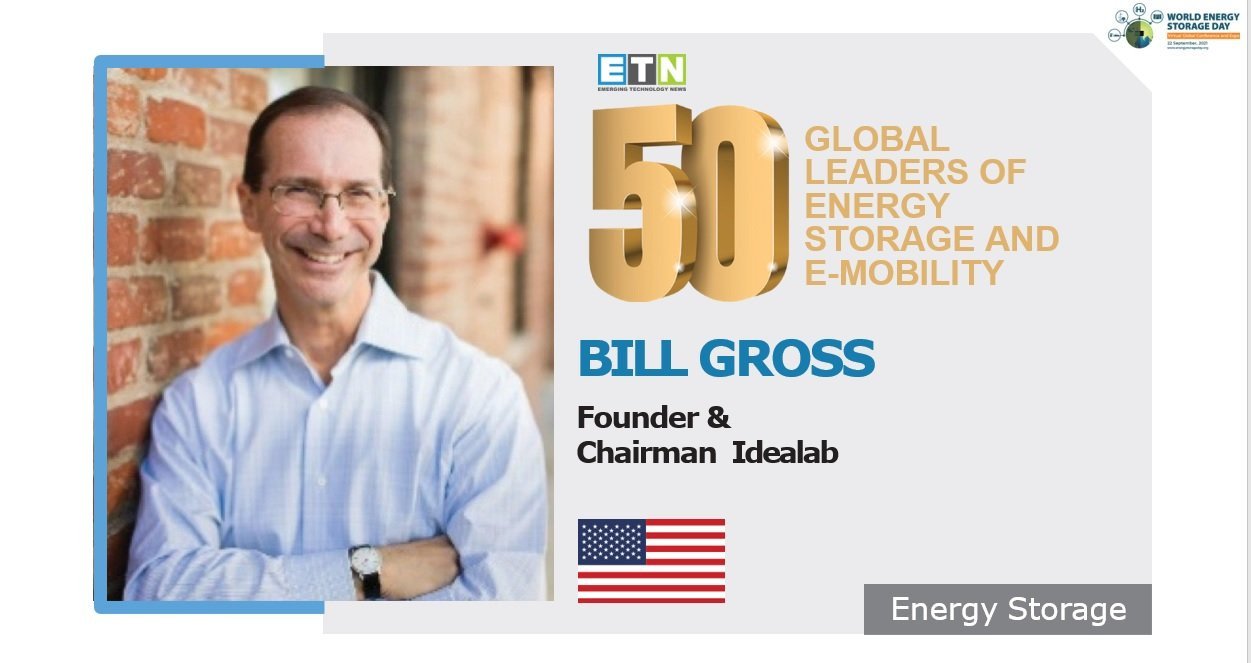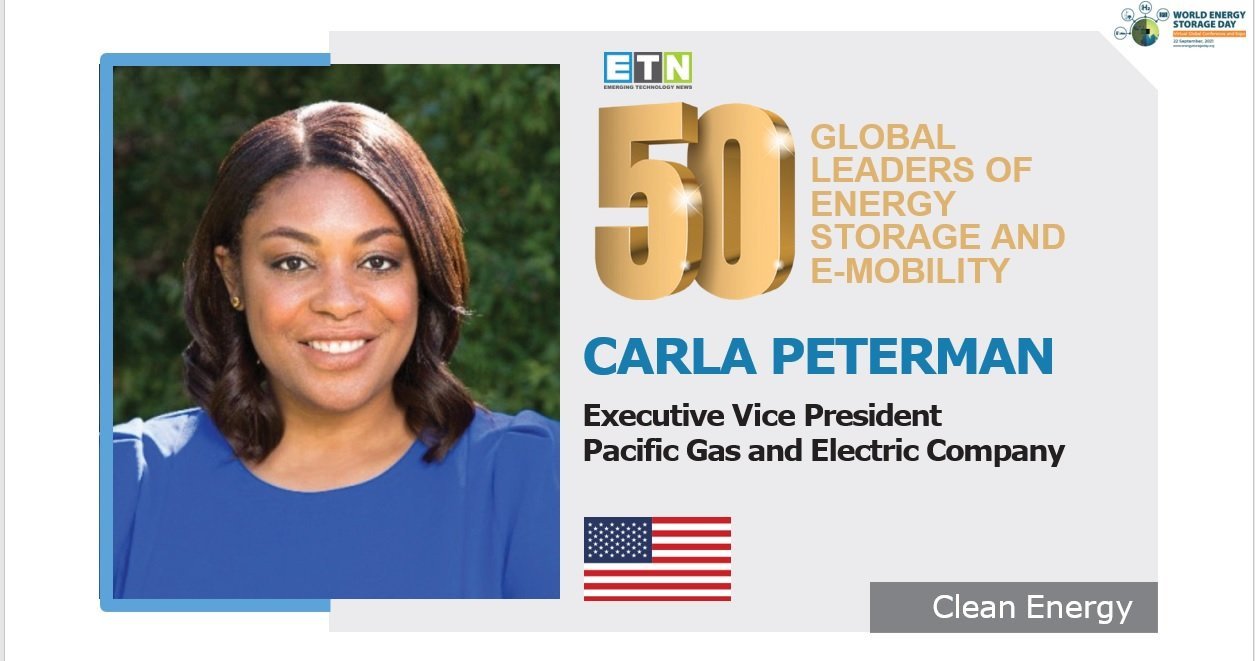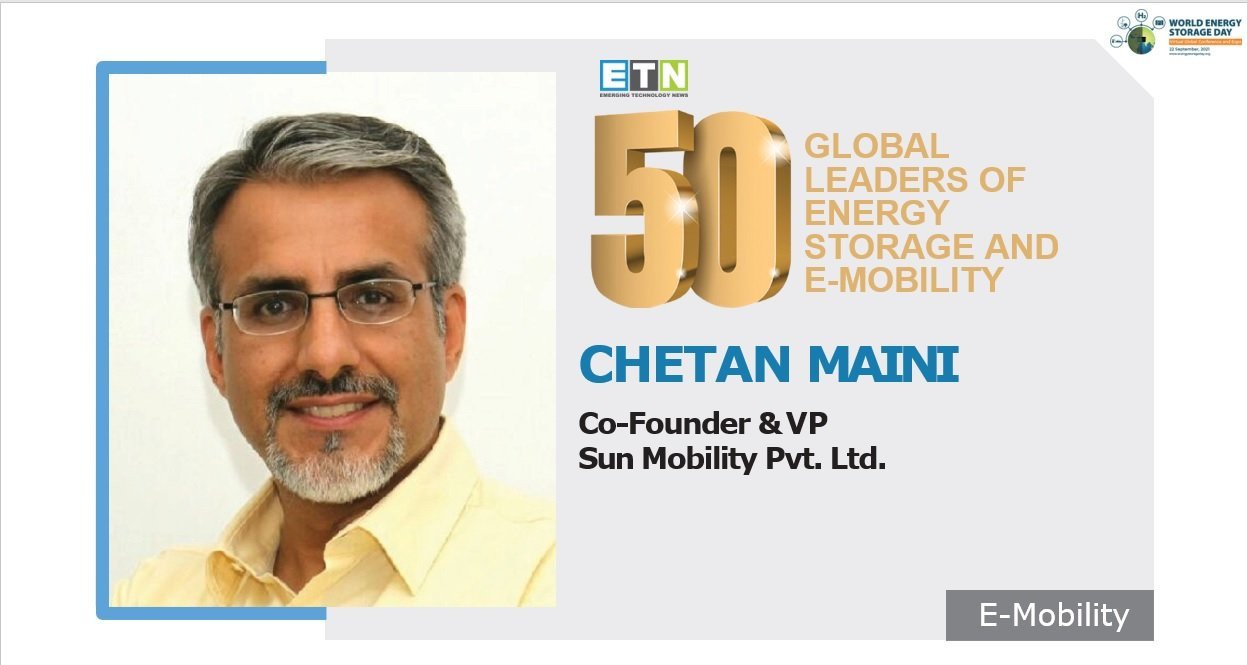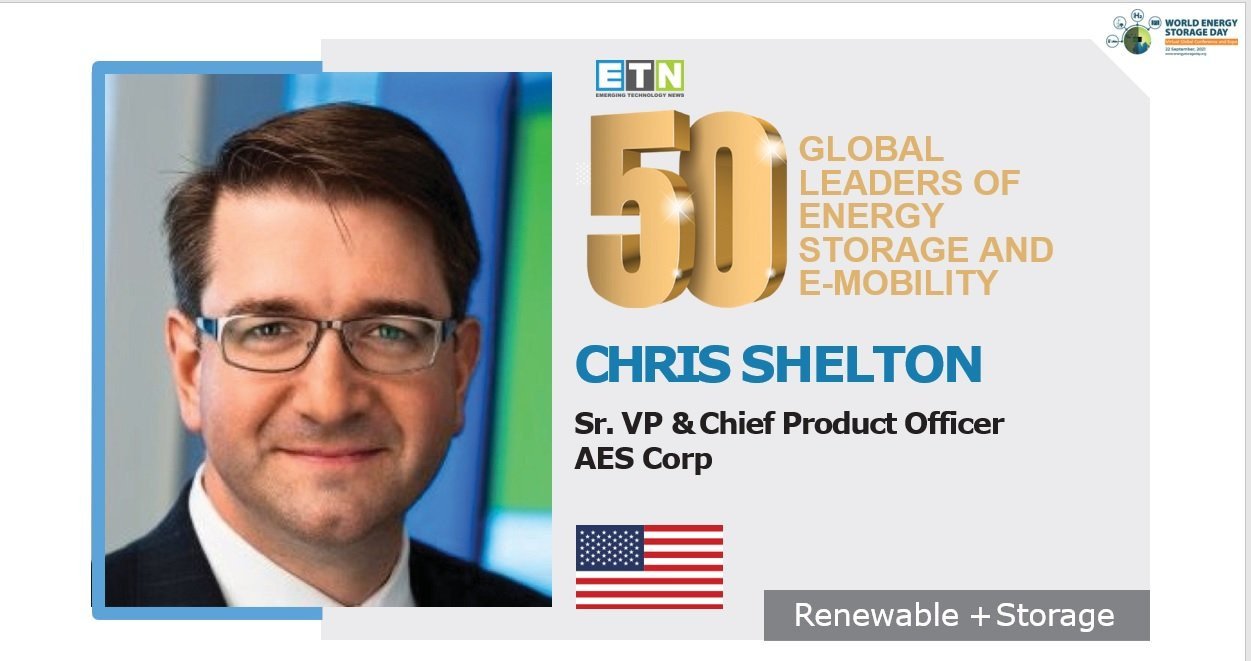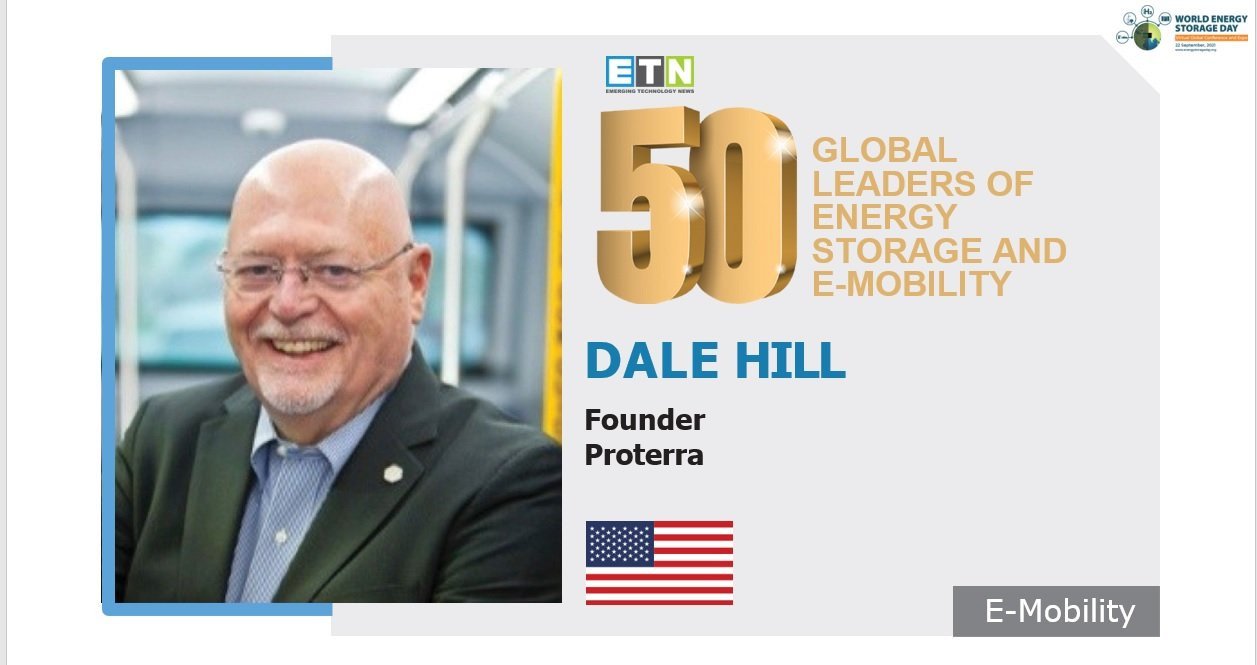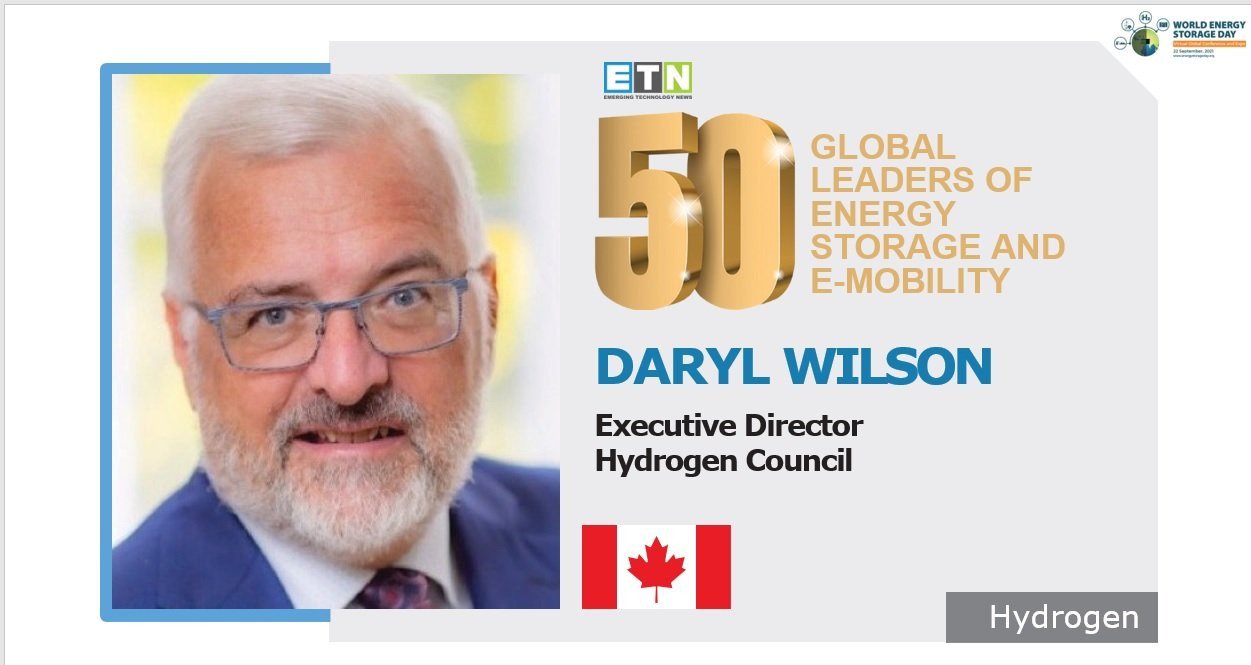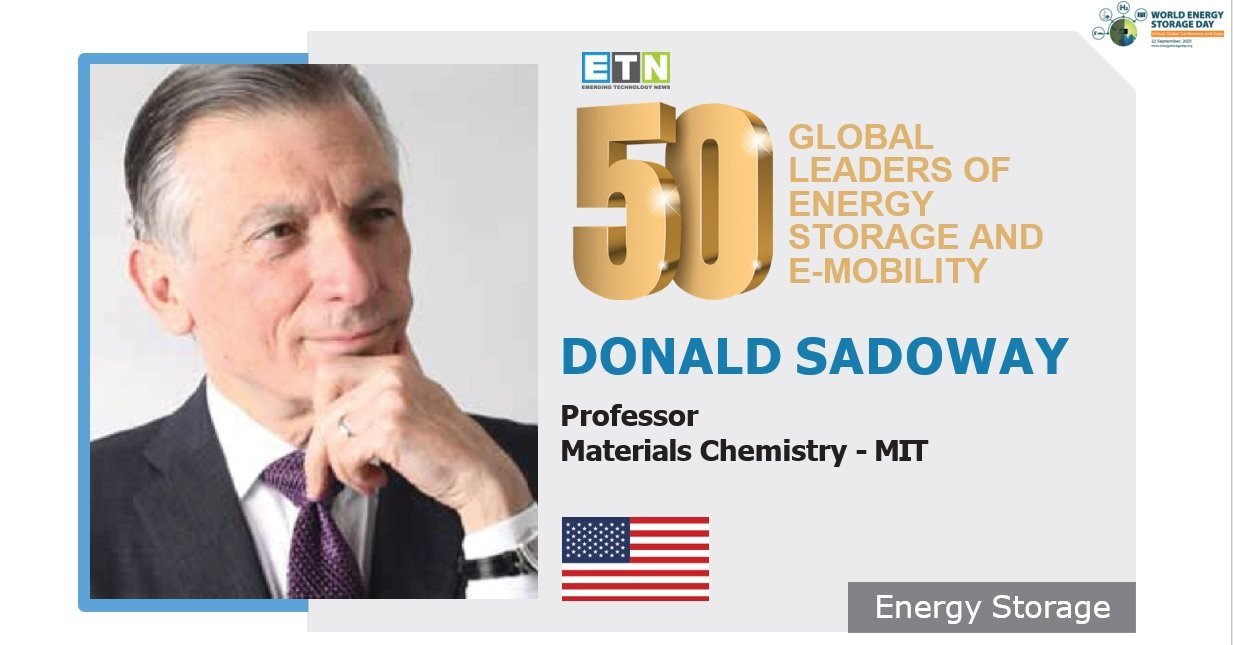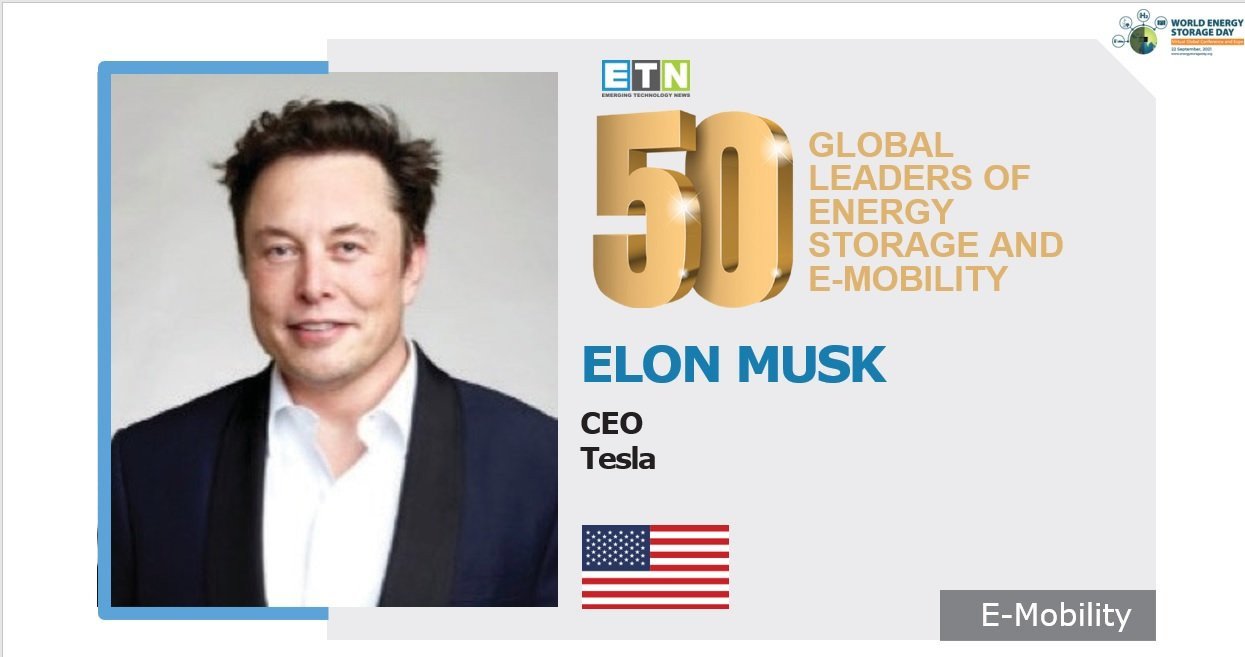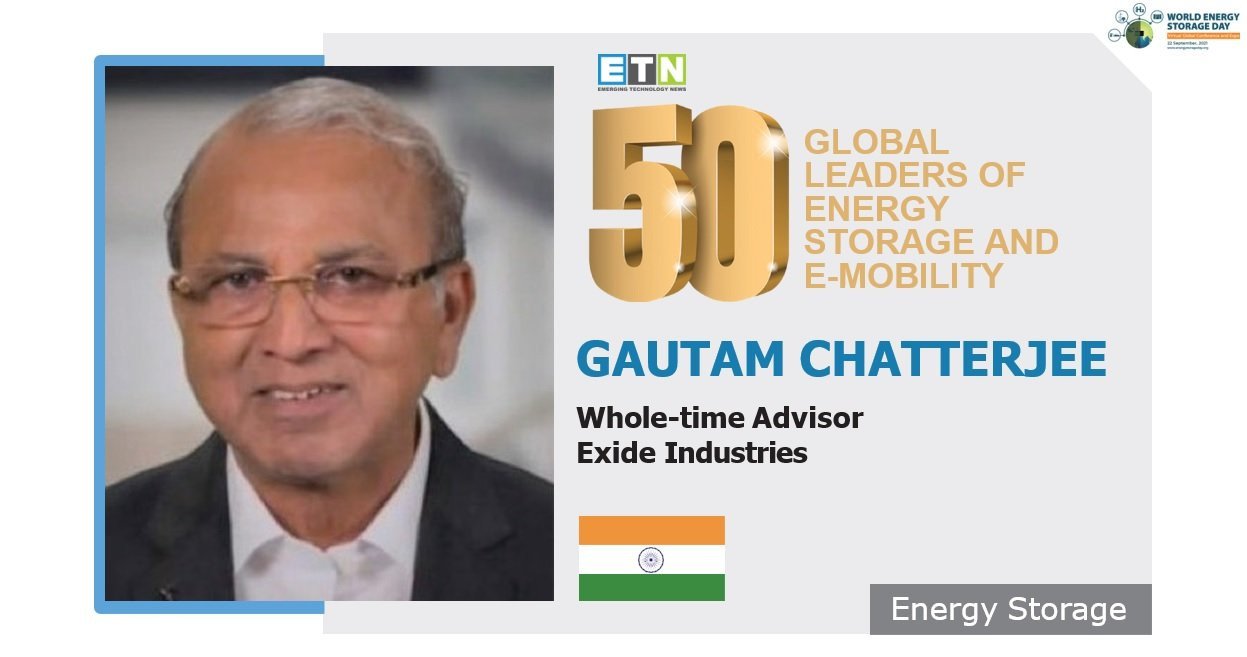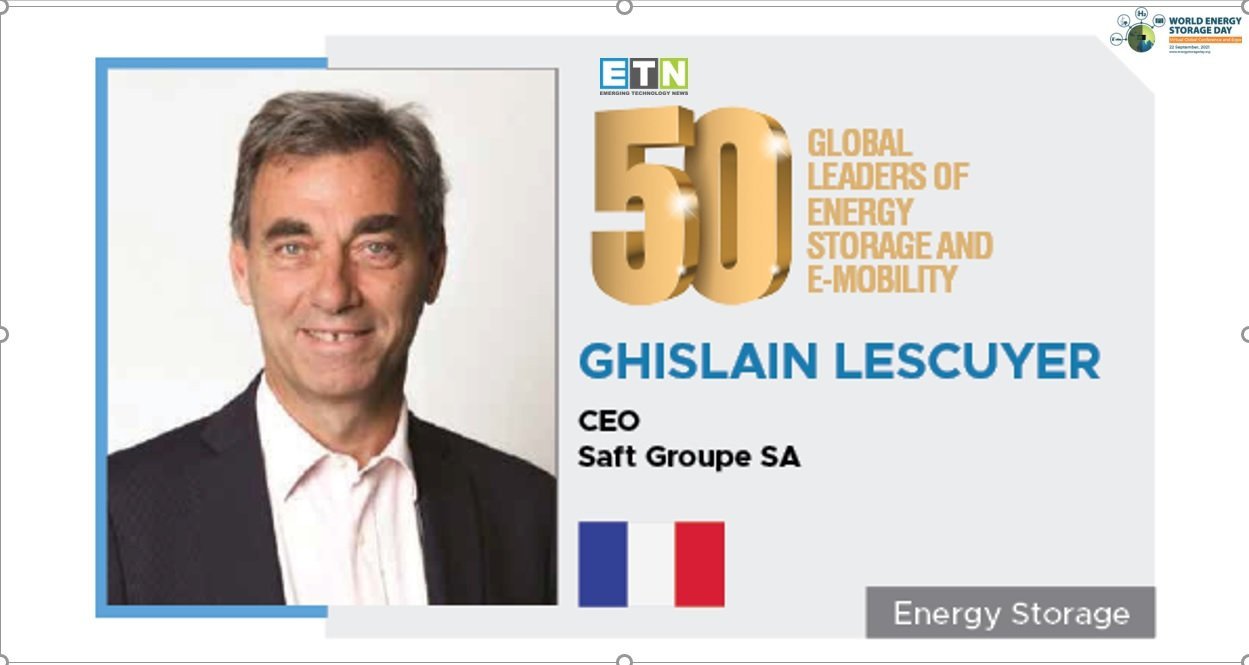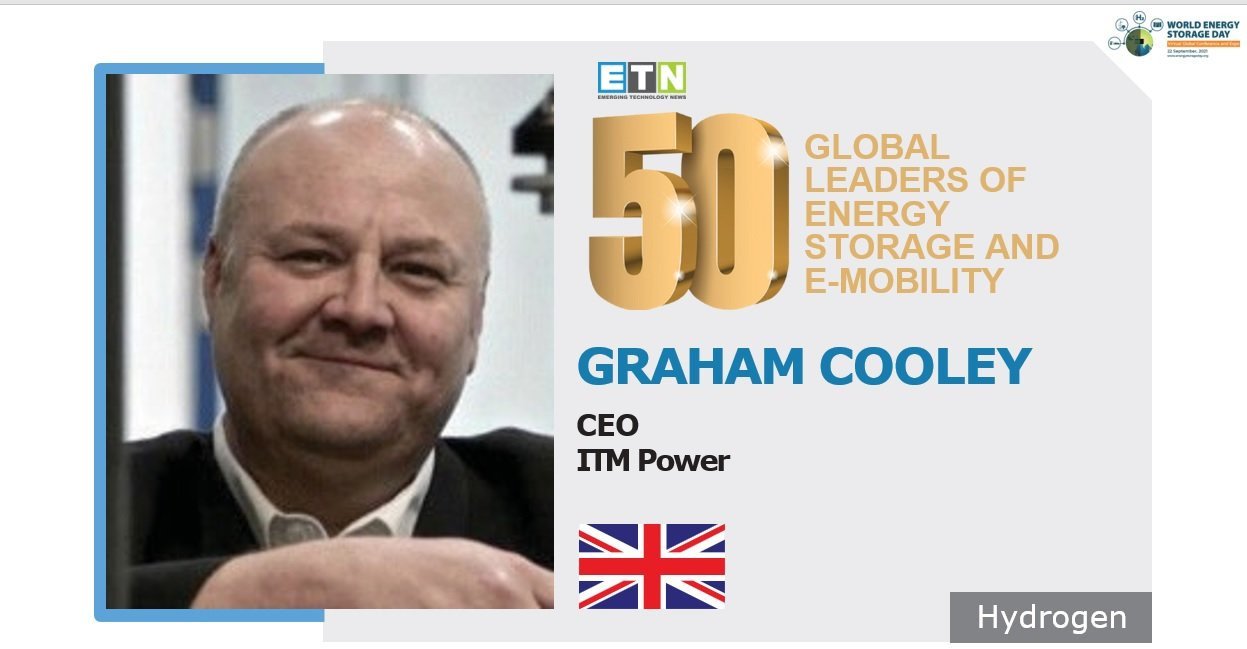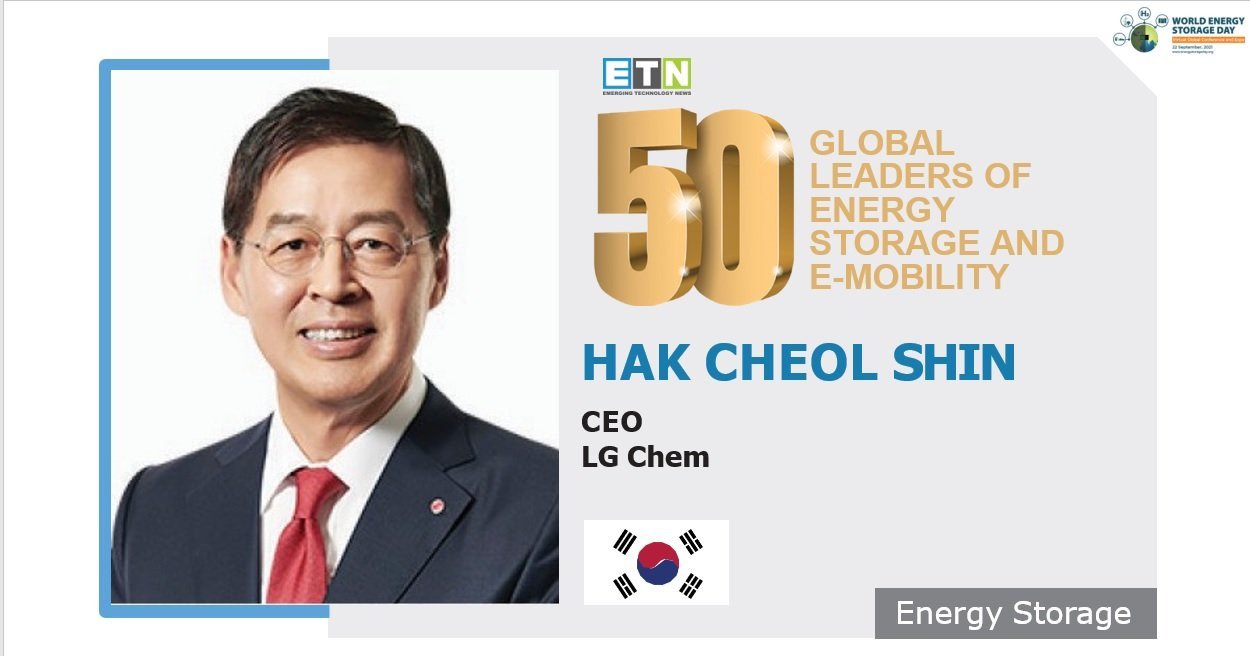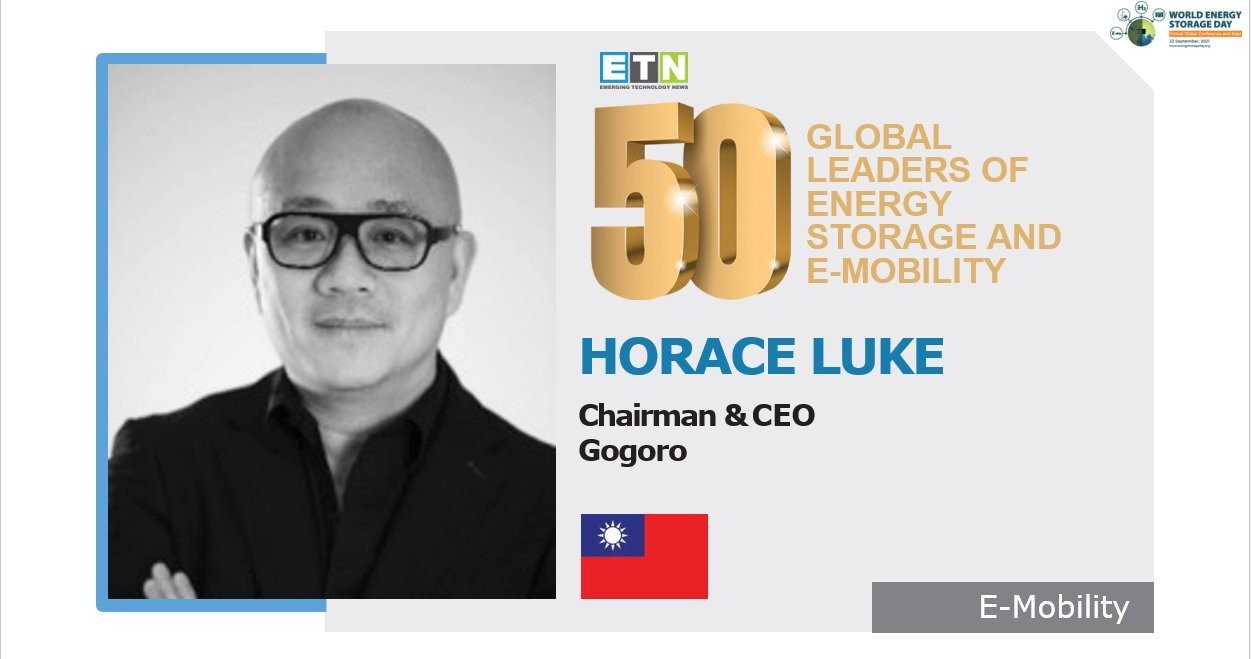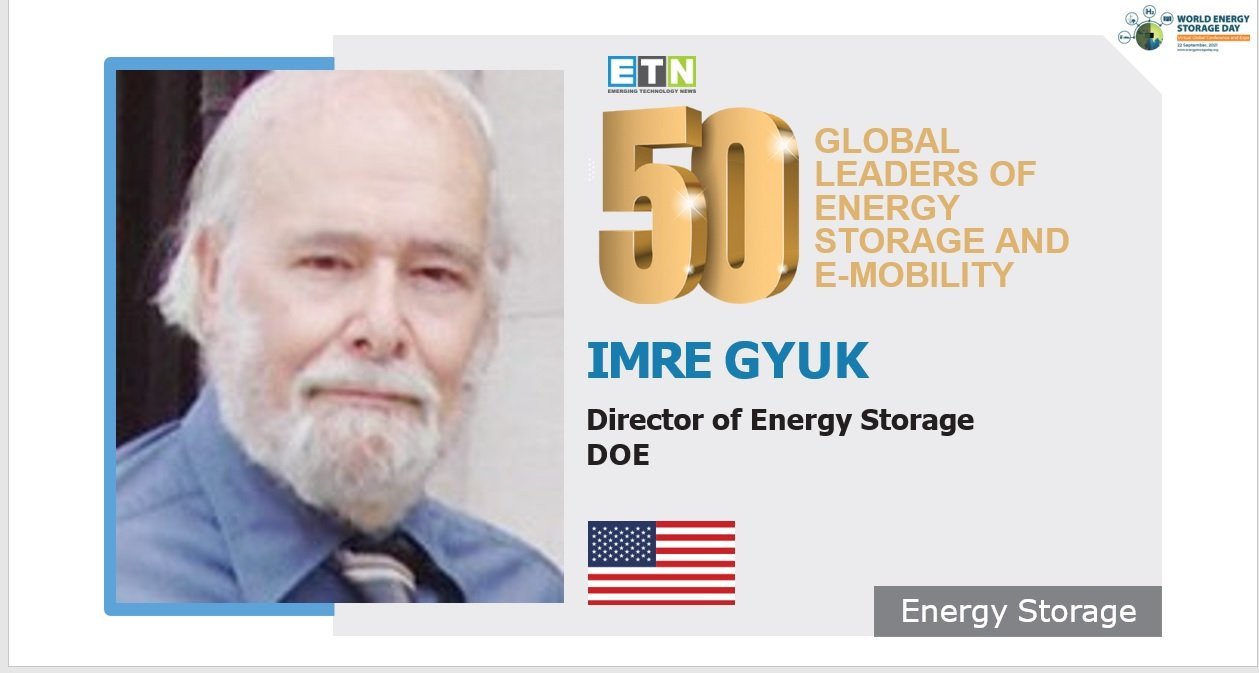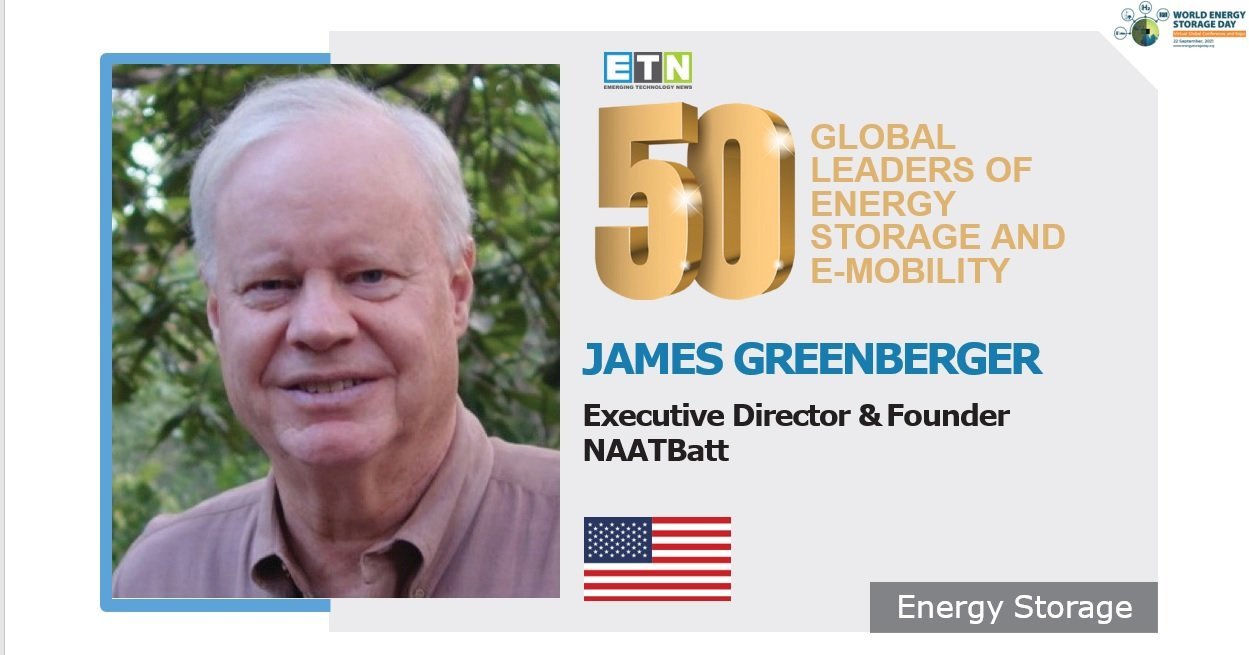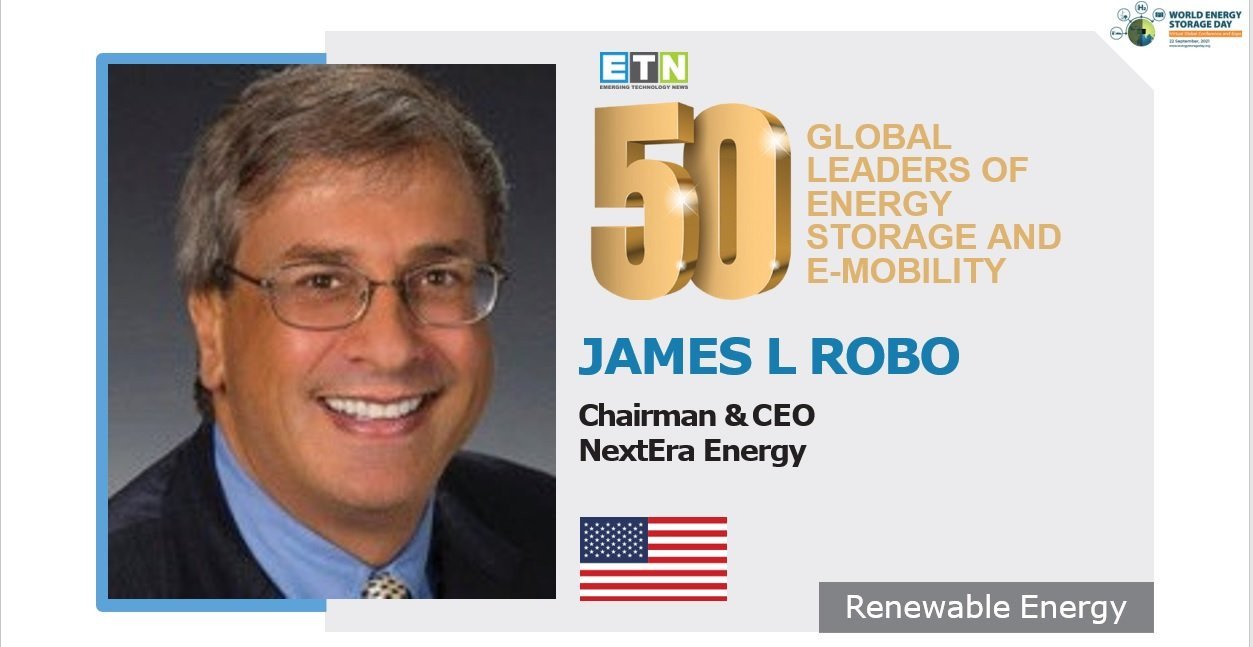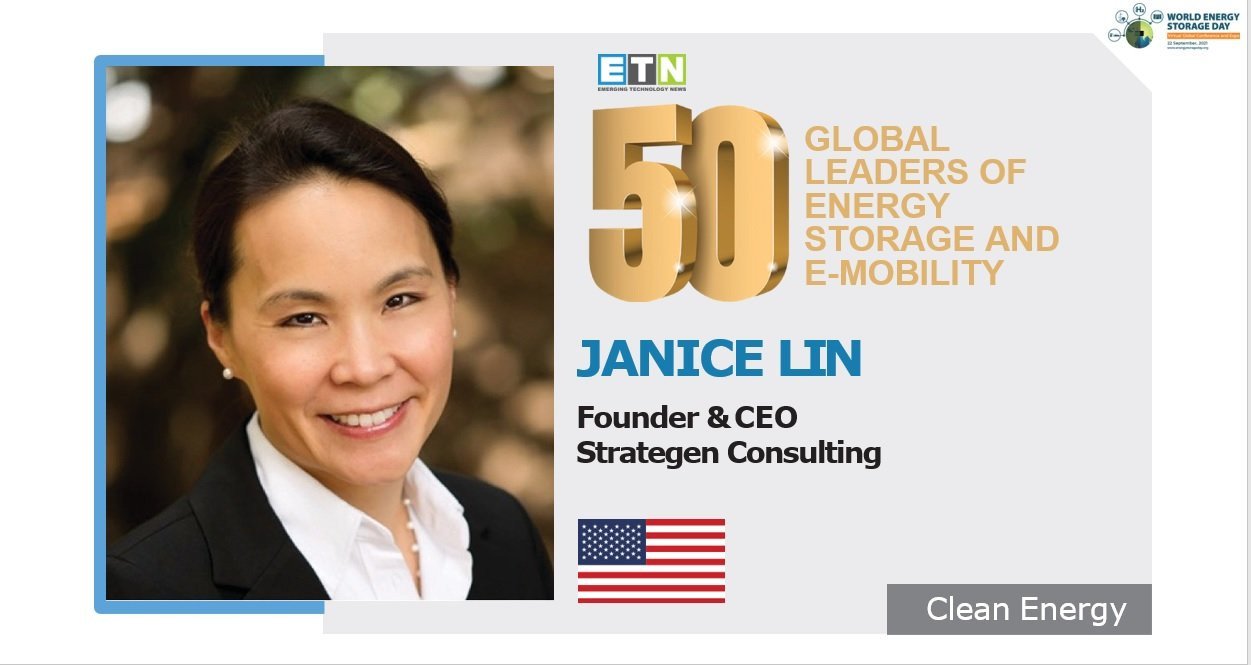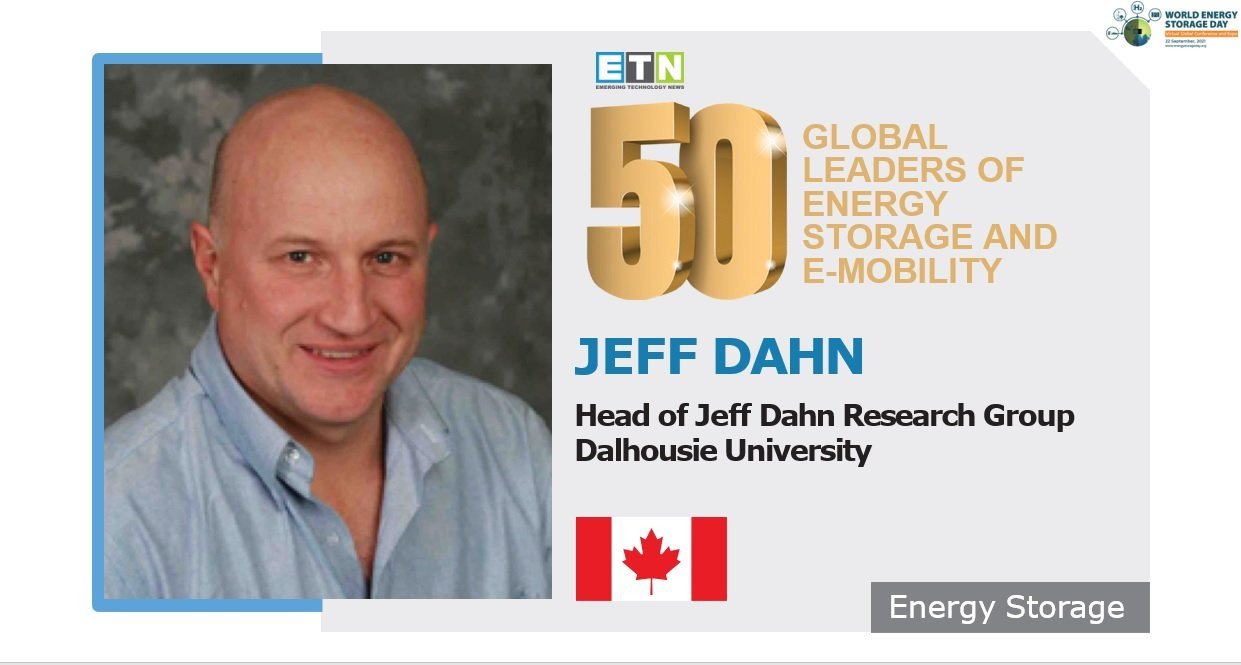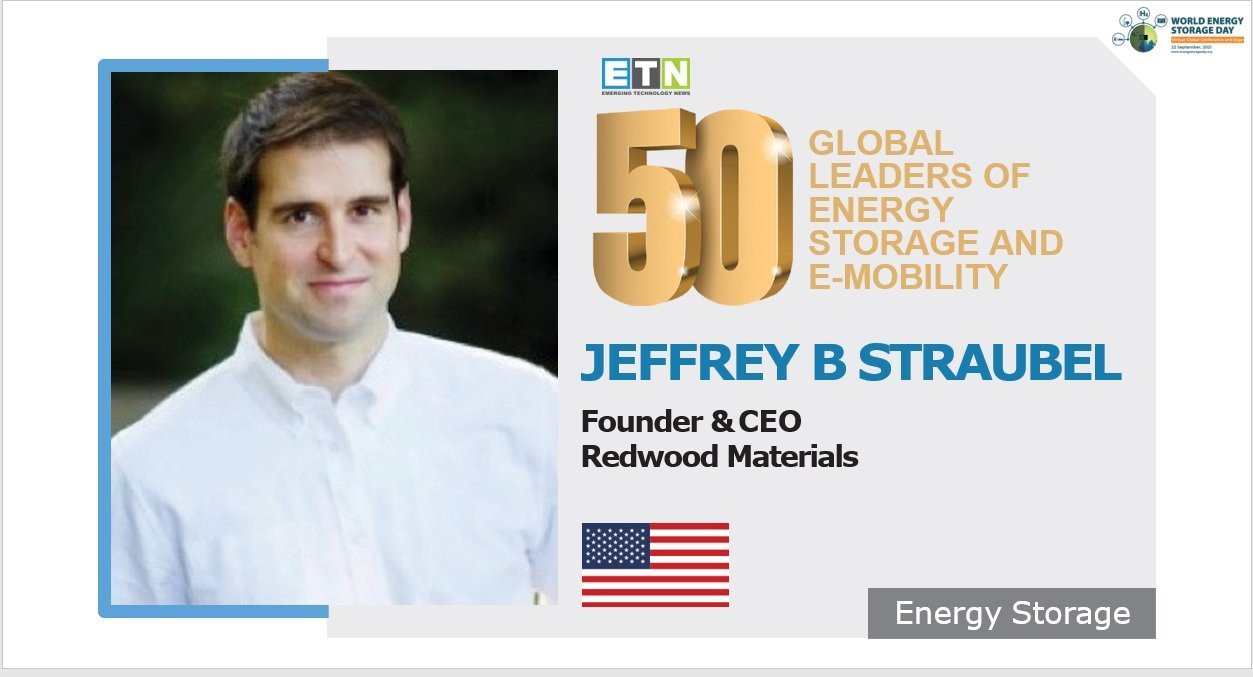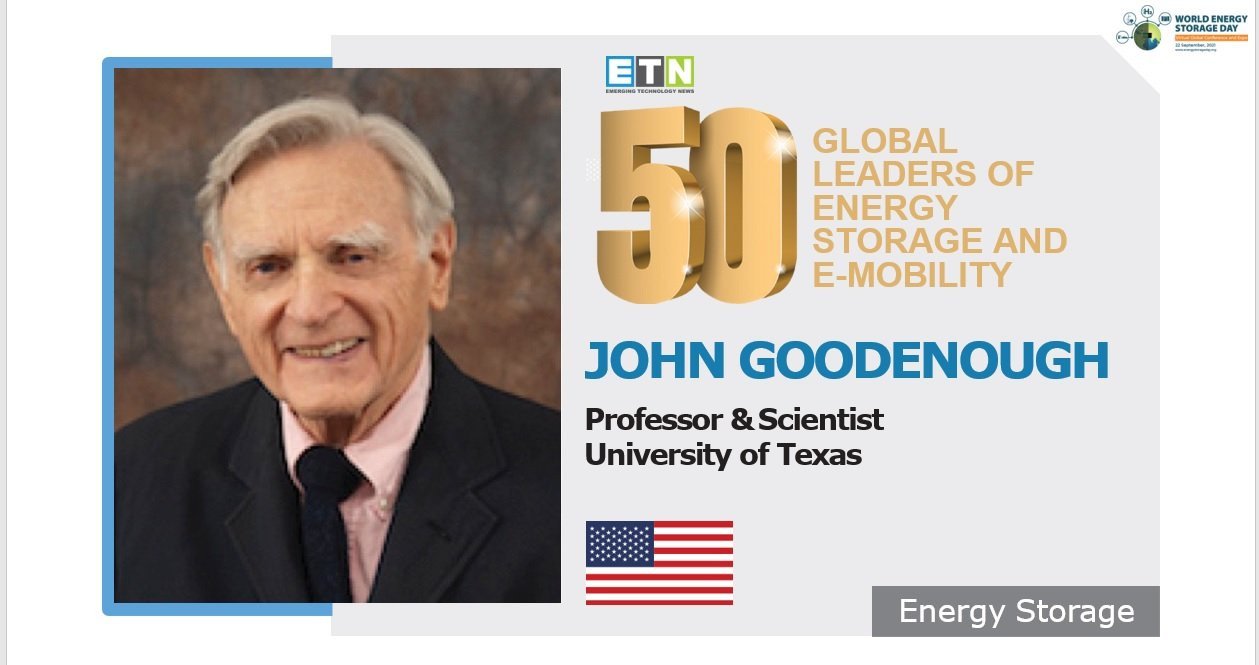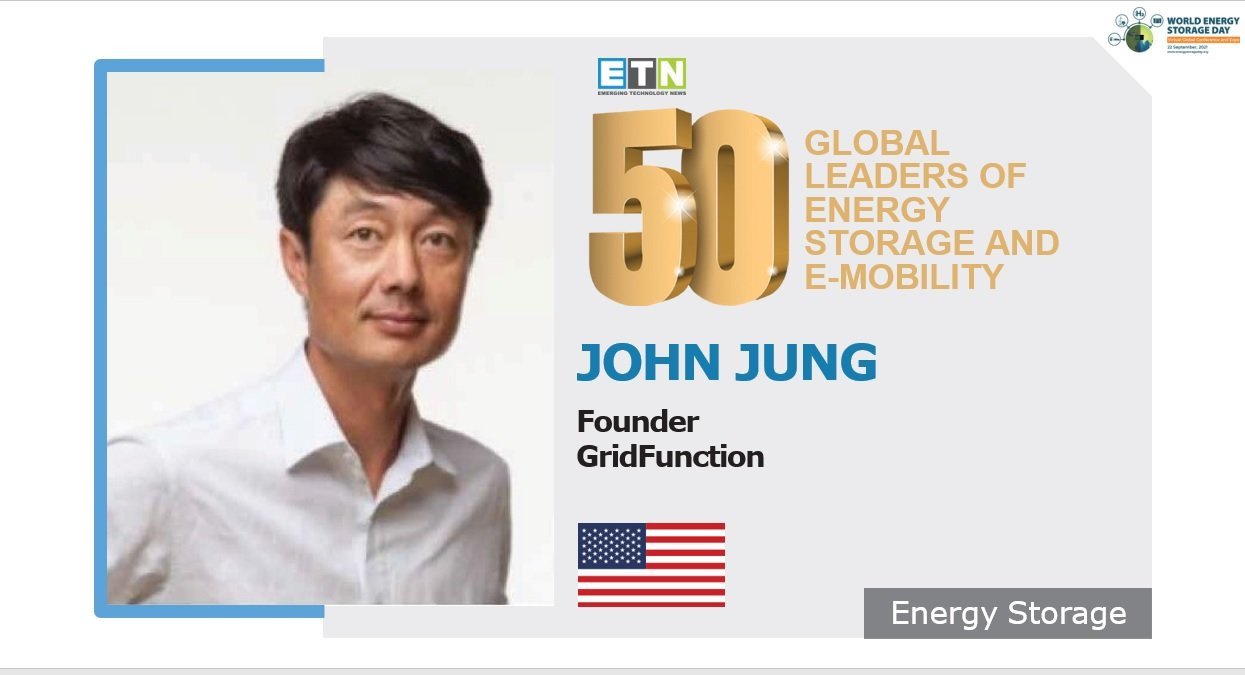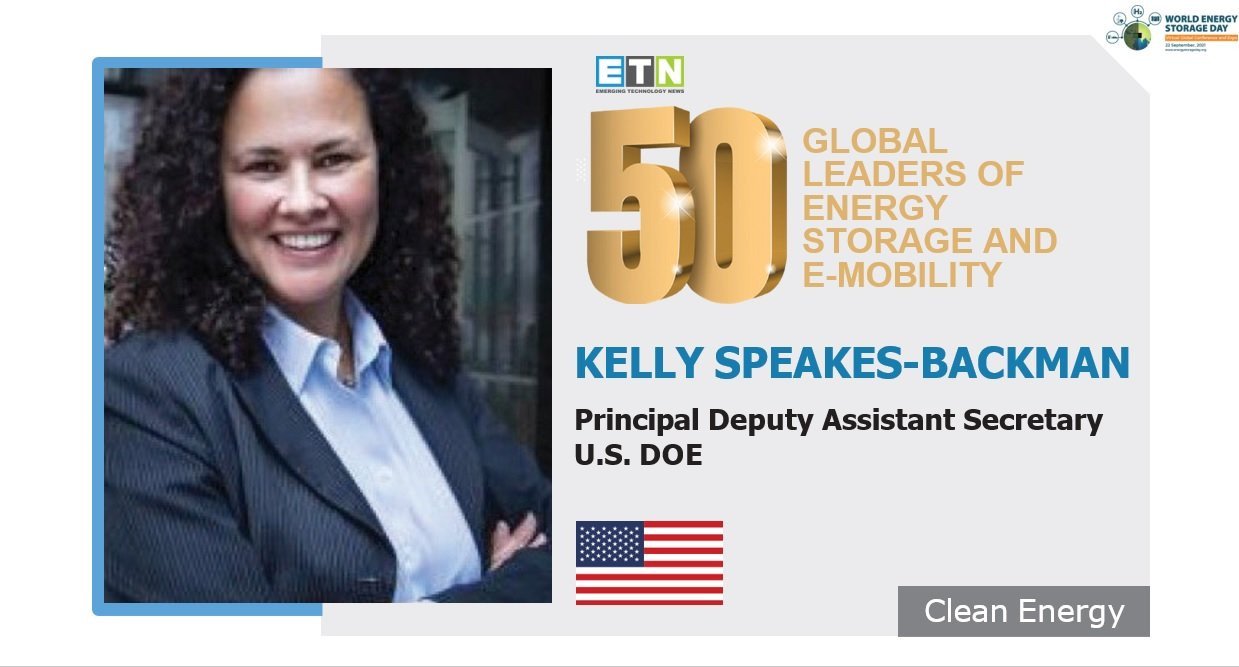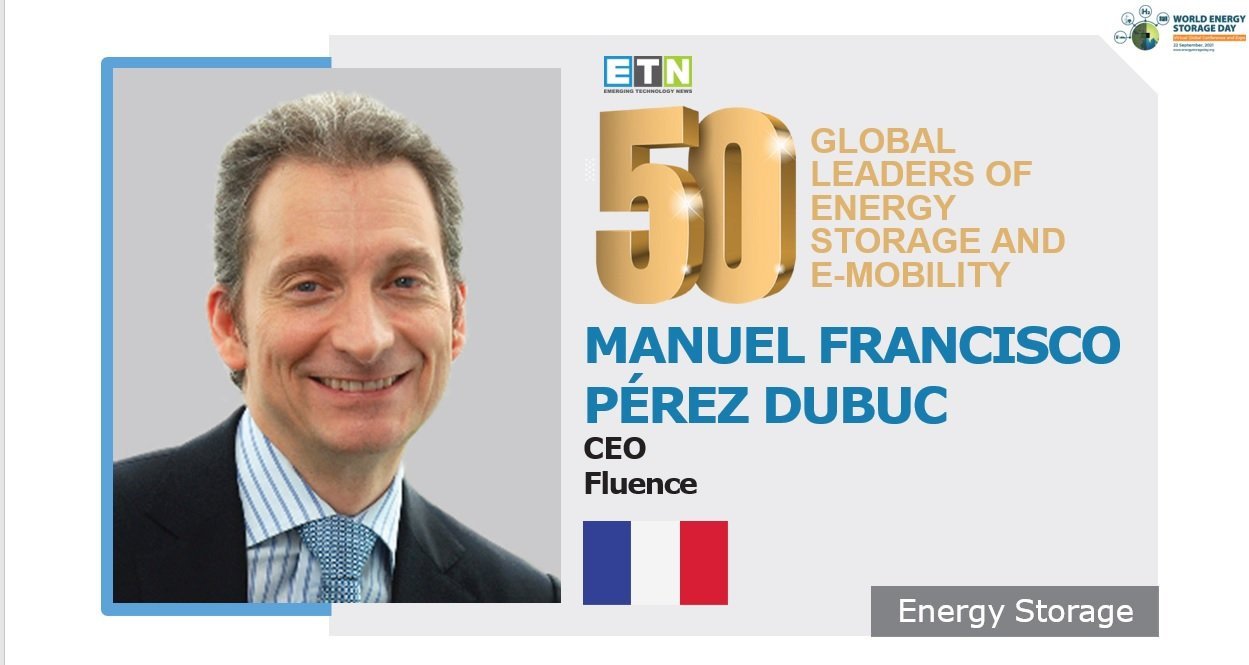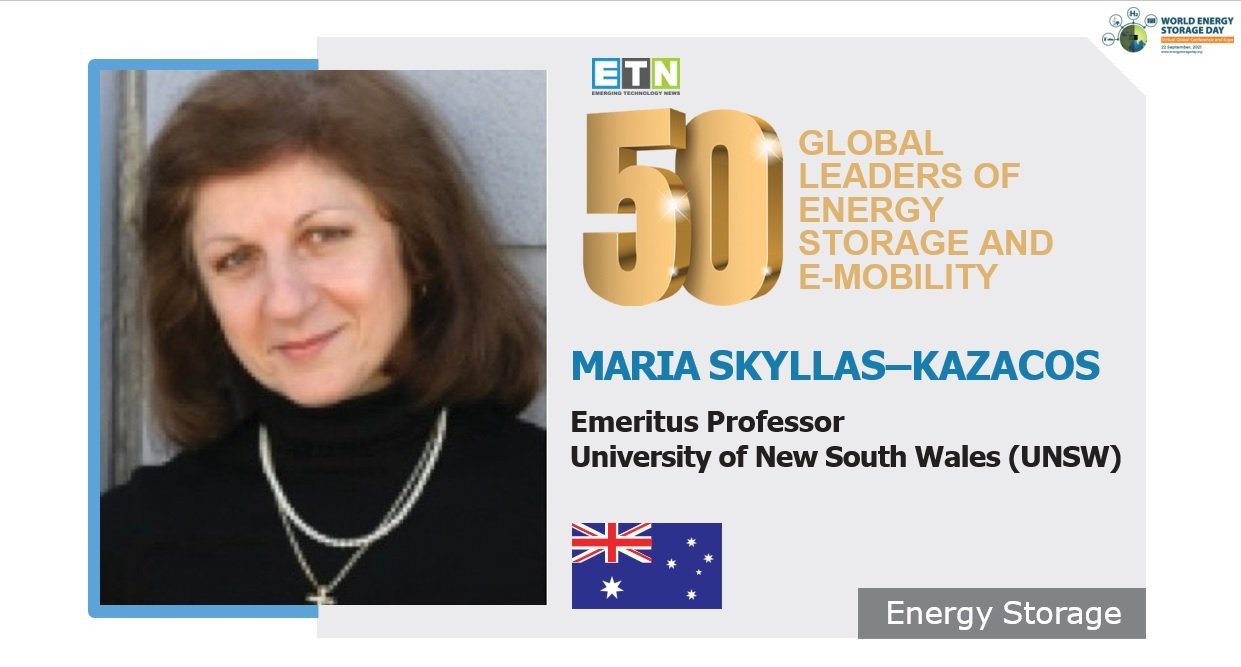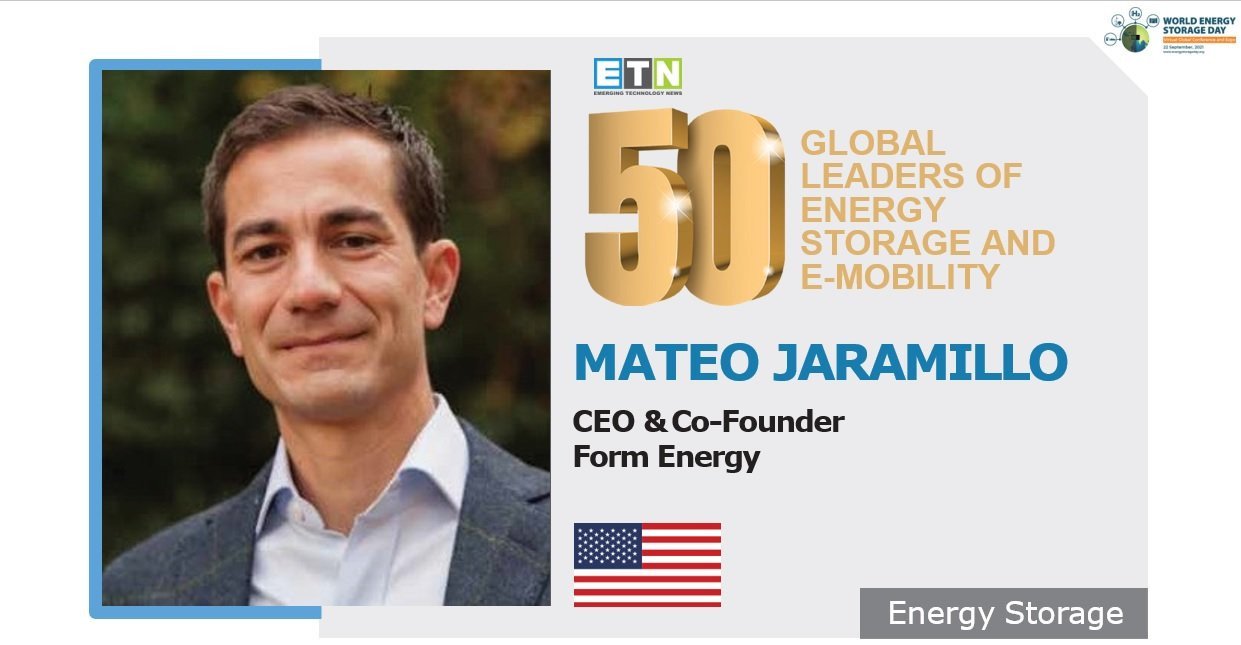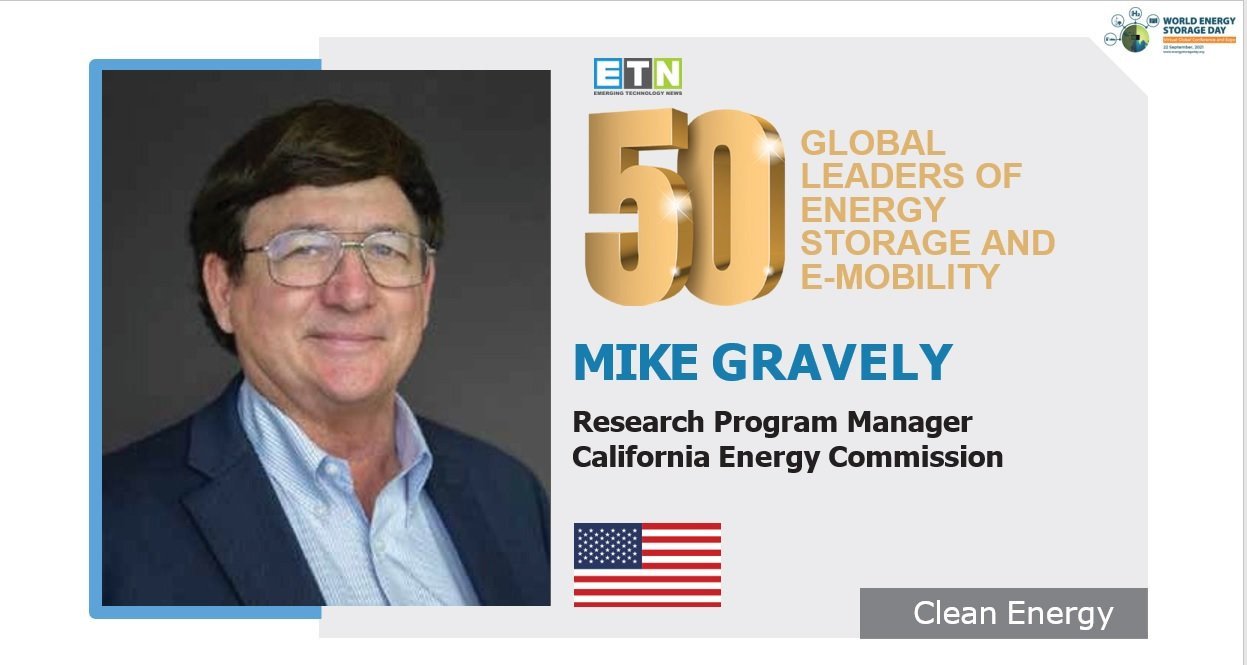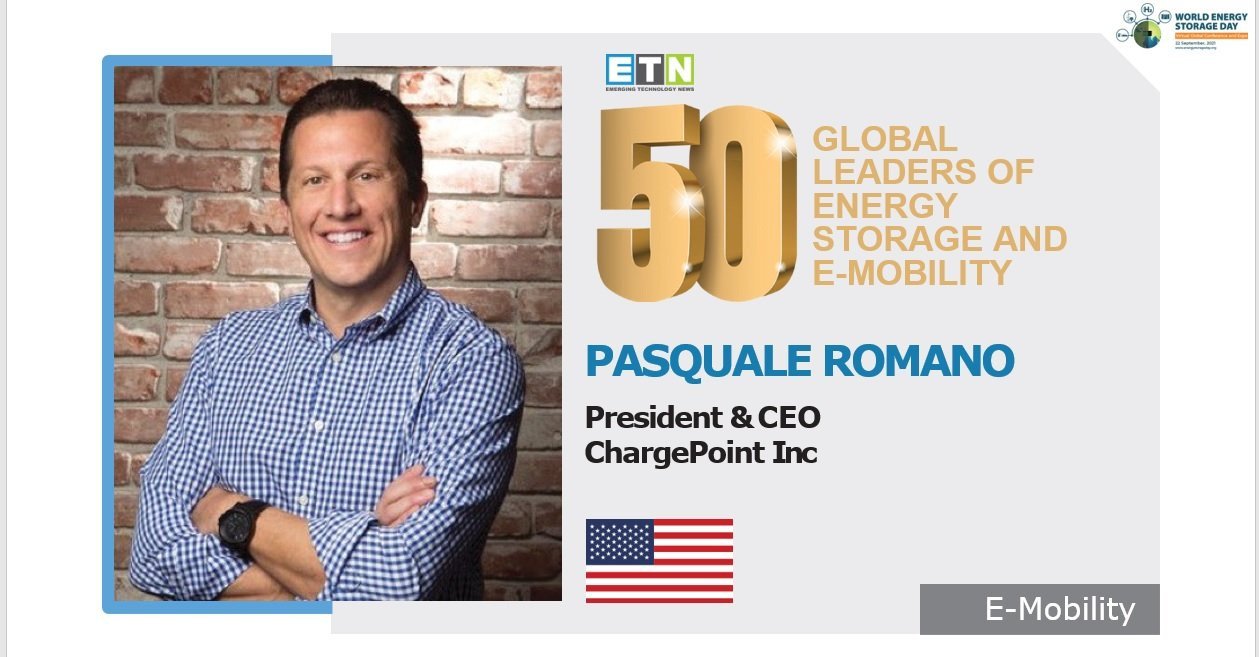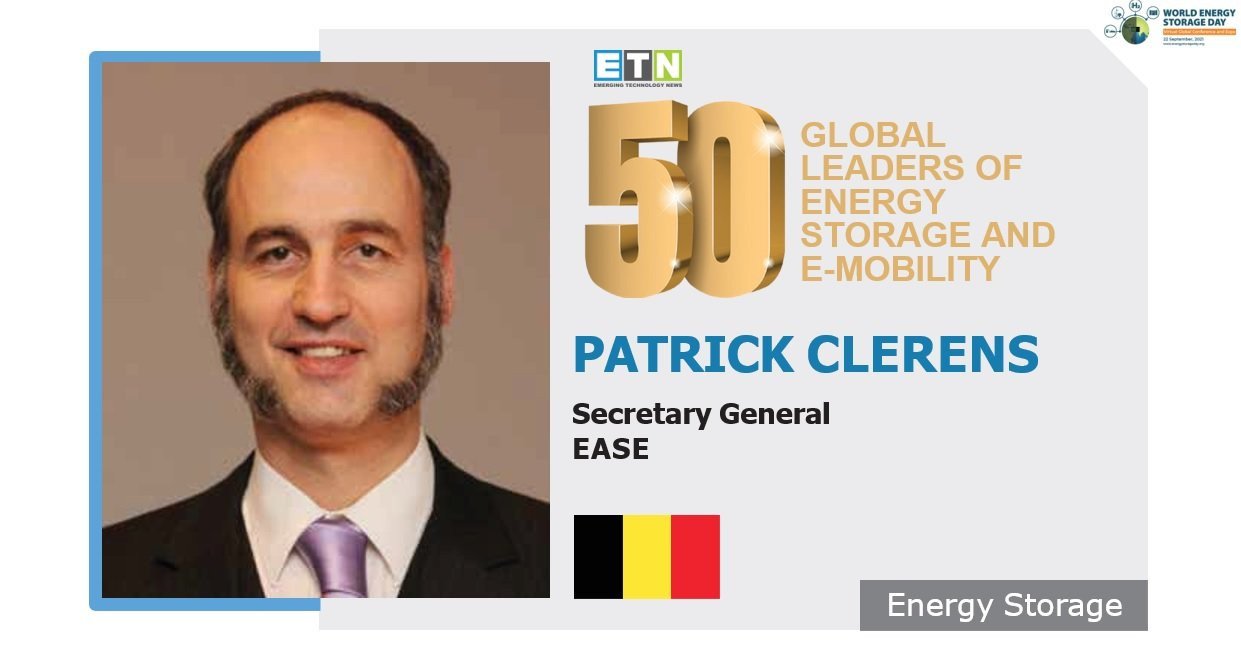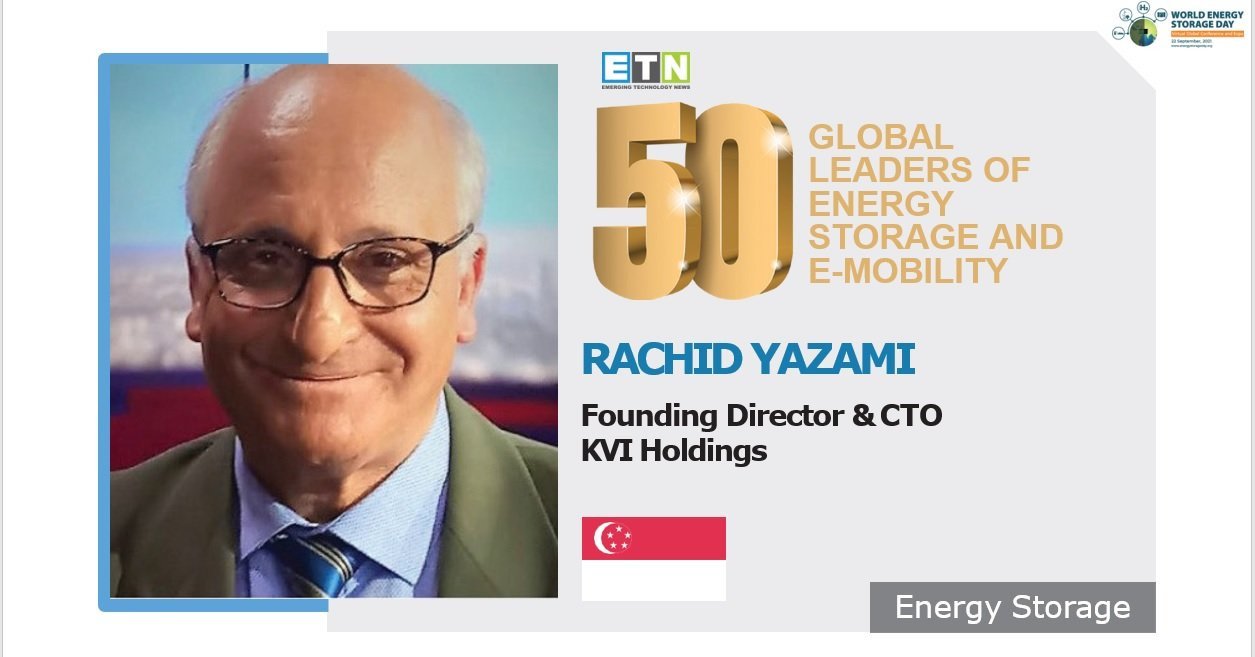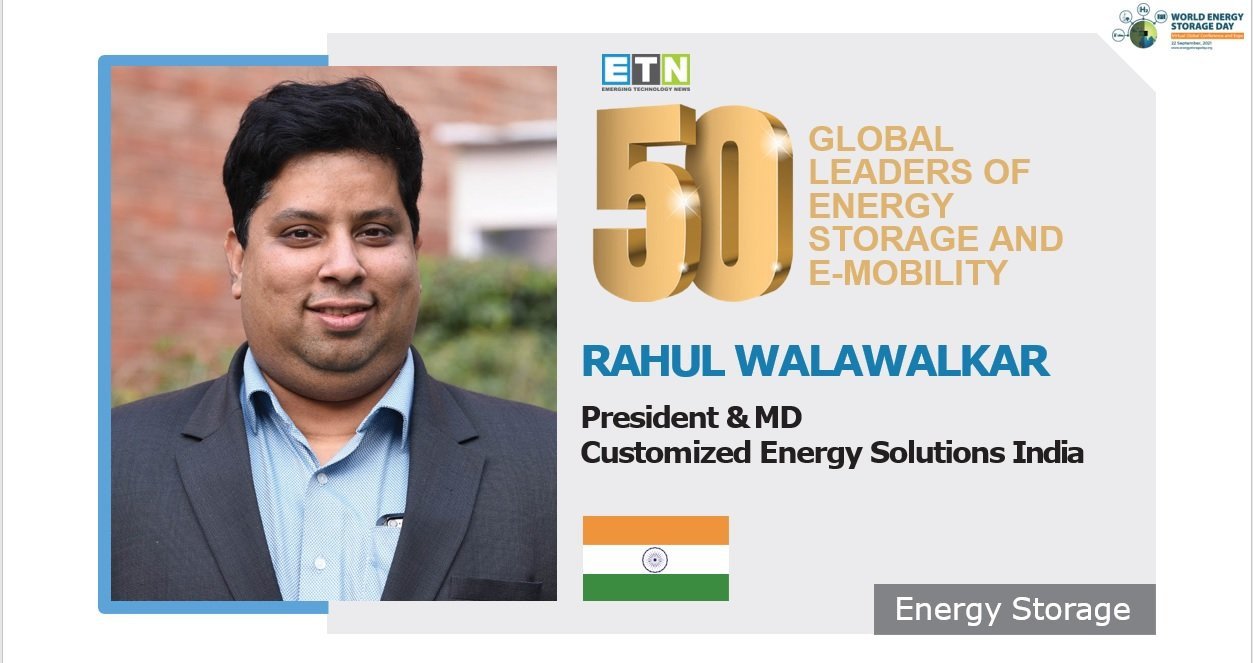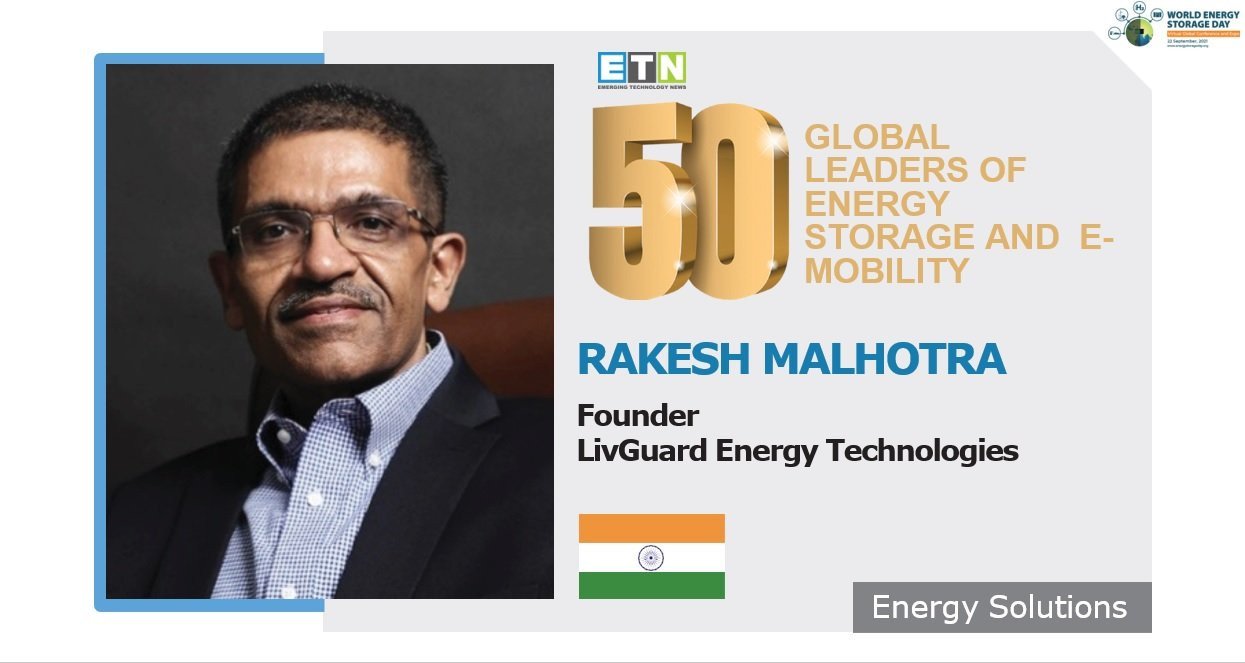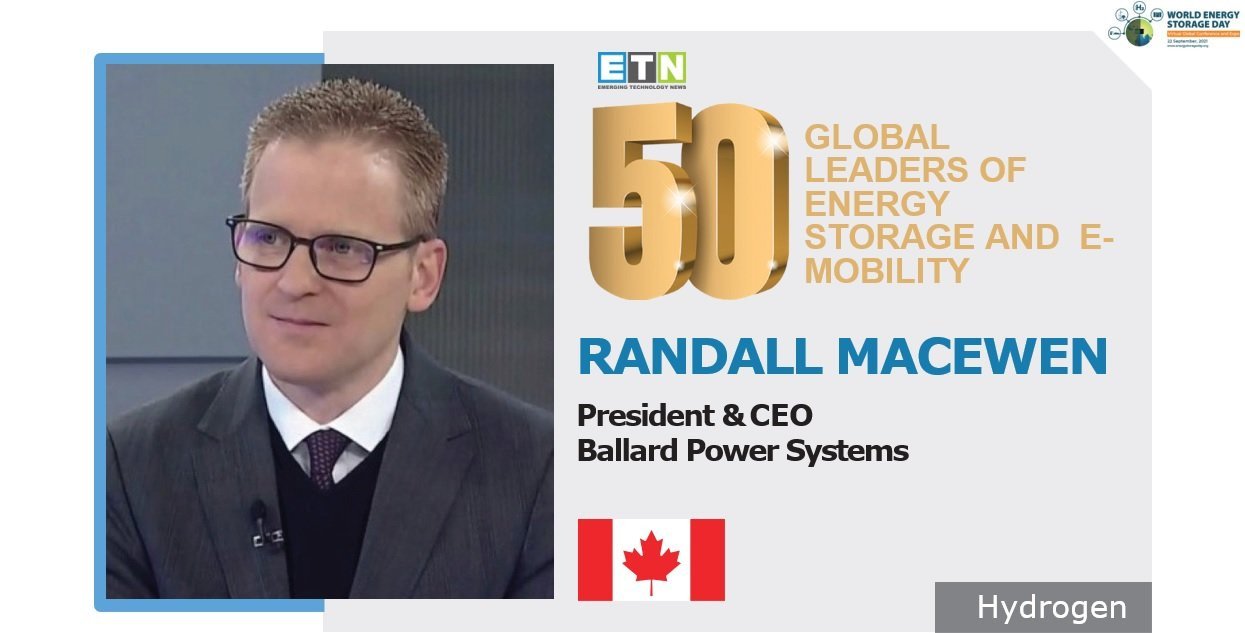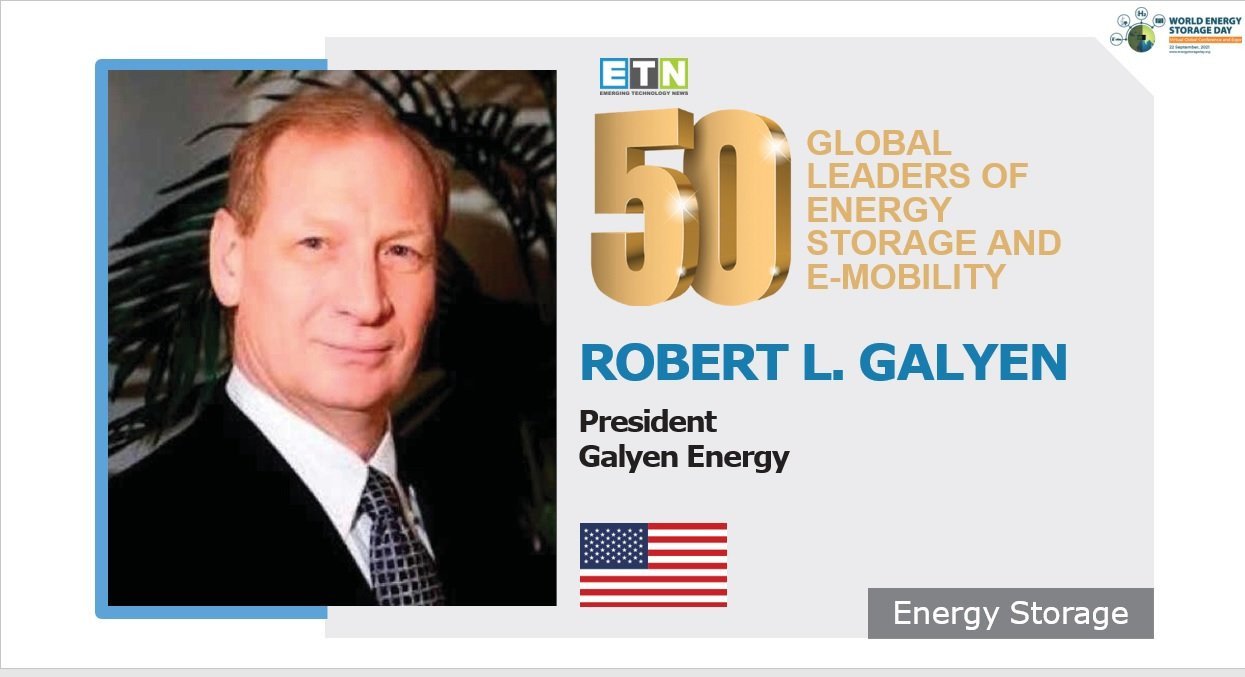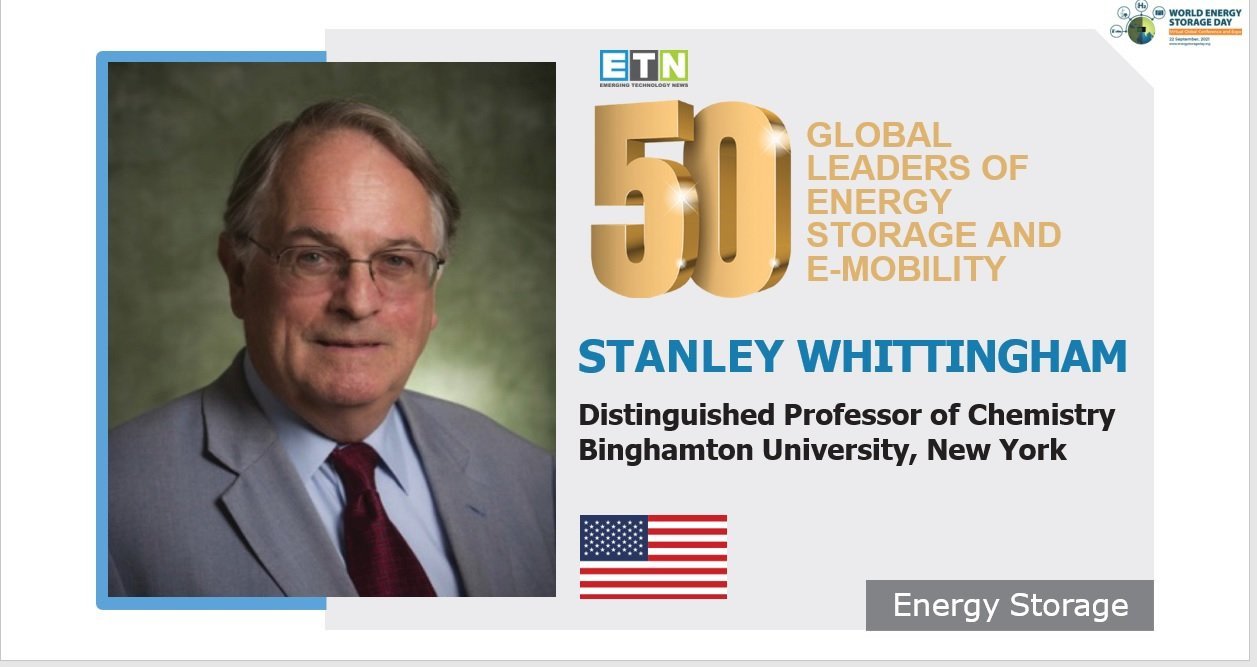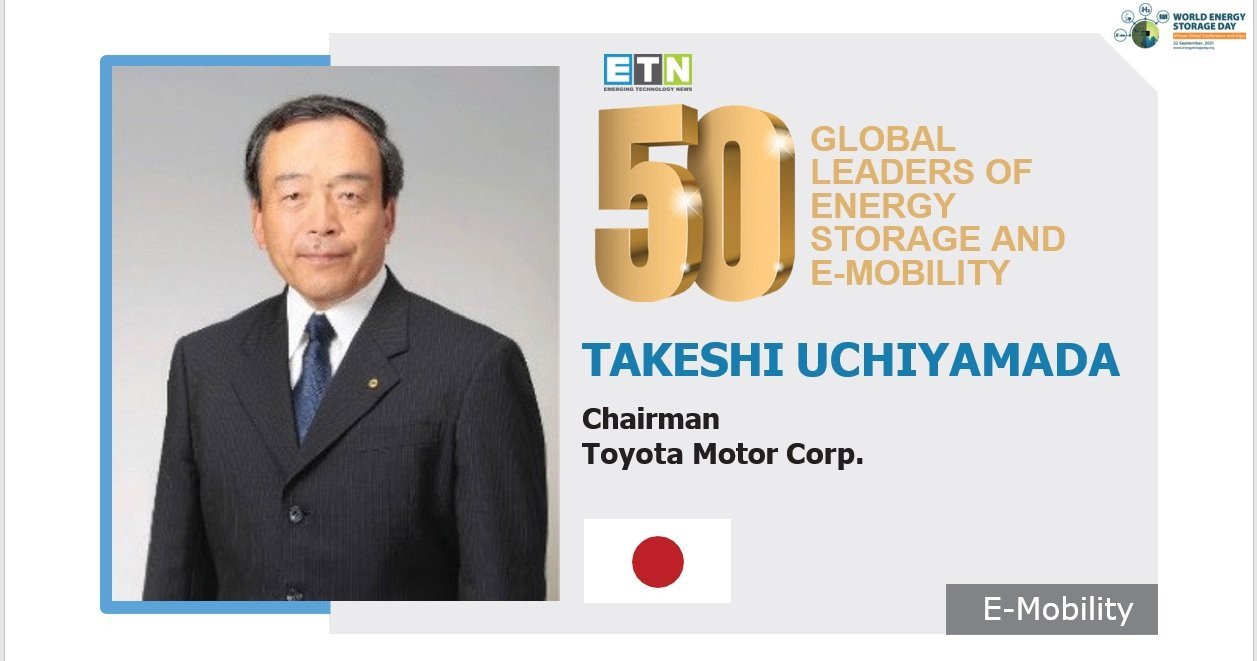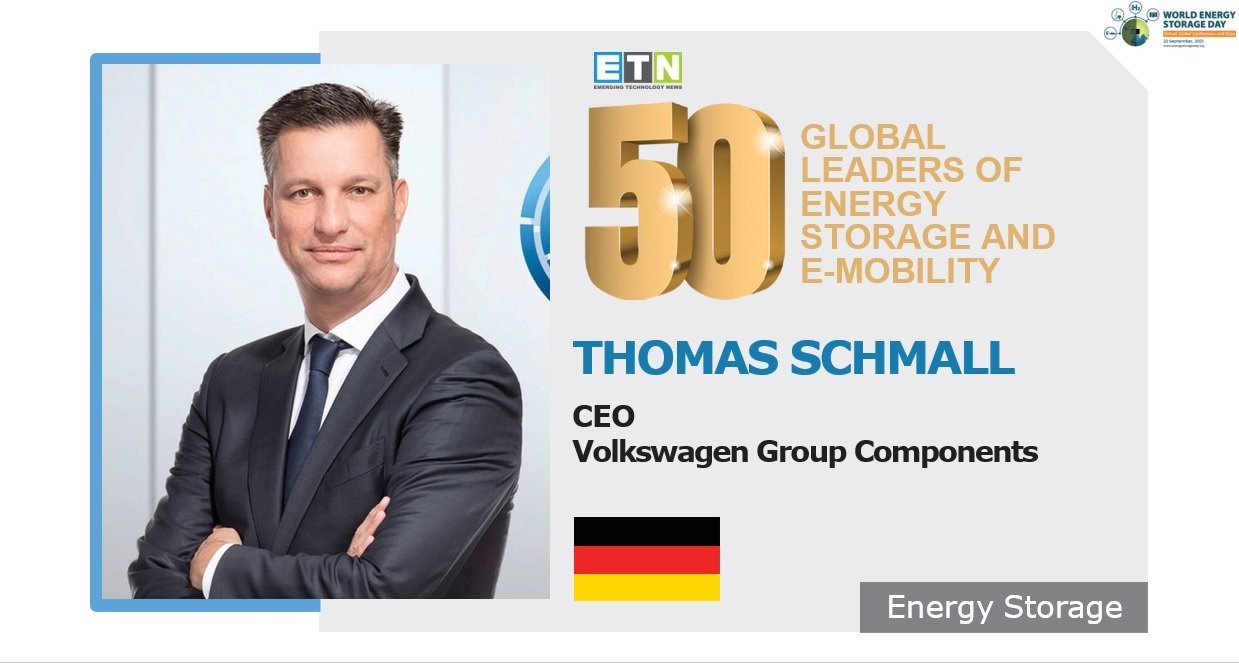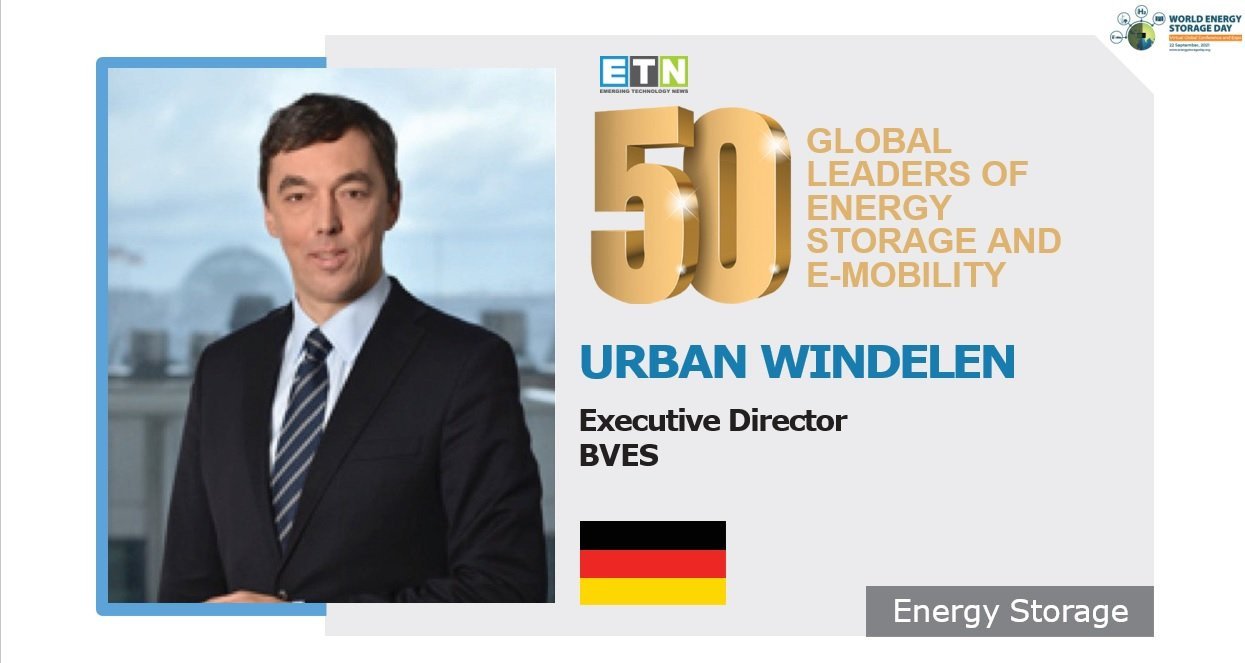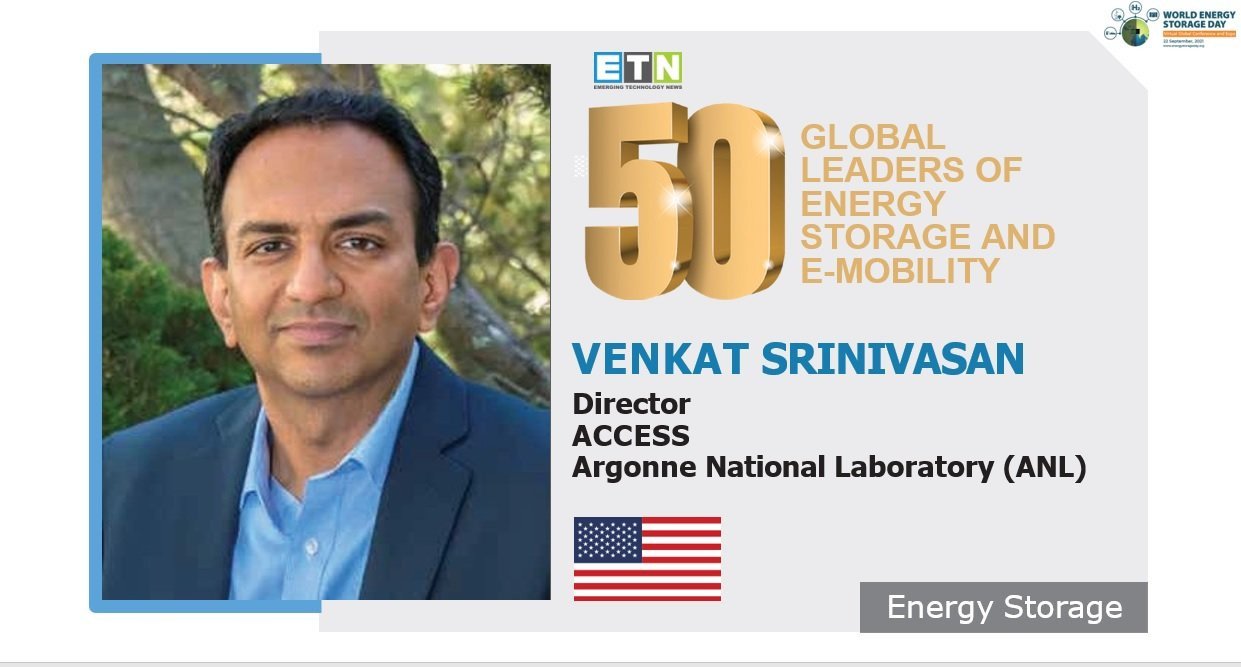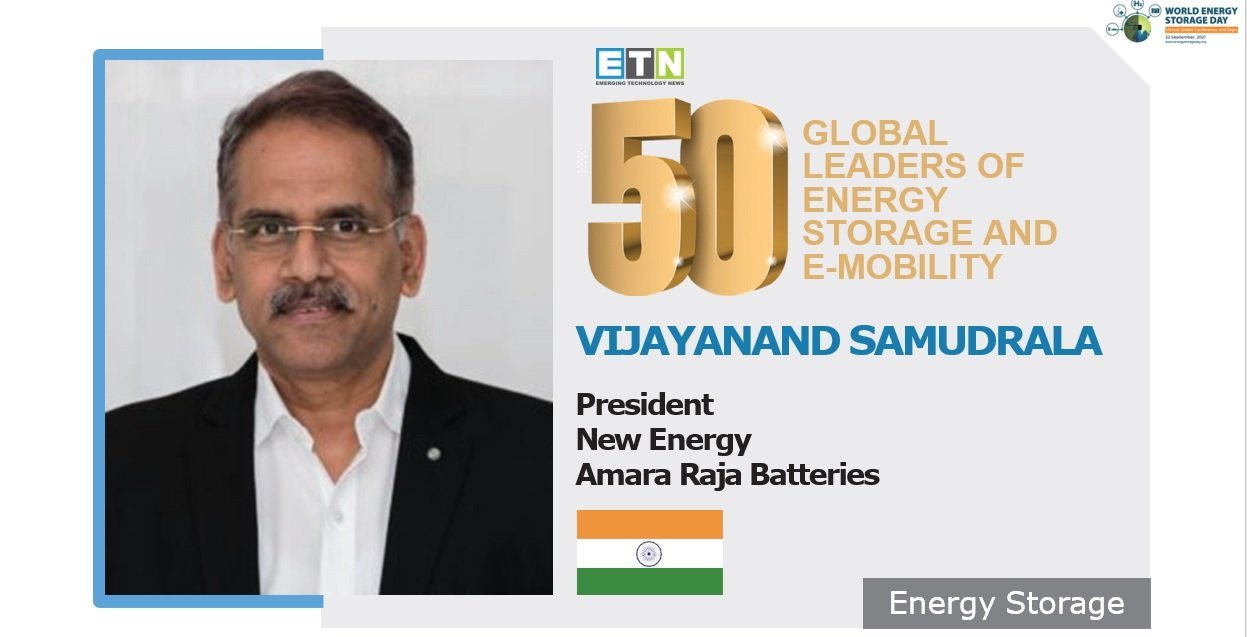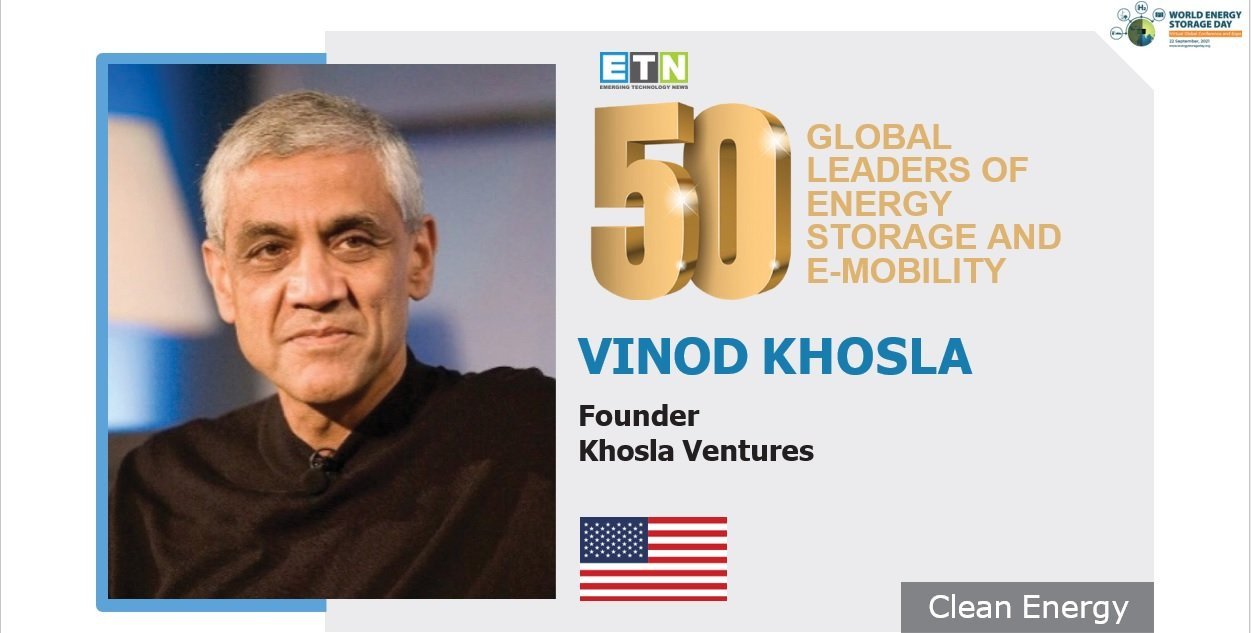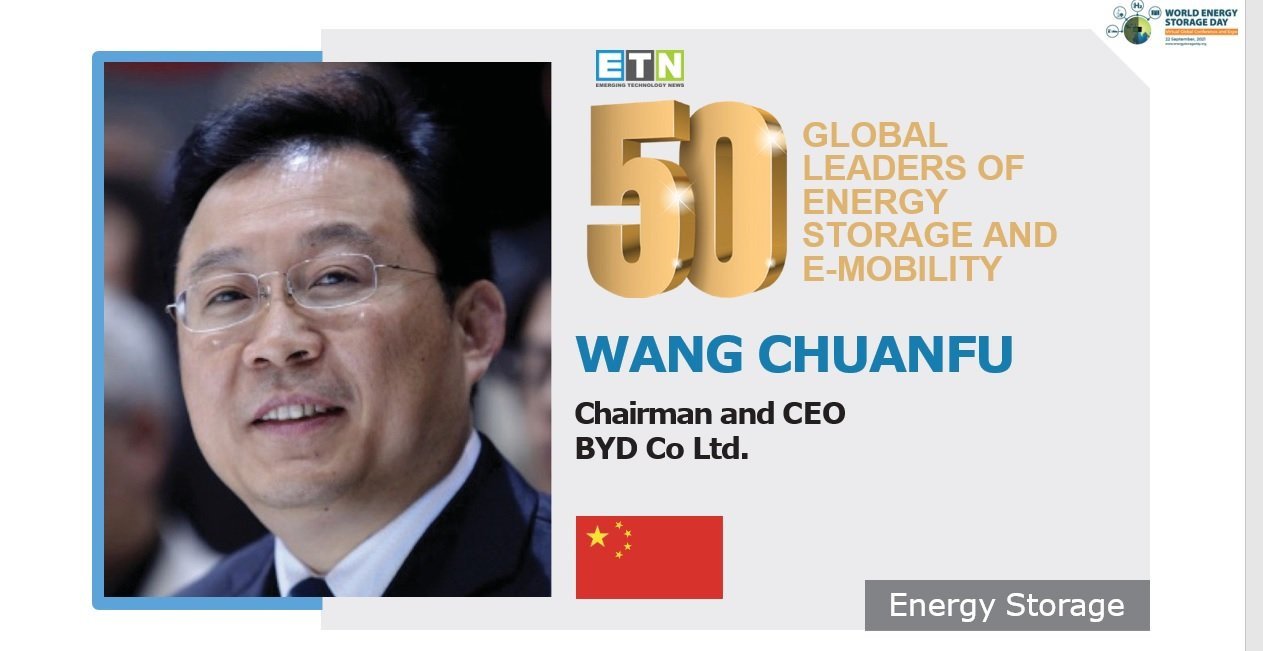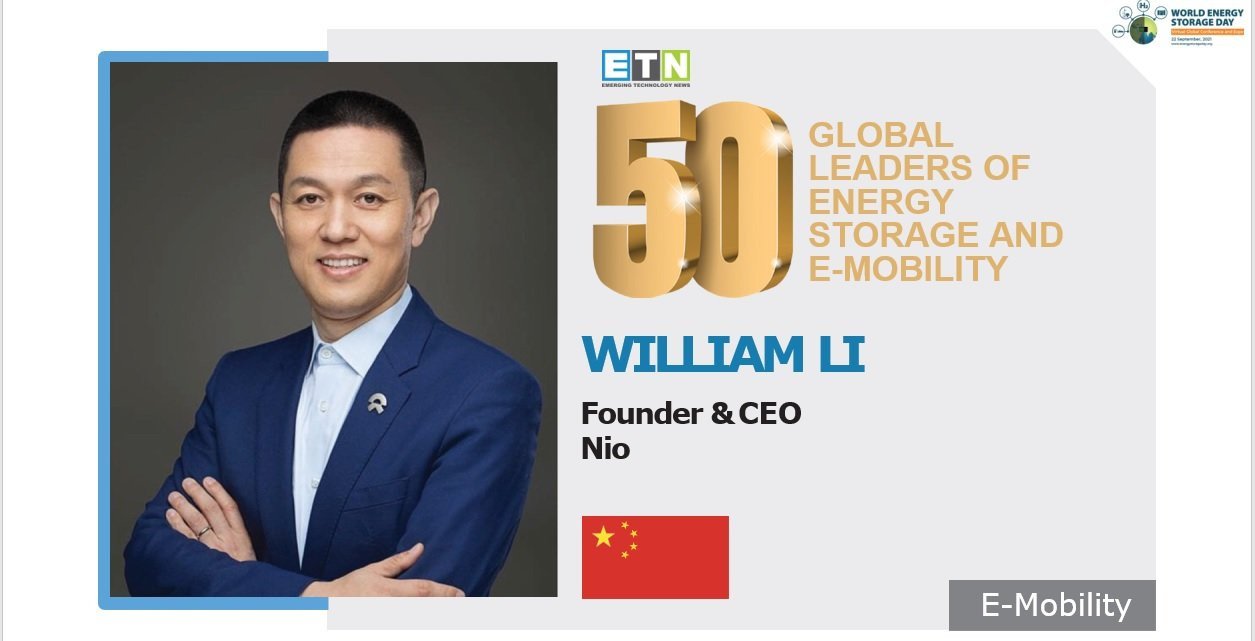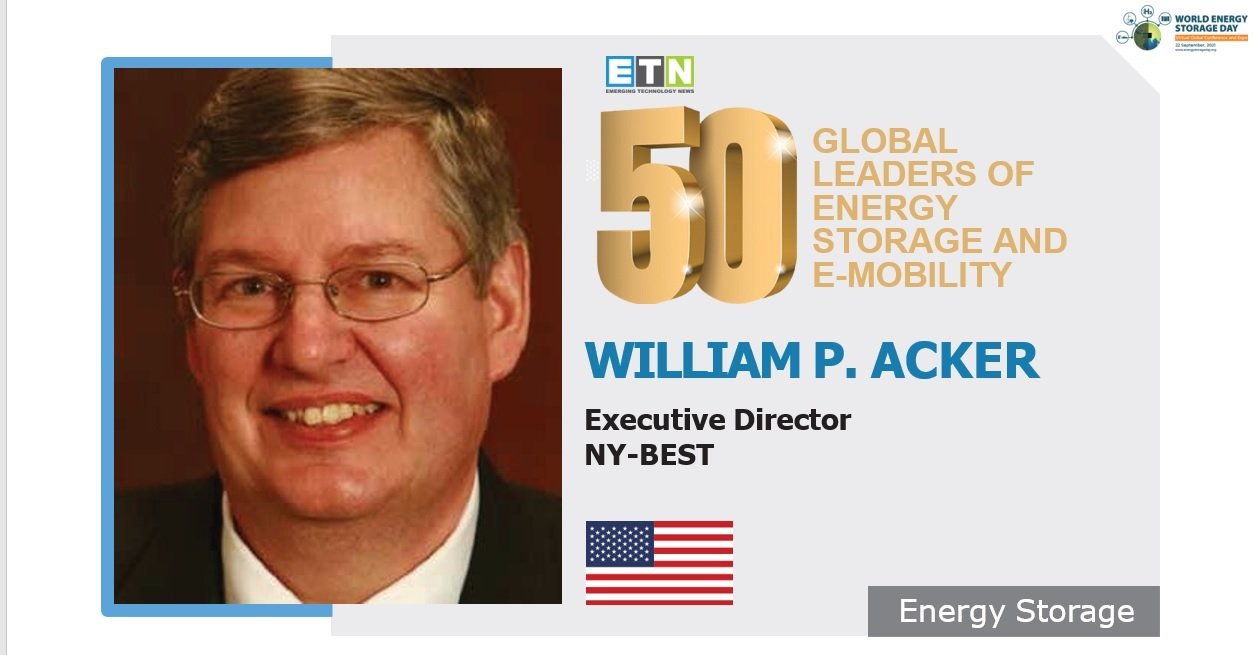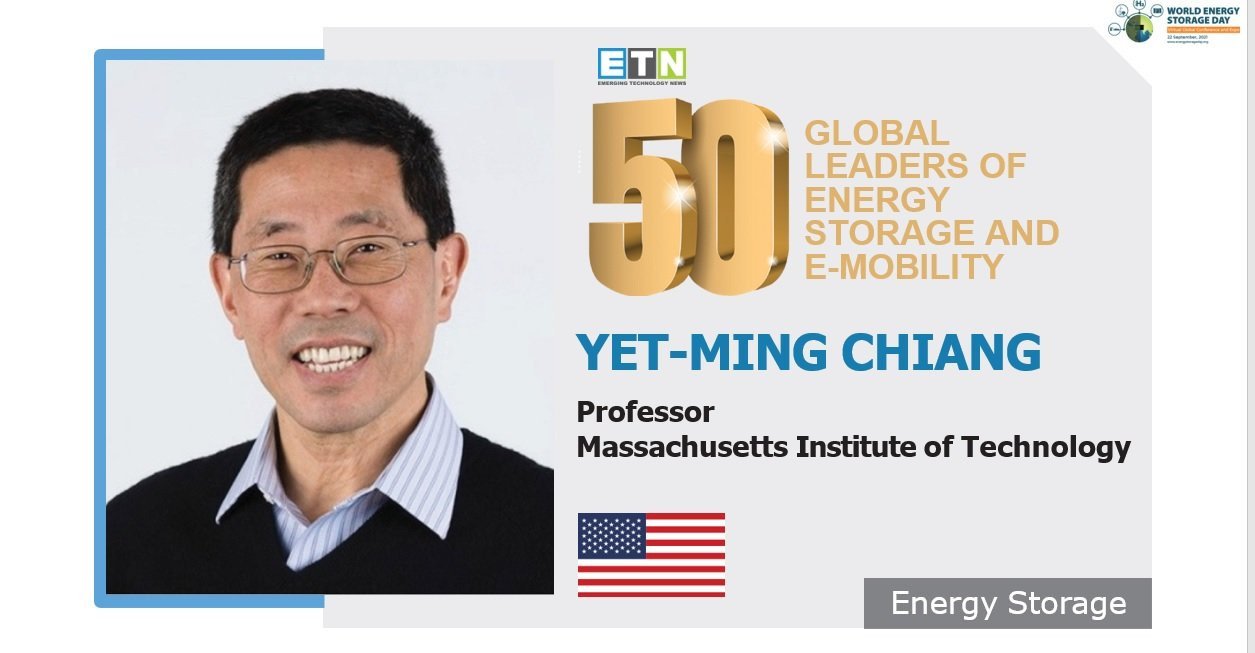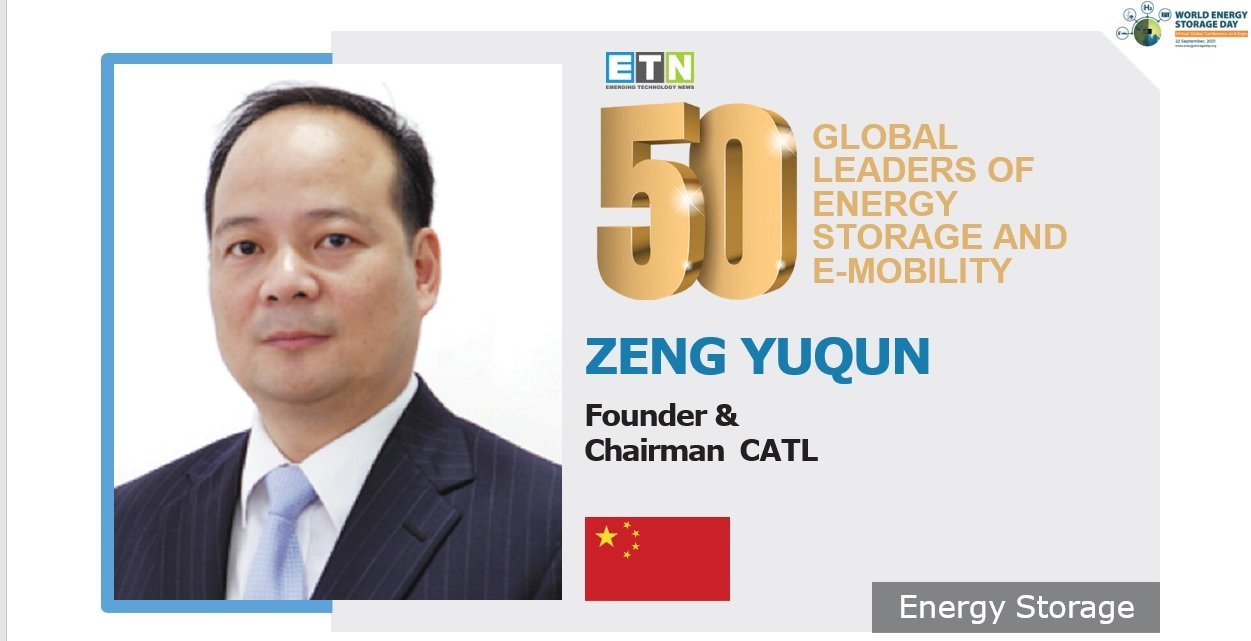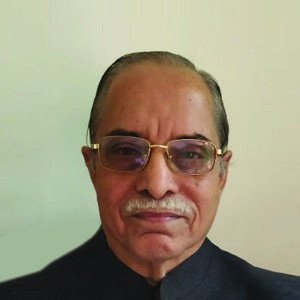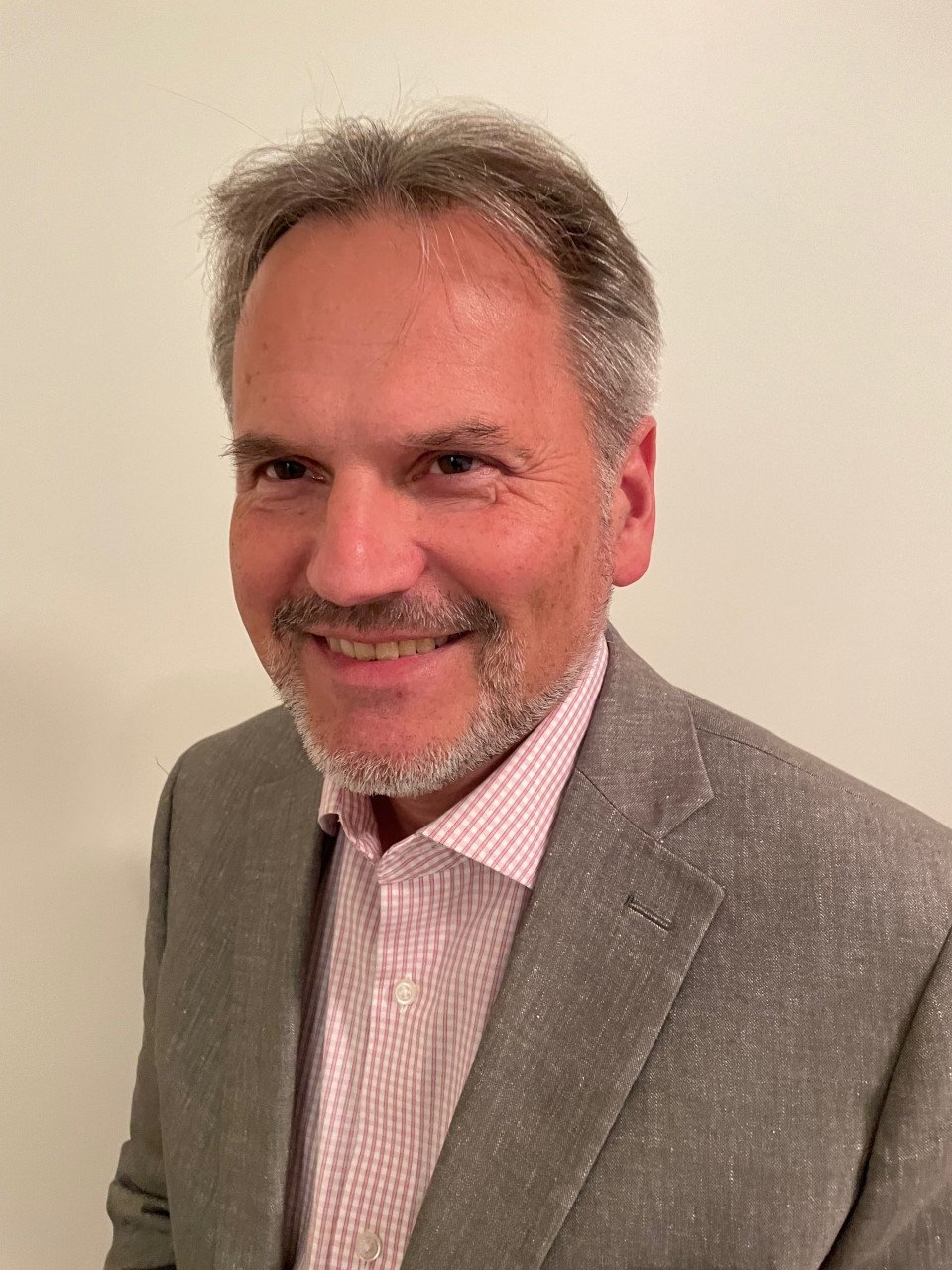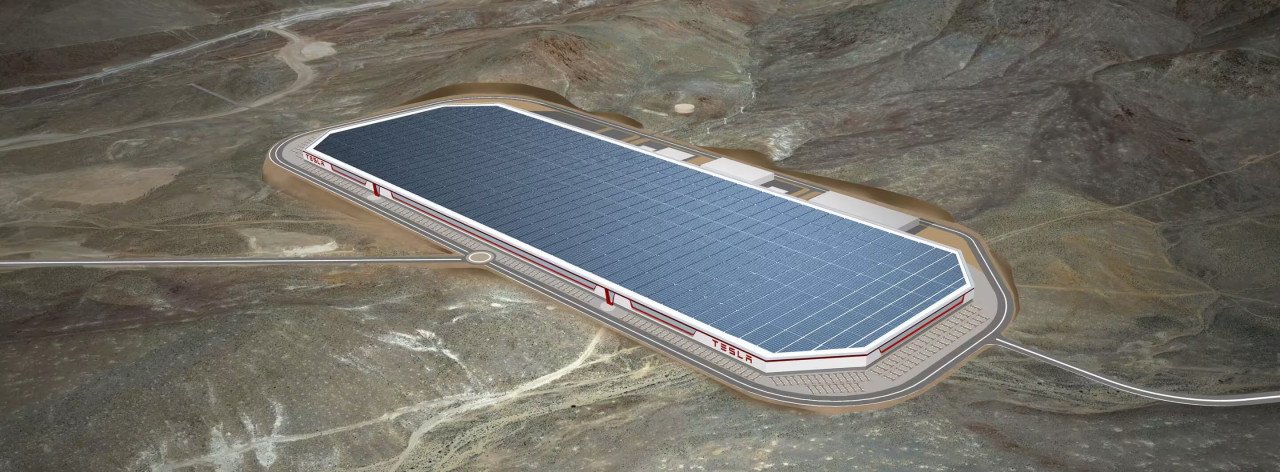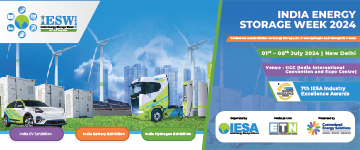ETN commemorates the World Energy Storage Day (September 22) with a special section dedicated to the visionaries and promoters of energy storage globally. Following are brief profiles of the selected leaders, whose contributions and initiatives have been defining the progress of the sector.
AKIRA YOSHINO, President Lithium-ion Battery Technology and Evaluation Center
Akira Yoshino is a fellow at the Asahi Kasei Corp and president of the Lithium-ion Battery Technology and Evaluation Center (LABTEC). Yoshino, along with American physicist John Goodenough and British-American chemist Stanley Whittingham, won the 2019 Nobel Prize for Chemistry for their contribution towards the development of Li-ion batteries.
Yoshino's curiosity in the properties of new materials, electroconductive polymers led to the development of the first safe and commercially viable Li-ion batteries that went on sale in 1991. These batteries today are widely used in electrical equipment like mobile phones and electric cars. He developed a new type of battery with a polyacetylene anode and a lithium cobalt oxide cathode, and a fine polyethylene-based porous casing that served as a separator between materials. This made the new battery stabler and safer than other rechargeable batteries available then.
After completing his bachelor's and master's studies in petrochemistry at Kyoto University, Yoshino began working at the Exploratory Research team at Asahi Chemicals (present times Asahi Kasei Corp.) in 1972, with which he has been associated throughout his non-academic career. On completing his Ph.D. at Osaka University in 2005, he headed his own laboratory at Asahi Kasei and later served as the president of the LIBTEC in 2010. Since 2017, Yoshino has held positions of distinguished professor at Meijo University and Kyushu University.
He has over 60 patents in Li-ion battery technology.
Accolades:
- 'Medal with Purple Ribbon from the Government of Japan, 2004
- Yamazaki-Teiichi Prize from the Foundation for Promotion of Material Science and Technology of Japan
- IEEE Medal for Environmental Safety Technologies in 2012
- Global Energy Prize in 2013
- Charles Stark Draper Prize for Engineering from the National Academy of Engineering, 2014
- The NIMS Award 2016 from the National Institute for Material Science
- The Japan Prize in 2018
- The 'Order of Culture' and 'Person of Cultural Merit' award in 2019
- The European Inventor Award, 2019
- The Nobel Prize in Chemistry in 2019
Lithium-ion batteries have made today's mobile IT society a reality. And in the future, they will play a central role in building a sustainable society.
AMITABH KANT, CEO, NITI Aayog
Amitabh Kant is the Chief Executive Officer (CEO) of NITI Aayog (National Institution for Transforming India), the policy think tank of the government of India.
Under his able leadership, NITI Aayog was instrumental in establishing Cabinet's formal approval to ₹18,100-crore Production Linked Incentive (PLI) scheme for manufacturers of Advanced Chemistry Cell (ACC) battery storage, for achieving manufacturing capacity of 50GWh of ACC and 5GWh of 'niche' ACC in May 2021. Mr. Kant has been integral with his efforts in NITI Aayog for formulating the National Hydrogen Energy Mission (NHEM) which was officially declared by PM Narendra Modi on August 15, 2021.
A 1980-batch IAS officer of Kerala cadre, Mr. Kant has a career spanning nearly four decades. Before his appointment at the Niti Aayog, was Secretary in the Department of Industrial Policy and Promotion, where he drove the 'Ease of Doing Business initiative. He has also worked as Chairman-Managing Director (CMD), India Tourism Development Corporation (ITDC); Joint Secretary, Ministry of Tourism; Secretary – Tourism, Government of Kerala; Managing Director, Kerala State Industrial Development Corporation; District Collector, Kozhikode, and Managing Director, Matsyafed. He is credited as being the driver of programs such as 'Incredible India', 'God's Own Country' and 'Startup India.'
He has also authored a book called Branding India - An Incredible Story.
Accolades:
- Economic Times Policy Change Agent of the Year award
- Bloomberg TV 'Personality of the Year' award
- One Globe Award for leadership in Transforming Governance for the 21st Century, 2016
- Sir Edmund Hillary Fellowship awarded by the Prime Minister of New Zealand
- Golden Peacock Award for Leadership in Economic Transformation, 2017
- IESA Industry Excellence Awards for "Policy Pioneer of the Year', 2020
The focus should be on solar-plus-storage technology because affordable storage technologies are the key to bringing solar energy to scale, not only in India but to the world.
ARUMUGAM MANTHIRAM, Scientist & Professor, University of Texas
Arumugam Manthiram is an American material scientist, professor, and the Cockrell Family Regents Chair in Engineering at the University of Texas at Austin. He also serves as the Director of the Texas Materials Institute at the university and as the Director of Material Science and Engineering Program.
Manthiram, along with two other associates at UT, founded TexPower in early 2019. The startup aims to commercialize the world's first cobalt-free, high-energy, drop-in cathode materials for Li-ion batteries.
At the Manthiram Lab in UT, Manthiram leads innovative material science research to develop new and affordable materials and efficient energy storage technologies. His research interest spans from advanced energy materials, rechargeable batteries, polymers, and nanotechnology to fuel cells, supercapacitors, and solid-state chemistry, and is currently focused on rechargeable batteries, fuel cells, solar cells, and supercapacitors.
Specifically, his group is engaged in developing new, low-cost, efficient materials for these clean energy technologies, novel chemical synthesis and processing approaches for nanomaterials, and a fundamental understanding of their structure-property-performance relationships.
Manthiram believes that if the efforts around the world to tackle the shortcomings of lithium-sulfur batteries become successful, they could be a game-changer by 2025. Manthiram has been awarded 10 patents and his work has been cited more than 59,000 times with an h-index of 122. He also has more than 770 journal articles to his credit.
Accolades
- ECS Battery Division Research Award, 2014
- Distinguished Alumnus Award of IIT Madras, 2015
- Billy and Claude R. Hocott Distinguished Centennial Engineering Research Award, 2016
- Da Vinci Award, 2017
- In 2019, Manthiram delivered the Nobel Lecture in Chemistry on behalf of Chemistry Laureate John B. Goodenough
- The 2021 Electrochemical Society (ECS) Battery Division Technology Award
Cobalt is the least abundant and most expensive component in battery cathodes. And we are eliminating it.
BABU CHALAMALA, Head - Energy Storage Technology and Systems Department, Sandia National Laboratories
Dr. Babu Chalamala is head of the Energy Storage Technology and Systems Department at Sandia National Laboratories. He leads a comprehensive R&D program in grid energy storage technology with a focus on the development of low-cost battery technologies, improving the safety and reliability of energy storage systems, development of lower-cost power electronics and power conversion systems, and development of computational and analytical tools for efficient utilization of energy storage assets. He also manages an active program on the deployment of new energy storage technologies through demonstration projects.
Dr.Chalamala provided leadership and made technical contributions to the development of new battery technologies and the commercialization of energy storage systems. His group has done foundational work on the safety of energy storage systems and the development of safety standards. His team developed a suite of open-source tools for analysis and optimization for energy storage for grid applications.
He also contributed to the US DOE Basic Research Needs for Next Generation Electrical Energy Storage report and the DOE Energy Storage Grand Challenge initiative. Before Sandia, he had a twenty-year industry career with contributions to energy storage technology at Monsanto Electronic Materials Company (MEMC) and Indocel Technologies.
After completing his Ph.D. in Physics from the University of North Texas, he worked at the Central Research Laboratories of Texas Instruments for two years. He then joined Motorola in 1996, initially working in flat panel display technology, and later as Manager of External Research for the Motorola Semiconductor Product Sector. He left Motorola in 2002 and started Indocel Technologies to commercialize large format lithium batteries. This was followed by a founding role in Stellarray where he developed new X-ray sources for medical irradiation products.
In 2011, he was recruited by MEMC to build up research and product development for grid storage to complement the company's solar business. Since 2015, he has been at Sandia National Laboratories overseeing laboratory-wide research in grid energy storage.
Accolades:
- IEEE 64th Holm Conference Morton Antler Lecture Award 2018
- James Eads Engineering Award, Academy of Sciences St. Louis, 2015
- Fellow, Academy of Sciences St. Louis, 2015
- Fellow, IEEE, the Institute of Electrical and Electronics Engineer, 2014
- Fellow, MEMC (Monsanto Electronic Materials Company), 2012
We are amid a major transformation in the electricity industry with a central role for energy storage in grid modernization, renewable integration, and electrification. This is an exciting time to be in energy storage.
Bill Gates, Founder, Breakthrough Energy Ventures
Breakthrough Energy was established in 2015 by Bill Gates and a coalition of private investors to support innovations to lead the world to net-zero emissions. The organization's goal is to enable energy transition across every sector in the economy by investing in visionary entrepreneurs, building companies that can have a significant impact on climate change at scale.
Breakthrough Energy is encouraging the development of new net-zero energy technologies, championing policies that enable innovation from lab to market, and bring together governments, research institutions, private companies, and investors to expand and enhance clean-energy investment.
In December 2016, Breakthrough Energy Coalition created Breakthrough Energy Ventures, an investor-led fund with more than $1 billion in committed capital—to build cutting-edge companies that will help stop climate change. Since then, the fund has been building its team and refining its investment strategy.
Breakthrough Energy's investors and Board of Members include some of the world's richest entrepreneurs, comprising Amazon founder Jeff Bezos, Virgin Group's Richard Branson, Jack Ma of Alibaba Group, and leading venture capitalists John Doerr and Vinod Khosla.
Based on an analysis of global megatrends and Breakthrough Energy's landscape of innovation, the fund has identified five initial areas of focus to guide its investments. The fund's team of leading scientists and company-building experts is reviewing investment opportunities in grid-scale storage, liquid fuels, micro-and mini-grids for Africa/India, alternative building materials, and geothermal.
Breakthrough Energy Ventures has funded several companies to kick-start its motivated ambition of energy innovation, major energy storage businesses funded include: Form Energy, Ambri Inc., Quidnet Energy, QuantumScape, Malta, and ESS Inc.
Accolades
- Time magazine named Gates one of the 100 people who most influenced the 20th century
- Made an Honorary Knight Commander of the Order of the British Empire (KBE) by Queen Elizabeth II in 2005
- Awarded the 'Placard of the Order of the Aztec Eagle' in 2006 for philanthropic work around the world in the areas of health and education
- Received the 2010 Bower Award for Business Leadership
- In 2015, Gates and his wife Melinda received the 'Padma Bhushan', India's third-highest civilian award for their social work in the country
- Barack Obama honored Bill and Melinda Gates with the Presidential Medal of Freedom for their philanthropic efforts in 2016
- Awarded France's highest national order – Commander of the Legion of Honour - for his charity efforts
As we look ahead into the next century, leaders will be those who empower others.
BILL GROSS, Chair & CEO - Idealab Studio
Bill Gross is the founder and chairman of Idealab, a business incubator focused on new ideas, and Energy Vault SA, a long-duration energy storage venture. He is also the founder CEO of Heliogen, a clean energy company.
Over the last 24 years, Idealab has created and operated more than 150 companies. The incubator has more than 45 successful IPOs and acquisitions in the areas of renewable energy, software, online advertising, Internet services, robotics, social media, and transportation, and 45 operating companies in its portfolio.
Energy Vault and Heliogen both were at Idealab. Energy Vault was formed in 2017, along with co-founders Andrea Pedretti (CTO), and Robert Piconi (CEO). The startup creates gravity and kinetic energy-based, long-duration energy storage solutions that would support in delivering reliable and sustainable electricity. The company's mission is to fast-track the pace of sustainable clean energy adoption while stimulating economic recovery to more locations and institutions around the world.
Energy Vault developed a technology, based on the principles of pumped hydro storage, that it claims can slash the cost of energy storage to a fraction of the current price and make renewable energy cost-effective all day, every day. It's a mechanical twist on the world's most common energy storage technology, pumped hydro.
In India, Energy Vault has signed up with Tata Power Company Limited, India's largest integrated power company, to deploy an initial 35MWh Energy Vault system.
Before Energy Vault, Bill founded several energy storage and solar companies, including Energy Cache, eSolar, Duron Solar, Raytracker, Thermata, and others. Gross serves on the boards of companies in the areas of renewable energy, automation, and software.
Accolades:
- In 2020, Energy Vault was Named Technology Pioneer by World Economic Forum as it offers an economic way to store energy and to deliver dispatchable power.
- Selected by Fast Company for the 11th annual list of 'Most Creative People in Business.
Reading the climate science literature, it's clear we have reached the limits of the chemical power paradigm. Now, it is time to transition to a paradigm that uses the power of physics.
CARLA PETERMAN, Executive Vice President, Corporate Affairs, Pacific Gas and Electric Company
Carla Peterman is the Executive Vice President of Corporate Affairs at Pacific Gas and Electric Company. She is currently a member of Sandia National Laboratories Energy and Federal Reserve of San Francisco, Economic Advisory Council.
Earlier (2019 – 2021), Peterman served as the Senior VP, Strategy & Regulatory Affairs at Southern California Edison - United States' largest electric utilities, where she was responsible for national and state levels of the company's regulatory affairs and energy and environmental policy, overseeing regulatory strategy and operation and environmental affairs. She is credited for leading the CPUC's adoption of an energy storage procurement framework, the first mandatory U.S. utility program for purchasing energy storage.
Before SCE, Peterman held important positions such as the Commissioner of California Energy Commission between (2011-13) where she was the lead commissioner for renewables, transportation, and natural gas. She also served as the Commissioner at the California Public Utilities Commission for six years (2013 -18). At CPUC, she led several clean-energy initiatives, including the adoption of the nation's first electric utility energy storage mandate, approval of $965 million of utility investments in EV charging infrastructure, adoption of utility energy-efficiency goals, and the continued implementation of California's Renewables Portfolio Standard.
In 2019, she was appointed as the Chair of California Catastrophic Wildfire Cost and Recover Commission by California Governor Gavin Newsom, the commission played an important role in developing recommendations that led to the passage of legislation that holds utilities accountable for reducing wildfires risk from their equipment and promoted a financially stable electric industry. She has also held advisory and consultancy positions at Amply Power Inc., and the World Bank.
In addition to her professional journey in renewable energy and energy storage, Peterman has also served as the board member of the Utility Reform Network, an organization that represents consumers before the CPUC and California Legislature. She has been involved in other important associations such as the National Association of Regulatory Utility Commissioners where she was the Chair of the board and the California Broadband Council where she is a member. She has served as the Chair of the California Plug-in Electric Vehicle Collaborative.
Accolades:
- The C3E Women in Clean Energy's Government Award in 1915 for her contribution to the clean energy sector
- Annual Achievement Award 2019, by the Power Association of Nothern California (PANC)
Our grid can accommodate more clean power than we originally thought and with smart, strategic investment in the grid we can reach 50-60 percent renewables. Clean energy technologies can do much more than we thought, especially when coupled with each other.
CHETAN MAINI, Co-founder, and Vice Chairman - SUN Mobility
Chetan Maini is the co-founder and VP of Sun Mobility Pvt. Ltd, an electric mobility solutions provider focused on developing universal energy infrastructure and services to accelerate mass electric vehicle usage. He is an Indian entrepreneur and technologist whose lifelong vision has been to create products and solutions that accelerate the adoption of clean and sustainable mobility in India and beyond.
Taking his passion for transformative mobility forward, he joined hands with Uday Khemka, promoter of SUN Group, and formed SUN Mobility in April 2017. The vision of SUN Mobility is to create a universal network of interoperable energy infrastructure to accelerate mass adoption of e-mobility.
He has served as an advisor on several government boards shaping the framework for EV policies. He has been a member of India's National Board on Electric Mobility (NBEM) formed by the Ministry of Heavy Industries and Enterprise and on the Technology Advisory Group (TAG) on Electric Mobility under the Ministry of Science and Technology, Government of India.
Maini holds more than 40 patents in battery and energy management systems in EV technologies. He is known to have contributed to the development of six electric, solar, and hybrid-electric cars in India over the last two decades.
He is better known for promoting India's first electric car Reva and for founding Reva Electric Car Company Ltd, (now Mahindra Electric Mobility Ltd). Encouraged by his father Dr. Sudarshan Kumar Maini - founder of the Maini Group (who named the car after his wife), the e-car was launched in 1999. Maini successfully disrupted the mobility sector in India and created a buzz about e-mobility. At one point, Reva went to become the world's most selling electric car, having sold in over 24 countries. In 2010, the Reva Electric Car Company was sold to Mahindra & Mahindra Ltd.
Accolades:
- 'Young Global Leader' at the World Economic Forum, 2011
- BBC Top Gear 'Man of the Year' award in 2014
- Frost & Sullivan India Start-ups – 'Visionary Innovation Leadership Award' in 2018
At the end of the day, the consumer is looking to reach his destination in half the time, in a safer manner; at half the cost, in a cleaner manner.
CHRIS SHELTON, Chief Technology Officer-AES
Chris Shelton is the Senior Vice President and Chief Product Officer at the AES Corp. He also serves as the President of AES Next - new energy business, AI, energy storage, solar energy, mobility, EE/DR.
With close to two decades of experience in technology-related development and systems architecture, Shelton has been a leader in the origination of new business efforts at AES. These efforts include the launch of a retail electricity business where he pioneered the bundling of environmental offsets with customer electricity consumption and began the first AES wind development efforts.
Under Chris' leadership, AES has continued to support the development of scalable ecosystems for the clean energy transition. These include Uplight, the leading customer action platform for utilities, and 5B, the prefab solar PV product delivering faster, higher density solar projects for customers. He was instrumental in the formation of Fluence – an AES-Seimens JV for energy storage solutions and technologies Chris is a member of the Boards of Fluence, Uplight, and 5B.
Shelton has been associated with AES for over 15 years and has served in various competencies. Previously, he was the Chief Technology Innovation Officer at AES and spearheaded the Group's energy storage business. He led the business unit with 84MW of advanced energy storage systems in operation and construction and another 500MW of projects in near-term development.
Between 2011 – 2013, Shelton served as the Chairman of the Board of the Electricity Storage Association (ESA) –National trade association in the United States for the energy storage industry.
The AES Corporation is a Fortune 200 global power company. It manages 36GW of energy capacity and provides affordable, sustainable energy to 17 countries through its diverse portfolio of distribution businesses as well as thermal and renewable generation facilities.
Accolades:
- Shelton holds several patents in battery storage, renewables integration, and electric vehicle and distributed energy resources management.
To solve the final energy GHG issue we need synthetic fuels made from hydrogen (+ nitrogen or captured carbon) - made from lots and lots of solar and wind. With a clear price on carbon, it can happen
DALE HILL, Founder – Proterra
Dale Hill is the founder of Proterra, a leading US developer and manufacturer of zero-emission, heavy-duty, battery-electric bus and related charging systems.
Earlier this year Proterra became a publicly listed company on Nasdaq. The company has raised more than $620 million in cash from the business combination with ArcLight to fund growth initiatives, including R&D and its next-generation battery program.
Hill started Proterra in 2004 in Golden, Colorado, with a single objective – to build the world's best battery-electric bus and related charging systems. Presently, with more than 1000 electric buses in more than 43 U.S. States and Canadian provinces, Proterra is reckoned as a leader in zero-emission, heavy-duty vehicles.
Over the last few years, Hill has been involved in the design and manufacture of several industry-changing transportation solutions including Tech-Weld, a welding supply company in Houston where Hill served for a decade. After which he ventured to establish the aluminum dump trailer manufacturing company, Alumatech, which reportedly witnessed initial success, capturing 7 percent of national markets in the very first year of production but later had to declare bankruptcy. Thereafter, he moved to Denver Colorado and founded TransTeq, the company that designed and manufactured CNG-Fueled Hybrid-Electric Vehicle for the Denver Regional Transit District.
Proterra introduced its first offering, the EcoRide at American Public Transportation Association's annual meeting in November 2008, and in January 2009, Proterra sold its first three e-buses to Foothill Transit in Pomona, California. The company's configurable Catalyst platform is capable of serving the full daily mileage needs of nearly every transit route on a single charge.
In a more recent development, Proterra unveiled its newest series of battery packs, the H Series, which offers a customizable energy storage system to power a wide range of heavy-duty commercial vehicles.
Hill continues to consult both nationally and internationally, and as a member of the Society of Automotive Engineers (SAE), a US-based, globally active professional association and American Welding Society, and is fondly remembered as a pioneer in clean transit solutions.
Accolades:
- Proterra was named the 2016 Gold Edison Award winner for its innovation in Electric Energy & Propulsion Systems
Never stop asking why, and never stop trying to come up with solutions
DARYL WILSON, Executive Director - Hydrogen Council
Daryl Wilson is the Executive Director of the Hydrogen Council, a global, CEO-led initiative of energy, transport, industry, and investment companies with a united and long-term vision to develop the hydrogen economy.
Launched by thirteen founding members in 2017, the Council now has 109 companies from 20+ countries around the world, bringing together a wider range of sectors along the entire hydrogen value chain.
Wilson is also one of the Directors at ESS, Inc. – manufacturers of low-cost, long-duration iron flow batteries for commercial and utility-scale energy storage applications. He served as CEO of Hydrogenics, a leading provider of advanced hydrogen solutions, for 14 years. He also served on the board of ATS Automation for 10 years and is a certified corporate director.
Apart from his contribution to Hydrogenics, Wilson is known for his proven track record of building successful organizations working at the intersection of environment and sustainability. He has more than 35 years of progressive industrial management experience in environmental technology, operations, manufacturing, human resources, product development, and organizational change developed in world-class organizations, including Dofasco, Toyota, and Zenon Environmental.
Accolades:
- Served on the Canadian National Economic Strategy Table for Clean Technology
- Elected as 2021 Fellows of the Canadian Academy of Engineering (CAE). The CAE is a national institution through which Canada's most distinguished and experienced engineers provide strategic advice on matters of critical importance to Canada.
In 2020, a long list of countries and regions announced new hydrogen strategies and committed to concrete targets and financing support for hydrogen as part of their sustainable recovery plans. In 2021, Council members will work to channel this momentum into bold action.
DONALD SADOWAY, Professor of Materials Chemistry - MIT
Donald Robert Sadoway is a world-renowned scientist and leading developer of battery technology. Currently, he is John. F. Elliott Professor of Materials Chemistry in the Department of Materials Science and Engineering at the Massachusetts Institute of Technology, USA.
A native of Ontario, Canada, Sadoway has been a professor at MIT for over 40 years. He is the author of over 150 scientific papers and has 30+ U.S. patents. He pioneered the development of MOE (molten oxide electrolysis).
The broad theme of his work focuses on making more efficient batteries with a concentration on technological challenges such as liquid metal batteries for stationary storage applications, environmentally sound electrochemical extraction of metals, and solid-polymer-electrolyte batteries for portable power applications. The primary goal of his research is to provide lightweight, inexpensive and energy-dense alternatives to fuel cells that will reduce greenhouse gas emissions while improving battery performance and lowering the cost.
His research on future batteries has resulted in the creation of a unique device known as the 'Slimcell' - a sandwich of lithium and a special type of Perspex that has the capability of providing twice as much power per kilogram as the existing Li-ion batteries. Not only can this device store a massive amount of energy per kilogram but is safe, leak-proof, and easy to manufacture. In addition to this, the device is bendable and Sadoway hopes it may have applications in cars and a variety of consumer electronics such as computers and even medical devices.
In 2010, with seed money from Bill Gates and the French energy company -Total S.A., Sadoway, David Bradwell, and Luis Ortiz co-founded Ambri, Inc. -- formerly known as the Liquid Metal Battery Corporation. Ambri focuses on commercializing the liquid metal battery technology for grid-scale energy storage.
Sadoway also co-founded Boston Metal a venture that is focused on commercializing molten oxide electrolysis for manufacturing metals – essentially producing metals with no CO2 emissions. Both these ventures were started at GroupSadoway in MIT - where he leads thousands of scientists to take forward their research ideas and innovations.
He is also the co-founder of Pure Lithium, Avanti Battery Company, and Lunar Resources.
He joined as a faculty at MIT in 1978, starting as an assistant professor in the Department of Material Science and Engineering. Since then, he has held several positions within the department.
Accolades:
- 'Most Influential Person of the Year' in 2012 by TIME magazine for path-breaking research in the field of battery science
- Norwegian Academy of Technological Sciences, elected Member 2001
- Everett Moore Baker Memorial Award for Excellence in Undergraduate Teaching, 2004
- Lightspeed Venture Partners Professional Development Award for Research on Grid-Level Energy Storage, 2009
For me, it's all about giving people technology that enhances the quality of life and does so at a competitive price point. I've been very, very strict with my team about not inventing something that's super expensive that's going to get you into the journal, but it's never going to get you into the customer's hands.
ELON MUSK, CEO -Tesla, Inc.
Elon Reeve Musk is the CEO and Product Architect of electric cars and battery products manufacturer, Tesla. A South Africa-born American visionary entrepreneur and tech investor, he is better known for his ventures that seek to revolutionize transportation both on earth and in space.
He is also the founder, CEO, and Chief Engineer of a space transportation company, SpaceX (Space Exploration Technologies Corporation), founder of an infrastructure and tunnel construction company called The Boring Company, and co-founder of a neurotechnology company, Neuralink.
In 2003, when the veteran start-up duo Martin Eberhard and Marc Tarpenning founded an electric car company called Tesla Motors, Musk provided the first significant source of funding for the venture. He backed Tesla Motors with a total of $70 million in investments and during the same time joined the company as the Chairman of the Board. Musk played an important role in Tesla Motors (later renamed Tesla Inc.) and in 2006 Tesla introduced its first all-electric sports car, the Roadster that put the all-electric automaker on the map. It achieved 349 km on a single charge — an unparalleled range for an electric car.
In 2012, Tesla stopped the production of the Roadster to focus on the Model S sedan, the world's first-ever premier all-electric sedan. In 2015, Tesla unveiled its third offering, Model X, to cater to the SUV/minivan market segment. In keeping with the promise to expand Tesla's product line to include 'affordably priced family cars,' Tesla has introduced Model 3 and Tesla Semi. Last year, Tesla launched Cybertruck a utility truck that offers more performance than a sports car, as well as the Model Y, which began customer deliveries in 2020.
Currently, Tesla operates out of four fully operational facilities—three of which are in the United States, and one is in China. Musk has announced his plan to build more Gigafactories outside the U.S. including Europe and Asia (outside China). Musk formed Tesla India Motors and Energy Private Limited for its operations in India; the company was registered in January 2021 in Bengaluru, India.
Tesla's broader objective is to not only create electric cars, but also a sustainable energy ecosystem, the company has undertaken manufacturing of three energy solutions: Powerpack, Powerwall, and Solar Roof. These products allow businesses, utilities, and homeowners to control renewable energy generation, consumption, and storage.
Musk's work has been recognized by heavyweights in the business industry and politics for his contribution and advocacy to combat climate change.
Accolades
- Global Green 2006 product design award for his design of the Tesla Roadster, presented by Mikhail Gorbachev.
- National Wildlife Federation 2008 National Conservation Achievement award for Tesla and SolarCity
- Time 100 Most Influential People in the World in 2010, 2013 and 2018
- 2014 Edison Achievement Award for his 'commitment to innovation throughout his career
- Awarded IEEE Honorary Membership in 2015
- Elected Fellow of the Royal Society (FRS) in 2018
- America's Most Innovative Leaders of 2019 by Forbes (jointly awarded with Jeff Bezos)
- Starmus Festival's Stephen Hawking Medal for Science Communication, 2019
I'm interested in things that change the world or that affect the future and wondrous, new technology where you see it, and you're like, 'Wow, how did that even happen? How is that possible?
GAUTAM CHATTERJEE, Whole-time Advisor – Exide Industries
Gautam Chatterjee is the whole-time advisor and former CEO and MD of Exide Industries. Exide is one of India's leading lead-acid battery storage and power storage providers in India, catering to both automotive and industrial applications.
In April this year, Chatterjee was appointed as a whole-time advisor to the Board of the Company for three years. Previously, Chatterjee assumed charge as the MD & CEO from 2016 till 2021 and served as the Joint MD of Exide Industries from May 2013 to May 2016 where he headed the Automotive and Submarine Batteries Business until May 2016.
He has been a member of the board as Executive Director of the company since May 13, 1996, and is known to have been instrumental in making the Haldia unit of Exide one of the leading battery manufacturing facilities in India. According to industry insiders, Chatterjee has a unique distinction of being a manufacturing person with sharp marketing acumen.
Exide Industries under the sustained leadership of Chatterjee has grown into a market leader in the battery space - with seven out of 10 cars on the road having Exide batteries. The company's strength is that it designs, manufactures, and sells a wide range of lead-acid and electric storage batteries from 2.5 Ah to 20,600Ah capacity, with the view to cover the broadest spectrum of applications.
In June 2018, Exide forayed into lithium-ion (Li-ion) battery manufacturing with an exclusive joint venture (JV) agreement with Switzerland-based Leclanche, a global energy storage solutions provider. This JV is intended to cater to the growing demand for Li-ion batteries in India's electric vehicle (EV) and grid-based applications.
In October 2019, the company entered the e-rickshaw space as a forward integration initiative. The company's first e-rickshaw model, 'Exide Neo', was launched in four markets — in West Bengal, Uttar Pradesh, the National Capital Region (NCR), and the Northeast.
The company also boasts of a best-in-class R&D facility established in 1976, a proprietary R&D Centre at Kolkata, which aims at driving consistent innovation for better processes and products. Exide's R&D center has been recognized by the Department of Scientific & Industrial Research, Ministry of Science & Technology, Government of India since April 1977.
Exide's first manufacturing unit was set up in Shamnagar, West Bengal in 1947, and has since expanded to a total of nine manufacturing factories across India, of which seven factories are dedicated to manufacturing batteries and the other two for home UPS systems. The company has a dealership network spanning five continents and 46 countries.
Accolades:
- CMA Management Excellence Awards - Corporate Leadership category, 2018
We hope this initiative (CESC-Exide 315kWh BESS) will be a foundation for more such exciting collaborations and we are bullish on the economics of lead-acid storage solutions for utility-scale use cases
GHISLAIN LESCUYER, CEO - Saft Groupe SA
Ghislain Lescuyer was appointed CEO of Saft in May 2015. Before that, he served as a member of the Saft Supervisory Board and President of the Board Strategic Committee for almost a decade. Lescuyer joined Saft from Alstom, where he was Senior Vice-President of Strategy & Development and Chief Information Officer for the Alstom Group; and before that Executive Vice-President of the Grid Products Business of Alstom/Areva Transmission & Distribution.
The Group is a leading manufacturer of nickel batteries and primary lithium batteries for the industrial infrastructure and processes, transportation, civil, and military electronics markets. Saft is also the world leader in space and defense batteries with its Li-ion technologies, which are also deployed in the energy storage, transportation, and telecommunication network markets.
Saft is a wholly-owned subsidiary of Total, a French oil, and gas giant with a $120 billion market cap. The group recently announced plans to start two Li-ion EV battery cell plants in Europe, in a joint venture with the vehicle conglomerate Groupe PSA (with Peugeot, Citroën, and Opel brands). The new company named Automotive Cells Company (ACC) will see two Giga factories built in France and Germany, with a total output of 48GWh annually by 2030. Lescuyer will act as chairman of the ACC board.
For 100 years Saft has been specializing in advanced-technology battery solutions for industry, on land, at sea, in the air, and space, in remote and harsh environments from the Arctic Circle to the Sahara Desert. The organization was awarded over €20 million worth of additional orders from Reliance Jio for lithium-ion battery systems for telecommunication networks across India where they have to perform reliably in difficult climatic conditions.
Saft has acquired 100 percent of the shares of Go Electric Inc., a leading US-based developer of distributed energy resiliency solutions for microgrids and commercial and industrial customers. It has launched Intelli-Connect, a powerful digital monitoring solution that allows battery fleet operators to remotely monitor the condition of a limitless number of nickel-technology batteries.
With the fight against climate change, and the energy transition, the role of ESS becomes even more important. Renewable energy is intermittent by its very nature, so you need storage solutions to ensure a stable and flexible power supply.
GRAHAM COOLEY, CEO - ITM Power
Graham Cooley is a hydrogen veteran and CEO of ITM Power, a major electrolyzer manufacturer based in the UK. ITM Power is the first hydrogen-related company to be listed on London Stock Market and has been developing electrolyzer equipment for more than 20 years.
Before assuming charge as the CEO in 2009, he was Business Development Manager in National Power plc where he spent 11 years in the power industry developing energy storage and generation technologies. Before joining ITM Power Graham was CEO of Sensortec Ltd, founding CEO of Metalysis Ltd, a spin-out of Cambridge University, and founding CEO of Antenova Ltd.
ITM Power manufactures integrated hydrogen energy solutions that meet the requirements for grid balancing and energy storage services and the production of clean fuel for transport, renewable heat, and chemicals. The company uses the Proton Exchange Membrane (PEM) technology that uses only electricity (renewable) and tap water to generate hydrogen gas on-site.
Graham claims that green hydrogen, which is produced by using renewable energy to split water molecules into hydrogen and oxygen inside an electrolyzer, is an entirely zero-emissions gas. He feels the 1000 MW-a-year electrolyzer factory that ITM Power is currently building, will bring down the cost of the equipment through economies of scale.
The company is also involved in the research and development of scientific and engineering projects; development and manufacture of prototype products; and sale of electrolysis equipment and hydrogen storage solutions. It also operates 13 hydrogen refueling stations.
Cooley believed electrolyzers are needed to decarbonize the power sector, as they will allow more wind and solar power to be added to the grid from projects that might otherwise be unprofitable. This is because, as more wind and solar projects are added to the grid, renewables supply will exceed demand. This will push wholesale power prices to zero and below and result in increased curtailment. But if the excess renewable energy could be sold to green-hydrogen producers, it would increase the income for wind and solar project owners. This otherwise 'curtailed' energy, when used to fuel electrolyzers, produces hydrogen at zero cost.
Earlier in June, ITM reported that it had amassed an order backlog of £154 million which Cooley mentions go to show the 'traction in the electrolyzer industry'.
The energy industry is the largest industry on the planet. And hydrogen is only beginning to scratch the surface. We haven't even started.
HAK CHEOL SHIN, CEO – LG Chem
H.C. (Hak Cheol) Shin is the Chief Executive Officer of Korea's largest chemical company, LG Chem. He was appointed as the Vice Chairman and CEO of LG Chem in late 2018 and was the first CEO from outside the company to be nominated by LG Chem since its founding in 1947.
LG Chem has been involved in developing its business areas from a wide range of petrochemical products to high-tech materials, components, and biotechnology fields such as new materials, rechargeable batteries, IT and electronic materials, and life sciences. Under his leadership, the chemical company aims to make rapid expansion in overseas production and marketing of the Li-ion battery business and other aspects of the business.
HC recently announced LG Chem's three strategies for '2050 Carbon Neutral Growth' to cope with climate change, at the World Economic Forum in January 2021. He was the only Korean business executive to be invited as a panel member for the WEF.
H.C.'s work experience spans global regions, markets, and businesses. He presently also serves as a member of the board of PSEG, an $18 billion New Jersey-based public utility company engaged in power generation and distribution for New Jersey, Pennsylvania, New York, and Maryland. He is also the Chair of the Nuclear Generation Committee and Fossil Generation Committee.
H.C. has more than three decades of experience in a career that spanned multiple roles and two continents operating global materials and components business. He began his career as a technical service supervisor with 3M Korea in 1984 and joined 3M Philippines in 1995 and later rose to become MD of the branch. In 2011, he became the Executive VP of 3M International Operations, and reportedly, the first Korean business professional to lead the 3M overseas business. In April 2017, H.C. was named the Vice-Chair and Executive VP R&D, Supply Chain, BT/IT, Business Development reporting directly to Inge Thulin, Chairman, President, and CEO of 3M.
LG Chem supplies batteries to Tesla and GM and has plans to boost its capacity to meet growing orders. It has plants in South Korea, China, Poland, and Michigan in the US.
Post his appointment as the CEO of LG Chem, Shin shared a 10-year plan for the company that outlines further growth and expansion for LG Chem. The company reached 30 trillion won ($25.4 billion) in sales in 2019 for the first time, Shin is aiming to make it 59 trillion won by 2021 – making it a global top-five company in chemicals.
Accolades:
- LG Chem wins GOLD Award in the sustainable energy field from the European Bank for Reconstruction and Development (EBRD), November 2020.
- Chem won the grand prize of the 39th Chung Jin-ki Media and Culture Awards in the science and technology category in recognition of its development of the world's first single biodegradable material, July 2021
Responding to climate change is a universal issue for all of humanity that requires the cooperation of the global economic world that cannot be put off any longer
HORACE LUKE, Chairman & CEO - Gogoro
Horace Luke is the Chairman and the CEO of Gogoro, a Taiwanese electric scooter and modular battery swapping infrastructure provider. He founded the company in 2011, and for a decade, he has been instrumental in steering the product development and corporate strategy.
The company's product offerings include a range of Gogoro Smartscooter in series 1, series 2, and series 3 categories, Gogoro Viva, Mix, and Viva XL. It also offers the Gogoro Energy Network, a battery swapping platform for faster, easier, smarter ways to power up electric vehicles across urban regions.
The broader vision of Luke is to transform urban transportation in congested cities around the globe. He emphasizes the need to utilize the latest in technological innovation and connectivity to bridge sustainable energy and urban transportation with the concept of easily accessible, hyper-connected portable power, and turn the world's most densely populated cities into smart cities.
Currently, there are 2,142 GoStations sites across Taipei's convenience stores, parking lots, and supermarkets. The hyper-efficient battery swapping platform, along with its vehicle partners makes 97 percent of all-electric scooters sold in Taiwan. The company claims that Gogoro Network manages 270,000 daily battery swaps.
Luke envisions Gogoro Energy Network and Smartscooter would catalyze more efficient, cleaner, and smarter energy choices in cities around the globe.
To that end, the company also has several strategic partnerships with Colorado-based Gates for developing carbon belts; with Maxxis, one of the leading tire companies in the world for developing performance tires; and Japanese electronics major Panasonic for developing battery cells.
In April this year, Gogoro announced a strategic partnership with the world's top two-wheel vehicle maker, Hero MotoCorp, to rollout its battery Gogoro Network battery swapping in India.
Earlier in August, Gogoro announced that they had surpassed 200 million battery swaps and reached 400,000th Gogoro Network, monthly subscribers, saving millions of kilograms of CO2 in the process.
Before founding Gogoro, Luke served as CIO at HTC, where he played an instrumental role in leading the company's transformation from a white label hardware manufacturer to one of the most desirable and innovative mobile phone brands in the world. From 2006 to 2011 at HTC, he led product strategy from concept to delivery, garnering a variety of industry awards, including the GSMA's 'Best Smartphone of the Year' in 2010 for the HTC Hero, the GSMA's 2011 Device Manufacturer of the year. He also worked at Microsoft, where he led product ideation and brand development for Xbox and a variety of other franchises.
Accolades
- The winner of the Nikkei Asian Review Award for Excellence is an electric scooter, January 2018
- The Winner of Japan's Good Design Gold Award, October 2018
- The Gogoro Network was recognized by Frost & Sullivan with the 2020 Company of the Year Award for the Global Swappable Battery Electric Scooter Market
If we are going to transform ourselves from traditional modes of transportation to this new era of transportation, I think new opportunities will surface and innovators are going to grab onto it and create new business models.
Dr. IMRE GYUK, Director of Energy Storage U.S. Department of Energy
Dr. Imre Gyuk is the Director of Energy Storage Research, Office of Electricity at the U.S. Department of Energy (DOE), where he leads the energy storage research program that funds work on a range of technologies such as advanced batteries, flywheels, super-capacitors, and compressed air energy storage.
Twenty years ago, when Dr. Gyuk took charge of the stationary energy storage program, the technology was only beginning to be explored. There were very few demonstrations and the rare industry meetings were only attended by a handful of researchers, scientists, and dreamers. Under Dr. Gyuk's leadership, the DOE program grew into a $100M a year effort while storage technology became one of the hottest topics of the electricity business. His Program includes research on materials, devices, and systems; it also funds work on power electronics, analytics, policy, and finance. He sponsored ground-breaking work on vanadium redox and other flow batteries as well as on rechargeable zinc manganese batteries.
Collaborations with Sandia National Laboratories and Pacific Northwest National Laboratories have led to numerous pioneering storage installations. His group was the first to recognize the potential of energy storage for frequency regulation and demonstrate this in a full-fledged installation.
His group also funded pioneering projects using storage for upgrade deferral of substations and combining storage and photovoltaic generation for cost-effective resiliency applications. For the past two decades, he has directed work on a wide portfolio of storage technologies for a broad spectrum of applications, partnering with states, tribes, and municipalities on numerous projects for grid-scale demonstrations.
After his bachelor's in Science from Fordham University, Gyuk did graduate work at Brown University on Superconductivity. Having received a Ph.D. in Theoretical Physics from Purdue University, he became a Research Associate at Syracuse. As an Assistant Professor, he taught Physics, Civil Engineering, and Environmental Architecture at the University of Wisconsin.
His work has led to 12 R&D 100 awards, two EPA Green Chemistry Challenge Awards, and Lifetime Achievement Awards from ESA and NAATBatt. He is internationally recognized as a leader in the energy storage field.
Accolades:
- 2009 Energy Storage Association's Philip Symons Award
- 2016 NAATBatt International's Lifetime Achievement Award
- TIBBETTS Award Winner, 2020
Long-duration energy storage is essential to help accelerate renewables deployment.
JAMES GREENBERGER, Executive Director & Founder, NAATBatt
James (Jim) Greenberger is the Executive Director and Founder of the National Alliance for Advanced Technology Batteries (NAATBatt), the North American trade association for developers, manufacturers, and users of advanced battery technology.
He formed NAATBatt in 2007 with the aim that lithium-ion batteries would one day power electric vehicles and these batteries would be made in the United States.
The Association's mission has been to promote the commercial interests of its members by accelerating the adoption of electrochemical energy storage technology in the marketplace. It currently has 162 corporate and institutional members encompassing several stakeholders of the advanced battery supply chain -- ranging from energy materials miners to battery recyclers and including start-up companies and some of the largest and most powerful corporations in the world.
Greenberger believes that advanced battery technology is the key enabler of the electricity-powered technologies that will shape human society in the 21st Century.
NAATBatt aims to promote developments in the science of, and markets for, advanced battery technology in North America; consistent with the goals of enhancing energy efficiency, reducing petroleum dependence, enabling carbon-free electricity generation, and promoting the growth of clean energy jobs in the US.
Other than NATTBatt, Greenberger holds the position of a partner at Reed Smith LLP and continues to serve residual law clients through his solo law practice - Private Equity Law Advisors. He is also the Board Member of Spiers New Technologies, International Battery Materials Association, and Braille Energy Systems.
Advanced battery technology is the key enabler of the electricity-powered technologies that will shape human society in the 21st Century.
JAMES L ROBO, Chairman & CEO - NextEra Energy
James 'Jim' Robo is chairman and CEO of NextEra Energy, Inc., a leading clean energy company. He completed the expansion of NextEra from its Florida-based utility business into an international clean energy player with about 45,900MW of generating capacity, revenues of over $19.2 billion in 2019, and about 14,800 employees throughout the U.S. and Canada.
NextEra Energy, Inc. provides sustainable energy generation and distribution services. The Company generates electricity through wind, solar, and natural gas. Through its subsidiaries, NextEra Energy also operates multiple commercial nuclear power units. It is the world's largest generator of renewable energy from the wind and sun. Its subsidiaries include Florida Power & Light, NextEra Energy Resources (NEER), NextEra Energy Partners, Gulf Power Company, and NextEra Energy Services.
Before his succession to the role of chief executive officer, he served as president and chief operating officer of NextEra Energy since 2006. Mr. Robo joined NextEra Energy as vice president of corporate development and strategy in March 2002 and became president of NextEra Energy Resources later in 2002.
Previously, Mr. Robo was president and CEO of a major division at GE Capital. He also served as chairman and CEO of GE Mexico. He is a director of J.B. Hunt Transport Services, Inc., one of the largest transportation logistics companies in North America.
Accolades:
- NextEra is ranked a Fortune 200 company and included in the S&P 100 index
- NextEra Energy has often been recognized for its efforts in sustainability, corporate responsibility, ethics and compliance, and diversity
- Ranked No. 1 in the electric and gas utility industry in Fortune's 2017 list of World's Most Admired Companies
- In 2018, Fortune ranked the company No 21 among the top 57 companies globally that Change the World
Battery storage is the holy grail of the renewables business. If we can deliver firm power to renewable customers at a cost-effective rate, you'll see renewables explode even faster than they already are.
JANICE LIN, Founder and CEO-Strategen Consulting
Janice Lin is the Founder and CEO of Strategen Consulting, a business with a mission to empower and inspire global Fortune 500 corporations, utilities, governments, project developers, and associations to accelerate grid modernization, decarbonize the planet and improve the quality of life around the world.
She brings more than two decades of experience in clean energy strategy, market development, and corporate strategy to Strategen. Through association management, Janice has distinguished herself as a leading clean energy change maker. In 2019 she launched the Green Hydrogen Coalition, an educational non-profit dedicated to transitioning to a sustainable, carbon-free energy supply with green hydrogen.
In 2014, Janice co-founded the Global Energy Storage Alliance (GESA), an international non-profit organization. Before that, in 2009, Janice co-founded the California Energy Storage Alliance (CESA). As Executive Director for ten years, she grew the organization into a leading voice for energy storage in the State and beyond with over 80 active members.
Through the Strategen Events business line, Janice co-founded and for the last seven years has chaired the annual Energy Storage North America (ESNA) conference and expo, the only mission-driven and the leading standalone grid-connected energy storage event in North America.
Janice has served on the Electricity Advisory Council of the US Department of Energy, the Board of Advisors for the Energy Policy Initiatives Center (EPIC), and the Energy Storage Committee of Joint Venture Silicon Valley. Before founding Strategen in 2005, Janice held several senior management positions with PowerLight Corporation (now SunPower Corporation.
Accolades:
- Received the 2019 Entrepreneur of the Year Cleanie Award
- The 2014 NAATBATT Market Development Award
- The ESA 2013 Phil Symons Energy Storage Award
We're going to get there. There are multiple pathways forward, of different storage solutions that can assist everything from short, duration, longer durations, and long bulk duration storage with green hydrogen, pumped hydro, compressed air, and so on.
PROF JEFF DAHN, Head of Jeff Dahn Research Group, Dalhousie University
Prof Jeff Dahn is NSERC/Tesla Canada Inc. Industrial Research Chair, Professor of Physics and Chemistry, and Head of Jeff Dahn Research Group at Dalhousie University in Nova Scotia, Canada.
He is globally recognized as a pioneer in Li-ion battery cells. He is credited for helping improve the life cycle of the cells, which eventually aided their commercialization. His recent work focuses on increasing the energy density, improving the lifetime, and lowering the cost of Li-ion batteries.He is also recognized as the co-inventor of Li [NixMnxCo1-2x] O2 0 < x < 0.5 (called NMC) class of positive electrode materials now used worldwide in Li-ion cells.
Prof Jeff Dahn signed a new partnership deal with Tesla and it will have exclusive rights to breakthroughs coming out of Dahn's lab until 2026.
Dahn is known for building strong academia-industry interaction. During his years at Simon Fraser University (1990-96), he collaborated strongly with the R&D team at NEC/Moli Energy Canada (now E-One/Moli Energy Canada). He took up the NSERC/3M Canada Industrial Research Chair in Materials for Advanced Batteries at Dalhousie University in 1996. In June 2016, Dahn began a five-year research partnership with Tesla Motors/Energy.
Accolades:
- International Battery Materials Association (IBA) Research Award in 1995, Herzberg Medal
- ECS Battery Division Research Award, Fellow of the Royal Society of Canada in 2001
- Medal for Excellence in Teaching from the Canadian Association of Physicists in 2009,
- Rio-Tinto Alcan Award from the Canadian Institute of Chemistry in 2010
- ECS Battery Division Technology Award in 2011
- Yeager Award from the International Battery Materials Association
- Inaugural Governor-General (Canada) Innovation Award in 2016.
- Over 630 publications in refereed journals and 65 separate inventions with associated issued patents and patents pending.
We have three major goals: reduce the cost of lithium-ion batteries, help improve the lifetime and improve the energy density. Everything we do addresses those three goals.
Jeffrey B Straubel, Founder & CEO - Redwood Materials
Jeffrey B. Straubel is the founder and CEO of Redwood Materials, a startup focused on advanced technology and process development for materials recycling, remanufacturing, and reuse. He is also a Board Member of QuantamScape, a Volkswagen-backed battery maker, and the President of the Straubel Foundation.
After serving 15 years at Tesla as one of the early founding members of the company and its Chief Technology Officer, he went on to establish Redwood Materials in 2017. The company's principal business is recapturing the lithium, nickel, cobalt, and other valuable components inside lithium-ion battery cells and using them to make new batteries. Straubel believes the supply chain for batteries and metals alone is going to be one of the largest industrial growth areas in the next decade as the world transitions to renewable energy and electric transportation.
Straubel predicts a process so efficient that nearly 100 percent of the valuable components of discarded batteries could be recaptured and reused. He feels recycled material will be less expensive than mining, refining, and transporting new materials, which means recapturing and reusing them will drive down the cost of batteries. That in turn will further accelerate the EV revolution by making electric cars less expensive.
In 2019, Redwood Materials launched a trial with Panasonic (Tesla's battery partner) to recycle scrap material from their batteries. The company is currently focusing on refining its recycling process on cellphone batteries before handling electric car batteries.
In 2020, Redwood Materials raised $40 million from Capricorn Investment Group (founded by Jeffrey Skoll) and Breakthrough Energy Ventures (founded by Bill Gates). The new startup is starting to emerge from stealth mode and it is already recycling scrap from Gigafactory Nevada, although not with Tesla.
Straubel was an early founding member of Tesla and formerly the company's CTO until moving to an advisory role in July 2019. He is said to have built one of the best engineering teams in the world at Tesla and among many projects, he led cell design, supply chain and led the first Gigafactory concept through the production ramp of the Model 3.
He is an inventor on over 30 patents covering most areas of Tesla's core battery, motor, and controls systems.
Accolades:
- Named #1 Innovator of 35 under 35 in 2008 by MIT Technology Review
- 'Engineer of the Year' recognition in 2009 by DesignNews
- Listed #2 on Fortune's 40 under 40 most influential business and innovation leaders, in 2015
We need to appreciate that we need to build a Gigafactory in reverse. I'm looking into the future and seeing this freight train coming at us.
JOHN GOODENOUGH, Professor, University of Texas
John Bannister Goodenough is an American scientist and professor of material science and mechanical engineering at the University of Texas at Austin.
In October 2019, Goodenough - along with M. Stanley Whittingham and Akira Yoshino - won the 2019 Nobel Prize in Chemistry for his pioneering role in developing the Li-ion batteries. He essentially built on the basic battery design invented by Whittingham and invented a new cathode that greatly stabilized the structure and improved its capacity. Combined with an anode developed by Yoshino, the resulting product was a powerful, safe battery that could be recharged hundreds of times and used to power wide-ranging consumer electronics.
In 2017, Goodenough lead a team of engineers to develop the 'glass battery', the first all-solid-state battery cells which would enable safer, faster charging, and long battery life for batteries used in mobile phones, energy storage, and electric cars. The glass battery was invented along with senior research fellow Maria H. Braga of the Cockrell School of Engineering at the University of Texas.
In 2020, Goodenough, along with several members of his lab at UT, launched a partnership with EnergyX, an energy technology company, to radically rethink the approach to energy storage.
Goodenough forayed into battery research during his decade-long career at the University of Oxford in England where he was appointed as a professor and head of the Inorganic Chemistry Laboratory. He then returned to the U.S. and joined the University of Texas at Austin; he taught at the Department of Mechanical Engineering and the Department of Electrical and Computer Engineering. He presently serves as the Virginia H. Cockrell Centennial Chair in Engineering.
Goodenough still works at the university at age 98 as of 2021, hoping to find another breakthrough in battery technology.
Accolades:
- The Nobel Prize in Chemistry in 2019 - at 97 years he became the oldest Nobel laureate in history
- National Medal of Science
- Copley Medal
- Fermi Award
- Draper Prize
- Japan Prize
- The John B Goodenough Award in materials science is named after him
You put the technology out there, and it could be used for ill or for good. And if they use it for good, I'm very happy…Technology is morally neutral.
JOHN JUNG, Founder - GridFunction
John Jung is an independent director of Elum Energy and Founder of GridFunction. He is the founder of GEMS technology, a world-leading energy management platform for optimization and integration of energy storage systems, and was the President and CEO of Greensmith Energy Management Systems. The visionary mind of John Jung has seen the dynamic nature of the storage asset and created the most sophisticated energy management system in the world.
Greensmith was acquired by Wartsila in 2017, and GEMS is currently offered in its fifth generation. This latest software platform has been used to integrate the broadest array of generation assets including solar, wind, hydro, storage, and thermal. GEMS6 has integrated 16 different batteries to date, each as per the application needs of individual projects.
The platform enables utilities, engineering procurement, and construction companies, and independent power producers to manage and monitor a single or a fleet of systems, to identify and diagnose equipment issues in real-time and increase system performance and longevity. The software can also synchronize multiple grid management applications, such as intermittency smoothing, frequency balancing, black-start, and voltage regulation.
In an interview (Forbes), John had stated that the future goal will be to integrate as many renewable resources as possible, combined with other assets that provide greater flexibility. The role for storage, he believes, would then become about the integration, flexibility, and optimization of assets both in terms of immediate grid stabilization and the longer-term levelized cost of electricity.
Before Greensmith, John spent over 20 years building high-growth, B2B technology companies and was a strategy consultant to several vertical sectors including the electric utility industry. He held C-level roles at four venture capital-backed technology companies operating globally, including a consortia-based electronic marketplace that served 21 of the 25 largest electric utilities in North America.
John also served as a senior strategy consultant for A.T. Kearney and Braxton Associates in the areas of corporate/business unit strategy, enterprise transformation, and portfolio/growth strategy.
Accolades:
- Greensmith was awarded the fastest growing energy storage company in the US, 2016
- Ranked 32 in the Deloitte Fast 500 list, 2015
- Named Bloomberg New Energy Pioneer 2015
- Named Smart Grid Pioneer 2015
Energy storage and software would be increasingly pervasive, but ultimately invisible, working in the background to integrate grid assets into networks to lower the cost and reliability of distributed electricity.
KELLY SPEAKES-BACKMAN, Principal Deputy Assistant Secretary - U.S. DOE
Kelly Speakes-Backman is the Principal Deputy Assistant Secretary for Energy Efficiency & Renewable Energy at the U.S. Department of Energy (DOE). She leads the DOE's ambitious target of creating and sustaining American leadership in the transition to a global clean energy economy. She also oversees the planning and execution of the organization's $2.8 billion portfolios of R&D, demonstration, and deployment activities.
She was also the first CEO of the U.S. Energy Storage Association, which represents 180 member organizations along the value chain from electric utilities to financiers, manufacturers, and component suppliers. She is also a board member at Northeast Energy Efficiency Partnerships (NEEP).
She led the U.S. Energy Storage Association efforts to unleash the full potential of energy storage, doing so to lower energy costs for customers, increase reliability and resiliency, and enable a modernized, more flexible electric grid.
In 2017, ESA released 35×25: A Vision for Energy Storage to have 35GW of new energy storage systems by 2025. An expanded vision for energy storage - 100×30: Enabling the Clean Power Transformation – was issued in August 2020.
The DOE recently unveiled a five-year, $200 million funding program to help national laboratories and external partners develop electric vehicle technologies such as battery and connected systems. Its National Blueprint for Lithium Batteries 2021-2030, released in June 2021, calls for public-private collaboration to build up the domestic supply network for lithium-based batteries.
Kelly Speakes-Backman has spent over 20 years working in energy and environmental issues in the public, NGO, and private sectors, including United Technologies, SunEdison, and Alliance to Save Energy. She is a former commissioner of the Maryland Public Service Commission where she also served as chair of the Board of Directors of the Regional Greenhouse Gas Initiative, co-vice chair of the NARUC Committee on Energy Resources and the Environment, and member of the EPRI Energy Efficiency and Grid Modernization Public Advisory Group.
Accolades:
- Honoured as Woman of the Year by The Cleanie Awards in 2019
- Nominated to serve as a Clean Energy Education & Empowerment (C3E) Ambassador in 2020
By bringing emerging technologies out of the laboratory and onto the factory floor, DOE's Industrial Technology Validation program moves us one step closer to commercializing the innovations that will make our clean energy future possible.
MANUEL FRANCISCO PÉREZ DUBUC, CEO, Fluence
Manuel Francisco Pérez Dubuc is the Chief Executive Officer at Fluence - an energy storage technology and service provider company born out of a joint venture of two industry powerhouse, Siemens and AES. Before this, he served as Fluence's Board of Directors since 2018.
He is known to be a strong advocate for energy storage technologies and has proven experience in developing high-growth businesses and strong partnerships in the energy industry globally.
As the CEO of Fluence, Dubuc drives the next phase of growth for the company and leads projects that help in meeting the ever-growing demand for energy storage to build an additional 3GW of projects the world over by 2022. Fluence has 150 projects with a capacity of more than 2,750 MW (awarded or delivered) in 24 countries as of September 2021.
Before Fluence, he served for over seven years at the AES Corporation in various roles, beginning with President Mexico, Central America, the Caribbean Strategic Business Unit, later joining as President South America Strategic Business Unit and SVP AES Global New Energy Solutions. During his tenure as the SVP of Global New Energy Solutions, AES he was responsible for global expansion in renewables, topping more than 2.8 GW in 2019 alone.
He has also held positions as the Chairman and CEO of Meiya Power Company based in Hong Kong, China. It is the largest independent power producer in China and South Korea and one of the largest in Asia. Between August 2007 to May 2009, he held various positions at AES, overseeing project implementations and nurturing new business opportunities in the energy and infrastructure arena in countries like the Dominican Republic and China.
The stakes are incredibly high to transform the way we power our world, adding more renewables together with energy storage to provide clean generation, flexibility, and resilience to power networks everywhere.
MARIA SKYLLAS–KAZACOS, Emeritus Professor, University of New South Wales
Maria Skyllas–Kazacos is a researcher and emeritus professor in the School of Chemical Sciences and Engineering, at the University of New South Wales (UNSW), Sydney, Australia. She is better known as one of Australia's first female chemical engineering professors. as well as for her groundbreaking work on the vanadium redox battery, which she developed at the University of New South Wales in the 80s.
What distinguishes Skyllas–Kazacos's work is that all vanadium redox flow batteries have unique configurations (unlike commercially available batteries) determined by the size of the electrolyte tanks.
With over 40 years of academic and research experience, her expertise includes vanadium redox battery, used in EVs, energy storage batteries, electrochemistry, aluminum electrolysis, conducting plastics, and conducting polymers. Her research and professional interest include metal extraction and molten salts, battery research, electrode processes, and electrode materials and membranes of electrochemical systems.
Skyllas–Kazacos worked as a post-doctorate fellowship at Bell Laboratories in the U.S. and during her time at the labs, she discovered soluble lead-ions in the charging and discharging reactions of a lead-acid battery.
Accolades:
- Invested as Grand Lady of the Byzantine Order of St Eugene of Trebizond (Australia Day, 2009)
- Recipient, Distinguished Lecturer Award, Pacific Northwest National Laboratories, Richland, US, 2009
- Co-Recipient, Light Metals Division Journal of Metals Best Paper Award, 2009
- Castner Medal, Society for the Chemical Industry, UK, 2011
- Fellow of the Academy of Technological Sciences and Engineering, 2014
It's turning out nice for Vanadium flow battery systems. Commercialization has often been hamstrung by the high cost of Vanadium extraction.
MATEO JARAMILLO, CEO & Co-Founder - Form Energy Inc.
Mateo Jaramillo is the CEO and Co-Founder of Massachusetts-based startup Form Energy Inc. working on developing breakthrough low cost, long-duration energy storage solutions that will enable the electric system to be 100 percent renewably powered.
Form Energy was founded in 2017 by Jaramillo and MIT professor and battery scientist Yet-Ming Chiang, as an energy storage startup with a focus on grid-scale iron-air batteries. In 2021, the company announced that it had completed a successful lab-scale prototype of its technology.
The company announced the first real-world pilot of its 'aqueous air' battery — a technology that can discharge 1MW of power for about 150 hours straight. The pilot is the outcome of a partnership with Great River Energy, a Minnesota-based Utility that is planning a transition to a lower-carbon power mix. The new battery will be tested through 2023 at the Utility's Cambridge Station gas plant in Minnesota.
Jaramillo believes long-duration batteries would enable the use of clean energy throughout the year, bridging gaps in renewable electricity supply that can last days or even weeks, while also playing a complementary role in intraday storage needs.
Jaramillo was formerly Vice President of Products and Programs for Tesla's stationary energy storage program, an effort that he had started. In that role, he was responsible for Tesla Energy's product line and business model definition, as well as global policy and business development.
He joined Tesla in 2009 as the Director of Powertrain Business Development, serving as commercial lead and primary negotiator on over $100M in new development and $500M in production contracts signed for electric powertrain sales. He went on to start the Stationary Energy Storage unit at Tesla, launching and building the Powerwall business. He also helped launch their supercharger business.
Accolades:
- Recipient of the Henry Crown Fellowship by the Aspen Global Leadership Network (AGLN), 2016
If we want to truly reach a clean energy future, we must have solutions in place to store low-cost but intermittent renewable energy over multiple days.
MIKE GRAVELY, Research Program Manager - California Energy Commission
Mike Gravely is the Deputy Division Chief of the Energy Research and Development Division at the California Energy Commission. The Division manages over $150 million annually in new energy-related research and development projects.
His efforts support the energy research and development needs of the state in a variety of areas that includes expanding energy efficiency and demand response, integrating renewables, evaluating new advanced generation systems, implementing the California Smart Grid, guiding energy-related environmental research, assessing future energy storage needs, and demonstrating energy-smart sustainable communities.
He has over 30 years of engineering and integration experience in the energy, aerospace, and communications fields. Before the Energy Commission, he has served in executive positions in the Federal Government and private industry including managing research, testing, and fielding of distributed generation and energy storage systems for the Department of Defense, addressing the challenges of a startup energy storage company and overseeing a staffing and training company that specialized in serving the utility industry.
Before his present position, he was the Manager of the Energy Systems Research Office at the Energy Commission where he managed over $200 million in active energy-related research and development projects in a variety of technical areas that include: Smart Grid, Renewable Grid Integration, Microgrid implementation, Transmission, Distribution, Demand Response, Energy Storage, Distributed Energy Resources, Carbon Capture and Sequestration (CCS), and Sustainable Communities.
Several emerging storage technologies are worth looking at that could eventually be alternatives to lithium-ion batteries. We believe they'll be able to provide a better, more affordable, and safer product, but we have to first prove that.
PASQUALE ROMANO, President & CEO - ChargePoint Inc
Pasquale Romano is the CEO and President of ChargePoint. Based in Silicon Valley, the company sells charging hardware and runs the network and the payment app for consumers who use its equipment. It operates as an open EV charging network, offering both Level 2 charging stations, which can charge an EV in less than four hours; and DC fast-charging stations, which can do so in less than 30 minutes.
The Company provides cloud-based service plans as annual subscriptions for providing tools, data, payment processing, and driver support. ChargePoint serves corporations, utilities, municipalities, shopping centers, and parking services providers worldwide.
Romano has been instrumental in opening many new ideas and paths for the company to increase revenue and expansion in foreign lands. ChargePoint has set up a comprehensive EV charging network across Europe, bringing its best charging solutions to the drivers in that region. Writing about the company's foray outside the U.S., Romano said that ChargePoint's mission is to 'transform transportation by getting everyone behind the wheel of an EV'.
He feels that charging is a key part of accelerating the adoption of EVs and that if it can be made easy to use and better, then people will start driving on electricity faster.
Romano joined ChargePoint in February of 2011, bringing more than 30 years of technology industry leadership and executive management experience to the company. He co-founded 2Wire which was acquired by Pace for $475 million in 2010. Previously, Romano held multiple positions in marketing and engineering at Polycom. In 1989, he co-founded Fluent, Inc., a digital video networking company, and served as Chief Architect until it was sold to Novell Corporation in 1993. He is also a Member of the Board of Directors at AgilOne
Accolades:
- 50 Smart Grid Pioneers of 2015 by Smart Grid Today
The future of fleets is electric, and integrating charging solutions with the many business systems already in place in today's depots, is essential to successful electrification.
PATRICK CLERENS, Secretary-General - EASE
Patrick Clerens manages the EASE (European Association for Storage of Energy) office in Brussels as Secretary-General since its establishment in September 2011. Since then, EASE supports the transition towards a sustainable, flexible, and stable energy system in Europe, and has grown from the preliminary 13 founding members to around 40. He is also the Secretary-General of the European Suppliers of Waste-to-Energy Technologies (ESWET).
He has facilitated EASE through many years of collaboration with its members from across the energy storage value chain and has helped it focus on identifying the best path towards rapid and realistic deployment of storage technologies.
In November 2016, the publication of the Clean Energy for All Europeans Package marked an important shift for the energy storage industry. The European Commission's proposed legislative and non-legislative proposals mentioned energy storage for the first time as a key element in EU energy policy.
EASE has successfully defined energy storage as a separate asset (neither generation nor consumption) and has enabled operators to own and operate energy storage within their asset portfolio.
Since 1996, Clerens worked as a consultant for a private company specializing in European Affairs in Brussels. In his capacity as Brussels Representative of different European associations, he has been involved in the climate and energy field since 2003.
Clerens is dynamically engaged in stimulating the development and deployment of innovative and cost-effective energy storage technologies. He aims to promote a fair and future-oriented energy market design that recognizes storage as an indispensable element of the energy system. He brings 20 years of experience in the climate and energy fields and is working on establishing a platform for information-sharing on energy storage technologies and applications.
The excellent 2021 storage outlook is a testament to the importance of a supportive policy and market framework for storage: the implementation of the Clean Energy Package is opening up new markets around Europe and improving the business case for storage.
RACHID YAZAMI, Founding Director & CTO - KVI Holdings, Research Director at CNRS
Dr. Rachid Yazami is a Moroccan scientist better known for his invention of the lithium graphite anode in 1979-80, which is used in the lithium batteries of most cell phones today. He is also the founder and CTO of KVI PTE Ltd., a startup in Singapore committed to battery life and safety enhancement for mobile electronics, large energy storage, and EV applications.
Yazami's latest innovation can revolutionize battery charging and turn electric cars into a viable alternative to gasoline-fueled vehicles for longer journeys. The technology can help boost green energy production and change the future of transportation. His new technology allows charging in roughly 15 minutes instead of hours. The charging technique manages to rapidly charge batteries without overheating and without reducing the lifespan of the battery.
In 1981 he developed the graphite oxide and graphite fluoride cathode materials for lithium batteries and later went on to develop metal chloride intercalated graphite materials for rechargeable lithium batteries in 1983. He followed it with two-dimensional magnetic materials studies in 1984.
Post the completion of his Ph.D., Yazami worked at the Centre National de la Recherche Scientifique (CNRS), in France's Grenoble Institute of Technology, where served as the Research Associate and Director for 33 years and rose to become Research Director at the Centre.
In 2007, he founded CFX battery, Inc. (now Contour Energy Systems), a primary and rechargeable lithium and fluoride battery startup in Azusa, California. Yazami has been a visiting associate in materials science and chemistry at Caltech for ten years, and in 2010, he joined the Nanyang Technological University (NTU) in Singapore as a visiting professor in materials science. His work centered around lithium batteries and the future beyond lithium battery technologies, including liquid anode alkali metal-air and fluoride-ion batteries.
In 2007, he founded CFX battery, Inc. (now Contour Energy Systems), a primary and rechargeable lithium and fluoride battery startup in Azusa, California. Yazami has been a visiting associate in materials science and chemistry at Caltech for ten years, and in 2010, he joined the Nanyang Technological University (NTU) in Singapore as a visiting professor in materials science. His work centered around lithium batteries and the future beyond lithium battery technologies, including liquid anode alkali metal-air and fluoride-ion batteries.
In his career spanning 40 years, he is listed as an inventor on more than 140 patents related to battery technology, including nano-Si- and nano-Ge-based anodes for ultra-high-rate charge lithium batteries, the lithium-carbon fluoride battery for space and medical applications, and more recently liquid anodes.
Accolades:
- Charles Stark Draper Prize for Engineering from National Academy for Engineering for work in the development of the graphite anode in 2014
- IEEE Medal for Environmental and Safety Technologies
This (technology) will be crucial for the future of electric vehicles. The new charging technique will help make electric cars not only cheaper to use in the long term but also just as convenient as gas-powered vehicles.
RAHUL WALAWALKAR, President & MD, Customized Energy Solutions India
Dr. Rahul Walawalkar is president of the India Energy Storage Alliance (IESA), India's only alliance dedicated to the advancement of advanced energy storage, microgrids, and e-mobility technologies. He is also the President and MD of Customized Energy Solutions India, where he leads the Emerging Technologies and Markets team with a focus on energy storage, renewables, demand response, and smart grid technologies.
A champion for clean energy and advanced energy storage, Walawalkar's vision is to make India a global hub for R&D, manufacturing, and adoption of advanced energy storage and EV technologies. He has been instrumental in providing inputs for demand response, energy storage, and smart grid policy to government agencies in India as well as in the U.S. He has provided inputs to several multilateral agencies such as the International Renewable Energy Agency (IRENA), International Energy Agency (IEA) and Asian Development Bank (ADB). He has served as an expert evaluator for the US Department of Energy for various smart grid and energy storage demonstration projects in the US during 2009-12.
In 2012, Maharashtra Electricity Regulatory Commission (MERC) nominated Walawalkar as chairperson of the working group on integrating renewable energy sources, microgrids, and energy storage as part of the Smart Grid Coordination Committee. In June 2013, he was also nominated as a member of the national task force for the integration of electricity from renewable energy sources in the grid during the 12th Plan by the Central Electricity Authority and Ministry of Power, Government of India. In May 2014, the Ministry of New and Renewable Energy (MNRE) nominated him on the standing committee for energy storage and hybrids.
He has served as a board member for Energy Storage Association USA, during 2009-15, and currently serves as Chair for Global Energy Storage Alliance (GESA).
Accolades:
- Global Young Entrepreneur Excellence Award 2020 from the 11th World Renewable Energy Technology Congress & Expo (WRETC)
Through the right policy support, large-scale solar parks with 100 MW and above could easily integrate energy storage to help improve the power quality and reliability issues that the grid can face with the rapid integration of solar energy.
RAKESH MALHOTRA, Founder - LivGuard Energy Technologies
Rakesh Malhotra founded LivGuard Energy Technologies Pvt Ltd, a company that has established itself as a strong player in the energy solution space in India and as one of the fastest-growing global brands.
Founded in 2014, LivGuard provides power generation equipment. The Company offers automotive batteries, inverters, stabilizers, and residential solar solutions. The brand operates under the SAR Group, which had earlier sold its power backup solutions brand Luminous to French engineering company Schneider Electric in 2013.
Ncubate Capital Partners, the private investment arm of SAR Group, is exploring the renewable space, looking for projects and technologies around storage, e-vehicles, and data analytics. Three out of 14 start-ups funded by Ncubate since 2012 operate in the renewable energy storage and e-vehicle space. Malhotra believes that while utility-scale projects may rely on storage technologies that have been developed outside India, rooftop solar and micro-grids innovations could come from within India.
Malhotra has a robust zeal for brilliant ideas and is blessed with entrepreneurial acumen and laser-sharp focus. He aims to be a global leader in energy storage products driven by innovative technology and excellence in manufacturing and services.
Over the last 30 years, he has worked with businesses and companies from around the world in diverse areas covering power, energy storage, renewable energy, EVs, engineering services, KPO, telecommunications, and energy efficiency. He has started and invested in over 15 startup ventures over the years and is currently involved in mentoring many startups in India and Singapore.
He started his career in 1983 at NELCO (Tata Group) followed by Mitsui and Siemens. In 1985 he founded his first venture called Oak Power Systems, which sought to develop the power situation in India by designing and marketing India's first offline UPS system for PCs. Later, he started his innings with Luminous Power Technologies. Moving on towards many paths, his driving force remains his innovative spirit to add something extra to his products backed by extraordinary services.
Since 2011, he has been engaged in angel and venture investing, as a member of the Indian Angels Network. He has built businesses in clean energy, consumer products, storage energy, and in the drinking water space, apart from distribution and brand building.
Accolades:
- Lifetime Achievement Award from IESA Industry Excellence Awards 2020
Today, no renewable system is complete without adding storage and power conversions to it, that's the space where the maximum opportunity lies because that's under-served.
RANDALL MACEWEN, President & CEO - Ballard Power Systems
Randall MacEwen has been the President, CEO, and a member of the board of directors of Ballard Power Systems since October 2014. The Canada-based company is a world leader in the development, manufacture, sale, and servicing of hydrogen fuel cell power systems. Its power product markets are heavy-duty motive, portable power, material handling, and backup power.
The company is well-established with top-tier long-term customers, strategic shareholders, leading technology with strong IP, and 40 years of experience in manufacturing fuel cell products. It offers technology solutions that include engineering services and the license and sale of its intellectual property and fundamental knowledge, for a variety of fuel cell applications. Besides road vehicles, Ballard delivers fuel cells also for trains, mining trucks, marine applications, and backup power systems for critical infrastructure such as mobile towers.
Ballard is working with Siemens to develop a 200kW fuel cell engine for integration into the new Siemens Mireo train platform. It is also working with ABB on collaboration activities toward the development of megawatt-scale PEM fuel cell power systems for the marine market. In 2020, the company introduced the fuel cell industry's first commercial zero-emission module to power marine vessels ships. Its FCwaveTM fuel cell product is a 200kW modular unit that can be scaled in series up to the multi-megawatt power level.
MacEwen has held executive roles in clean energy companies for over 15 years, including in fuel cells and solar. He was the Founder and Managing Director of NextCleanTech LLC, a cleantech consulting firm, from 2009 to 2014. Before that, he served as President and CEO of Solar Integrated Technologies, a commercial rooftop solar company. In the early 2000s, he served as Executive VP - Corporate Development of Stuart Energy Systems Corporation, a leading supplier of hydrogen generation systems.
Accolades:
- Finalist for E&Y 2018 Entrepreneur of the Year Award - Canada Pacific Region
- Triumph over Adversity Award - 2008 Investor All-Star Awards in London
- Wall Street Journal 2005 Technology Innovation Award
When you make cheese you lose a lot of milk, but there's a cheese market; it's the same with hydrogen, there is a market today and there will be a much larger market in the future.
ROBERT L. GALYEN, President - Galyen Energy
Robert (Bob) Galyen is the President of Galyen Energy and the retired Chief Technical Officer of CATL. Galyen is the Chairman of the SAE International Battery Standards Steering Committee and serves as Liaison to the MVC and China Automotive Advisory Councils for SAE International.
Under Galyen's leadership, CATL grew to over 25,000 employees and secured its position as the world's largest manufacturer of Li-ion batteries. In December 2019, Galyen joined the advisory board of Tydrolyte, a company that has exclusive global rights and was established to commercialize the novel, patent-pending Tydrolyte electrolyte in lead battery and other battery applications
He held the Chairmanship of SAE International Battery Standards Steering Committee for eight years with 22 Committees reporting to him and served as a liaison to the MVC and China Automotive Advisory Councils for SAE International. He is the Chairman Emeritus and CTO of NAATBatt International, a trade association focused on the battery industry.
Galyen also serves on two non-profit organizations including the Lugar's Advisory Board for Renewable Energy at IUPUI, the Dean's Executive Advisory Council at Ball State University, and the National Fire Protection Agencies Board of Advisers.
He has worked for four decades in the battery industry and serves on the boards of multiple corporations and not-for-profit associations in the United States. In his career spanning over 40 years, Galyen has gained expansive experience in battery technology, manufacturing, and business operations of small (Tawas, Indy Power Systems, World Energy Labs) and large (ATL, CATL, Magna, Delphi, General Motors) corporations. In the early years of his career at Magna, Delphi, and GM, he worked on the very first EV1 program powered by lead batteries.
Accolades:
- 'Technical Standards Board Outstanding Contribution Award' by SAE International
- 'Foundation Medal' by NFPA Fire Protection Research Foundation
- 'Talent 1000 Award from the Peoples Republic of China as 'National Distinguished Expert' in 2014
- The prestigious 'Friendship Award' bestowed upon him in 2015 by the People's Republic of China
The global battery industry is experiencing tremendous growth, and I believe Tydrolyte has a unique opportunity to play a critical role in the global race to develop and commercialize new technologies that deliver less expensive and longer-lasting lead-acid batteries.
STANLEY WHITTINGHAM, Distinguished Professor of Chemistry, Binghamton University, New York
Prof. M. Stanley Whittingham is a British-born American chemist and a leading researcher credited for the discovery of Li-ion batteries. He was awarded the Nobel Prize in Chemistry 2019 for his pioneering work of developing Li-ion batteries along with John Goodenough and Akira Yoshino.
Whittingham currently serves as a distinguished professor of Chemistry at Binghamton University, the State University of New York. He also serves as a professor and director of the NorthEast Center for Chemical Energy Storage (NECCES).
In 1970, Whittingham developed an innovative cathode in a lithium battery and Goodenough built on the original design and developed the basis of modern Li-ion batteries. During those days, there was heightened interest in studying high-temperature batteries, so Whittingham started looking into mixed conductors and studying their materials during his time at Stanford University, California.
Soon thereafter, he joined ExxonMobil (then Esso) where he was hired by the company as a part of its initiative to expand the reach of energy companies. It was at Exxon's battery technology lab, that Whittingham created the rechargeable Li-ion powered battery.
In June 2014, the NECCES Energy Frontier Research Center (EFRC) at Binghamton directed by Whittingham was awarded $12.8 million, a four-year grant by the Department of Energy (DOE) with the view to fast-track scientific inventions that'll help build a 21st-century energy economy. In 2019, DOE's EFRC program gave an additional $3 million to NECCES for continuing critical research for two more years. Whittingham has led the charge of the NECCES team since 2014 and continues to work with other scientists and engineers to develop new, improved, and affordable energy storage materials, which will have greater storage capability.
Accolades:
- Conferred with Nobel Prize in Chemistry for his pioneering work of developing Li-ion battery in 2019
- Turnbull Award from the Materials Research Society in 2018
- Senior Scientist Award from the International Society for Solid State Ionics in 2017
- Award for Lifetime Contributions from the American Chemical Society in 2010
- Chancellor's Award for Excellence in Scholarship and Creative Activities, and Outstanding Research Award, the State University of New York in 2007
Raise the profile of energy storage, raise the profile of how we can have a cleaner environment and affect climate change in a positive manner
TAKESHI UCHIYAMADA, Chairman - Toyota Motor Corporation
Takeshi Uchiyamada is a Japanese business executive and Chairman of Toyota Motor Corp. He is popularly also referred to as the 'father of Prius', for leading the development of Toyota Motor's Prius hybrid car.
He was also appointed as co-chair of the Hydrogen Council in 2020, and during his term there he aims to address the pressing issue of climate change. He believes that hydrogen is changing the face of transport and is poised to do even more; from powering cars to heating homes, moving towards a hydrogen-based society.
The automotive industry veteran has been associated with Toyota for more than 50 years. With a background in applied physics, he joined Toyota Motor Corporation immediately after graduation in April 1969. He held several key positions during his time at Toyota, but he led the most notable project when he became the chief engineer responsible for the team that created the first-generation Prius―the world's first mass-produced gasoline-electric hybrid car.
An experienced vehicle engineer, Uchiyamada is reckoned as an engineer who opened the road to the future of automobiles through advanced hybrid technology. After being named to the Board of Directors in June 1998, he oversaw the Vehicle Development Center 3 and gradually rose through several key positions and ranks. In June 2001, he became the managing director and chief officer of the Overseas Customer Service Operations Center and was also appointed chief officer of the Vehicle Engineering Group in June 2003.
In June 2004, he became chief officer of the Production Control & Logistics Group, and in June 2005, he became the Executive Vice President. Uchiyamada was appointed Vice Chairman of the board of directors in June 2012, and then Chairman in June 2013. Beyond TMC, Uchiyamada serves as the Director of JTEKT Corp and Director of MITSUI and Co. Ltd.
Accolades:
- 'Medal with Blue Ribbon' by the government of Japan in 2015
Hydrogen can create significant benefits for the energy system, the environment, and the global economy. Large-scale investment in the massive deployment of hydrogen technologies will build a bridge to the future – a sustainable society.
THOMAS SCHMALL, CEO, Volkswagen Group Components
Thomas Schmall is the CEO and Chairman of the Board of Management of Volkswagen Group Components. He is also a Group Board member for Technology at Volkswagen AG.
By grouping global components activities in an independent corporate entity called Group Components, Volkswagen aims to improve efficiency and optimize investments to ensure a coordinated entry to e-mobility.
In his role as CEO, Schmall supervised the transformation of the division into a stand-alone unit, with an eye on adequate return on investment to ensure self-financing in all business areas. He is responsible for the Battery and Charging Technology Roadmap across all brands in the Group. With this roadmap, the future technologies of battery and charging have again come into focus as key areas of the Group's New Auto strategy.
The Group Components has recently opened a new laboratory for cell research and development in Germany and is scheduled to roll off the production line at the Gigafactory in Salzgitter from 2025. By 2030, the Volkswagen Group plans to operate six-cell factories in Europe together with partners with a production capacity of 240 GWh. Schmall believes that with the opening of the laboratories the company has reached a strategic milestone, and will now prepare hard to produce its cells.
He has also been instrumental in Volkswagen's latest joint venture with Enel X aimed at deploying, owning, and operating more than 3,000 high-power charging points in Italy of up to 350 kW each.
Schmall joined Volkswagen Group in 1991. Following posts in industrial engineering in Wolfsburg, Mexico, and South Africa, he moved to Volkswagen do Brasil in 1999, becoming manager of the Curitiba plant a year later. He later joined Volkswagen Slovakia as a Board member for Technology in 2003, becoming Chairman of the Volkswagen Slovakia Board of Management based at the Bratislava plant two years later. In 2007 he was appointed CEO of Volkswagen do Brasil, and also held the post of Vice President of the São Paulo German-Brazilian Chamber of Commerce between 2009 and 2013 and was then as President till March 2015.
We are preparing ourselves for the approaching new era of mobility. Investments for the new electric components must be borne by our present core business.
URBAN WINDELEN, Executive Director, BVES
Urban Windelen has been executive director of the Bundesverband Energiespeicher Systeme e.V. (BVES – the German Energy Storage Systems Association) since 2015. Under his leadership, the association has grown rapidly to its current membership of over 200.
As head of the BVES, he successfully leads the work of the association for the system-oriented and market-driven development of the different energy storage technologies and the energy system. The association advocates fair political and legal framework conditions that enable the energy storage market to grow strongly.
Among Windelen's most outstanding achievements at the German and European levels:
- The recognition of energy storage as a fourth pillar of the energy system most recently in the EU Clean Energy Package and EU Green Deal
- The legal clarification after the prevention of the so-called 'NABEG' amendment that power-to-X technologies will not be charged with grid fees for power conversion
- The amendment of §61 EEG 2017 is in favor of the mixed-use of energy storage facilities at the German level so that energy storage facilities can better tap their full potential for the energy system.
- At the EU level, Windelen has done an outstanding job in enabling the introduction of a definition of energy storage for all EU member states via the EU Clean Energy Package.
- He successfully supported the focus shift to hydrogen as an energy storage medium and the possibilities for CO2 reduction with flexible sector coupling within the EU hydrogen strategy.
- He has given the users of energy storage systems from trade and industry a loud voice in the European Industrial Strategy
- He successfully advocated the strengthening of prosumers in the EU Clean Energy Package.
German energy law is closely interwoven with EU law and thanks to the legal and energy policy expertise of Windelen, the German energy storage industry can look back on ground-breaking successes.
The decarbonization of the energy industry can only be successful if there is close cooperation between the technologies.
Dr. VENKAT SRINIVASAN, Director - ACCESS
Dr. Venkat Srinivasan is a renowned battery scientist and the Director of Argonne Collaborative Center for Energy Storage Science (ACCESS) at Argonne National Laboratory (ANL), a U.S. Department of Energy's multidisciplinary science and engineering center. He currently also serves as the Deputy Director of R&D at the Joint Center for Energy Storage Research (JCESR).
At ACCESS, Dr. Srinivasan and his research group work on developing continuum-based models for battery materials and combine them with experimental characterization to help design new materials, electrodes, and devices. ACCESS seeks to commercialize battery and energy storage technologies by facilitating industrial coordination with Argonne's energy storage programs, and JCESR is a national program led by Argonne that focuses on next-generation energy storage research that goes beyond lithium-ion technology.
Dr. Srinivasan has more than 30 years of experience in the field of energy storage and next-generation batteries. His research focus has been on developing next-generation batteries that will find use in EVs and stationary energy storage systems. Other than research, his interests include moving technologies from lab to the market and looking for ways to develop an ecosystem focused on batteries to accelerate technology commercialization. During his time at the Lawrence National Berkely Lab (LBNL), he conceived the idea of CalCharge – a public-private partnership in energy.
He has been associated with ANL for the past eight years. Before that, he worked at the LBNL for 13-years in various capacities as a scientist, technical manager of Batteries for Advanced Transportation Technologies (BATT) Program, as the acting director of the BATT Program, and as Head of Energy Storage and Distributed Resources Department at the lab (ESDR) and the interim director of the ESDR Division.
He is also the author of a popular battery blog titled – 'This Week in Batteries'
You have to be able to take that lab innovation; you've got to be able to manufacture them; you've got to get them in the hands of, say, a car company that's going to test them and ultimately qualify them and then integrates them into the vehicle.
VIJAYANAND SAMUDRALA, President - New Energy, Amara Raja Batteries
Vijayanand Samudrala is the President - New Energy at Amara Raja Batteries Ltd. He was earlier the CEO of Amara Raja Power Systems and now was recently appointed President of the New Energy business division to accelerate the organization's expansion drive into the emerging alternative battery chemistries.
The Amara Raja Group believes that there is a huge emerging opportunity in e-mobility, Li-ion batteries, and other solutions around batteries and storage, including charging stations, battery swapping, battery solutions for fleet management. It has repositioned itself as an energy and mobility player with the New Energy SBU, which encompasses lithium cell and battery pack, EV chargers, Energy Storage Systems, Advanced Home Energy Solutions, and related products and services.
Samudrala is an active proponent of the adoption of new and emerging technologies in the field of renewable energy and alternative battery chemistries. He also holds the position of Chairman - Battery Society of India, National Council member in Confederation of Indian Industry, and has chaired various subcommittees on electric mobility.
He began his career as Assistant Research Scientist at Hindustan Unilever, UK, in the year 1990. He joined Amara Raja Group in 1992 and has been part of the Group's growth story for well over 27 years. He has held various positions in the organization in the areas of business leadership, strategic planning, new business development initiatives, technology development, project management, etc.
Samudrala excels in negotiation, business planning, sales management, market research, and account management. He is an experienced business development professional with a Master of Technology (M.Tech.) in Chemical Engineering from IIT Bombay.
Accolades:
- Merit award winner for his contribution to the 'yellow hat / kantori startup team' by Johnson Controls, 2005
"India is at a crucial time and space in the transformative journey to e-mobility eco-system. Establishing domestic manufacturing capability in the EV battery value chain is a critical and essential enabler towards accelerated adoption of Electric Vehicle mobility in the country."
VINOD KHOSLA, Founder - Khosla Ventures
Vinod Khosla is an Indian American entrepreneur, investor, and technologist. He is the founder of Khosla Ventures, a firm focused on assisting entrepreneurs to build impactful new energy and technology companies.
Vinod Khosla is an Indian American entrepreneur, investor, and technologist. He is the founder of Khosla Ventures, a firm focused on assisting entrepreneurs to build impactful new energy and technology companies.
Khosla's goals in funding new ventures are: 'work and learn from fun and knowledgeable entrepreneurs, build impactful companies by leveraging innovation and spend time with a partnership that makes a difference.'
Khosla also co-founded the computer hardware firm Sun Microsystems in 1982 with Andy Bechtolsheim, Bill Joy, and Scott McNealy. He served as the first chairman and CEO from 1982 to 1984, when he left the company to become a venture capitalist.
In 1986, Khosla joined the venture capital firm Kleiner Perkins as a general partner. He also invested in an Indian microfinance company, SKS Microfinance, which lends small loans to poor women in rural India. Khosla is also one of the founders of TiE, The Indus Entrepreneurs.
Accolades:
- The Golden Plate Award of the American Academy of Achievement, 2000
- The EY Entrepreneur of the Year award, in the Northern California region, 2007
We're in a crisis, and there is an opportunity to reinvent our energy infrastructure; it would be a folly to waste it.
WANG CHUANFU, Chairman and CEO - BYD
Wang Chuanfu founded BYD Co Ltd in 1995 as a rechargeable battery manufacturing factory. The diversified business conglomerate headquartered in Shenzhen is now into batteries, energy storage, EV manufacturing, solar PV, rail transit, and electronics.
Today, BYD is the world's leading producer of rechargeable batteries: NiMH, Li-ion, and NCM batteries. The company has developed a new business model know as PV+storage, which has significantly reduced the cost of solar module production. BYD PV supplies products with a service life of up to 50 years and power degradation down to 0.3 percent to more than 30 countries and regions in six continents.
Wang is dedicated to creating a truly zero-emission ecosystem through electrification of fleet and commercial vehicles. BYD's commercial vehicles cover ten market segments: buses, coaches, and battery-electric taxis; logistics, construction, and sanitation vehicles; vehicles for warehousing, port, airport, and mining operations.
BYD now supplies electric trucks and buses, forklifts, and garbage trucks to all parts of the world. In April 2021, new energy vehicle leader BYD released the e-platform 3.0 for electric vehicles at the 2021 Shanghai Auto Show. In May 2021 BYD released its one-millionth electric vehicle off the production line.
Wang Chuanfu did his Master of Science at Beijing Non-Ferrous Research Institute; Bachelor of Arts/Science at the Central South Industrial University of Technology.
Accolades:
- 2020 China Top Ten Economic Figures of the Year Award
- BYD's Han EV won the 2021 iF Design Award in product design
- Lifetime Achievement at the sixth Zayed Future Energy, 2014
- The Canton Provincial Award for Individual Contribution (CPAIC), in 2011
- BYD ranked #1 of Bloomberg's and BusinessWeek's 2009 Tech 100 List
New phenomena never develop at similar rates, and the industry is changing at a pace even faster than imagined. I expect new EV sales to account for 70 percent of the Chinese market by 2030.
WILLIAM LI, Founder & CEO - NIO
William Li is the founder and CEO of Shanghai-based electric car manufacturing company Nio. He founded the company in 2014 and is one of many self-made entrepreneurs in China.
Nio has manufactured over 14,000 units of electric vehicles, and the company expects to make the number 20,000 units. Till the year 2019, the company also raised over $2.5 billion through investments. The company's manufacturing started in 2017, and the delivery of its first vehicles began in June of 2018. Its launch model was the ES8, a premium seven-seat SUV. Since then, it's added three more models to its line-up, and in April this year sold over 100,000 vehicles, making it one of the most successful EV startups.
Nio unveiled its first sedan, the ET7, in January but deliveries will only start in 2022. Nio is also expanding its production base in Hefei city. With plans to enter the European market, it launched a branch in Norway recently and plans to start selling cars in the country.
NIO set five records in its track-only EP9 for the fastest lap for an electric-powered car in the Nürburgring Nordschleife, Circuit Paul Ricard, Circuit of the Americas, and Shanghai International Circuit tracks. Along with his three startups, Li has also made some good investments. He has invested in 32 companies from the transportation sector.
William Li started his first business at the age of 21 in 1996 – it was an Internet-based startup. In 2000, together with his partners, he founded the BitAuto Internet company – it was his second project, which turned into something big and successful over time. Since 2005, he has served as a chairman of the Board of Directors and a CEO at BitAuto, till 2013 when the company was sold. In 2010, the company became public and started trading on the American Stock Exchange. He is also a co-founder of Mobike and one of its first investors but resigned from the Board of Directors in 2018.
Accolades:
- CADA Top 10 Influential People in China's automobile industry in 2008
- GQ China Entrepreneur of the Year in 2017
- China Automobile Dealers Association Person of the Year in 2017
- Top 10 Economic Personages of China in 2017
Electric vehicles still account for a very low share of the entire auto market and there is huge room for growth worldwide.
WILLIAM P. ACKER, Executive Director - NY-BEST
Dr. William P. Acker is a well-known and highly regarded scientist, business leader, and entrepreneur in the field of energy. He presently serves as the first Executive Director of the New York Battery and Energy Storage Technology Consortium (NY-BEST).
NY-BEST Consortium is a non-profit corporation established in 2010, to position New York State as a global leader in energy storage technology including applications in transportation, grid storage, and power electronics.
Under Dr. Acker's leadership, NY-BEST has grown its membership to more than 180 companies, created the BEST Test and Commercialization Center and new battery prototyping capabilities, and has performed pioneering work in advancing markets, policy, technology, and product development. He is an active and influential voice for the energy storage industry in New York State's ground-breaking Reforming the Energy Vision initiative and he is leading the industry's participation in the State's Energy Storage Roadmap initiative.
Dr. Acker's more than a 25-year long career in energy involves management and leadership roles with Optiwind, MTI, and MTI MicroFuel Cells, Plug Power, and Texaco. He serves on the Advisory Board of the Center for Future Energy Systems at RPI, the RIT Battery Prototyping Center, and the Southern Tier Clean Energy Incubator.
He is also the founder and chairman of Taconic Energy, Inc., a developer of fuel additives aimed at improving vehicle efficiency, and Optiwind, Corp., a developer of accelerated wind turbines.
NY-BEST's mission is to catalyze and grow the energy storage industry and establish New York State as a global leader.
YET-MING CHIANG, Professor - Massachusetts Institute of Technology
Dr. Yet-Ming Chiang is a Kyocera Professor in the Department of Materials Science and Engineering at the Massachusetts Institute of Technology (MIT). He has been instrumental in the development of new materials for energy storage, transfer, and power for different devices and vehicles.
He is also Co-founder and Chief Scientist at Form Energy - a company that develops long-duration grid storage solutions, and at 24M Technologies - a company that is re-inventing lithium-ion battery design and manufacturing.
In 1990, Dr. Chiang accomplished a breakthrough in Li-ion batteries that led to a new generation of batteries with exceptional power, safety, and life. He has published more than 280 scientific articles and holds more than 80 U.S. patents.
He has co-founded six companies to commercialize research from his laboratory and serves on numerous government and academic advisory committees and study panels. In 1987 he co-founded American Superconductor Corporation, which today manufactures high-temperature superconductor wire products and wind energy equipment.
Chiang brought his MIT research on nanoscale olivine cathodes to commercial impact by co-founding A123 Systems in 2001. The company pioneered a new category of rechargeable lithium-ion batteries (LFP) with improved power, safety, and life compared with previous technology.
Accolades:
- The Economist's 'Innovation Award' (Energy and the Environment category)
- Electrochemical Society's Battery Division's 'Battery Technology Award'
- the Materials Research Society's Plenary Lectureship
- R&D 100 and R&D100 Editor's Choice Awards
- The American Ceramic Society's Corporate Achievement
- The Ross Coffin Purdy, R.M. Fulrath, and F.H. Norton Awards
The ability to store energy makes our electricity more dispatchable and more reliable over longer periods of time
ZENG YUQUN, Founder & Chairman, CATL
Zeng Yuqun is the founder and chairman of Contemporary Amperex Technology (CATL), one of the world's largest suppliers of batteries for electric vehicles. Also known as Robin Zeng, he is a Chinese billionaire entrepreneur.
He founded Amperex Technology Limited (ATL), a company manufacturing lithium polymer batteries. In 2005 ATL was acquired by Japan's TDK company, where Zeng continued as President. In 2011 he started CATL - a new business that manufactures lithium-ion rechargeable batteries – and subsequently resigned from ATL.
With his efficient business skills and technical prowess, Zeng expanded his company to make it the largest global producer of rechargeable cells or plug-in vehicles. Today, CATL is the main supplier for leading automakers like Tesla, BMW, Volkswagen, and Geely.
In a bid to maintain its growth in the battery industry, CATL launched its first sodium-ion battery in July this year. Zeng believes diversified technical routes are also an important guarantee for the long-term development of the industry. The company also announced it has developed a brand-new AB battery system solution, which can realize the integration and mixed-use of sodium-ion batteries and lithium-ion batteries.
Aggressive and favorable policies by the Chinese government have made CATL one of the world's largest manufacturers of batteries for EVs. Over 2020, the shares of CATL skyrocketed by more than 150 percent at the Shenzhen Stock Exchange. Zeng ranks 41st worldwide in the Forbes real-time billionaires list.
CATL is also planning to set up a joint venture with Hong Kong and China Gas (Towngas) to install energy storage systems in industrial parks, tap the growing renewable energy demand and help the nation's decarbonization efforts.
Zeng holds a Ph.D. from the Institute of Physics at the Chinese Academy of Sciences. He is currently a member of the academic committee of the Key Laboratory for Renewable Energy, at the institute. Throughout his professional career, he has focused almost exclusively on the battery industry—designing, building, and distributing new and improved means of energy storage.
You have to be more innovative, more cost-efficient, with better performance. That's the only way to beat them (gasoline-run vehicles).
(Profiles have been collated from information available online. Preference has been given to personal social media sites and blogs, and company websites.

